#because i'm the protagonist in my story and the hero :)
Text
Boromir Lives AU: We Didn't Have a Choice
Alternate title is They're All Just Kids With PTSD, Your Honor
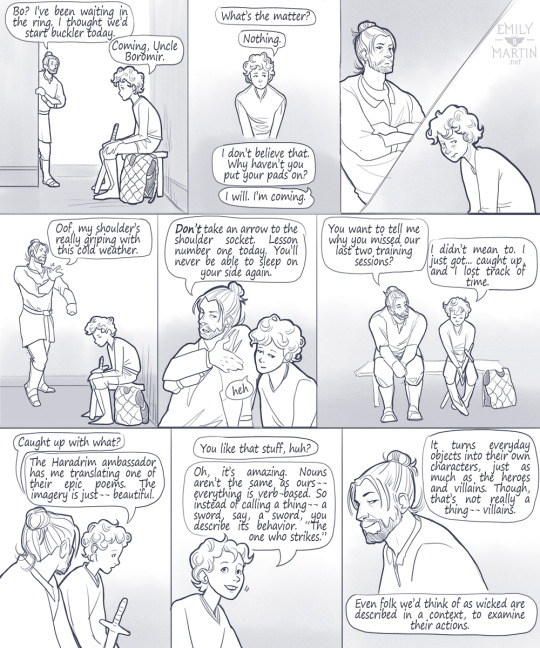
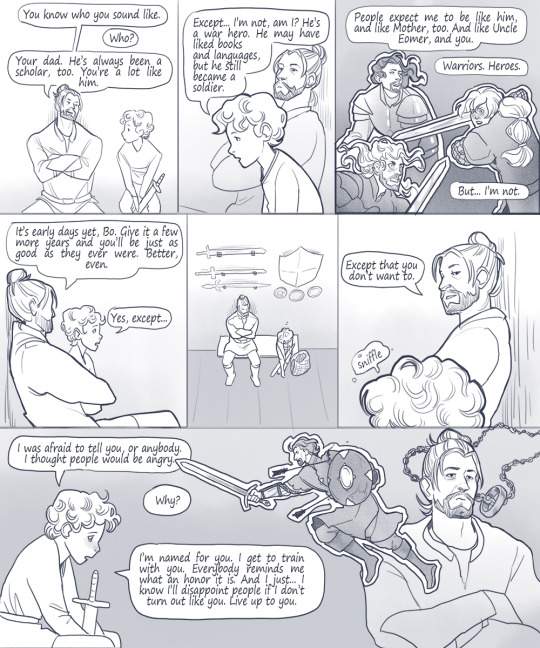

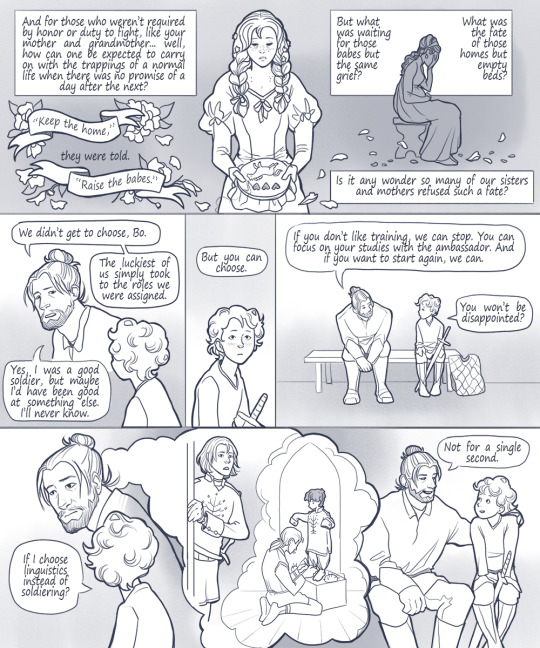
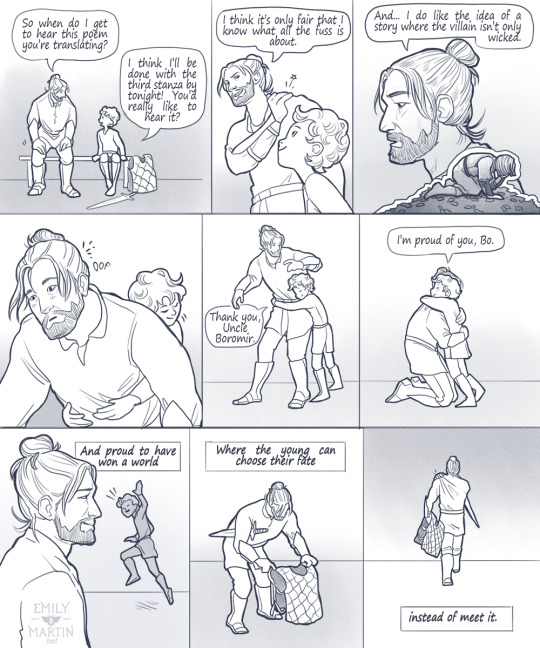
This (ridiculously long? omg why so long, I did not mean for it to be this long) comic is a good example of how my plotlines usually develop---I'll write what I think is a self-contained story and then realize there are whole new narratives beyond it. This is how my first novel, Woodwalker, became a trilogy---I was writing it as a standalone novel until about the last three or four chapters, when I realized I'd kicked off a whole new series of political events. For this AU, I was thinking about how it would feel for Elboron to grow up in the long shadow of his parents, and idolizing his uncle(s) while also wondering how he'd ever measure up. For Boromir, I think he'd be so fulfilled to see his nephew get to come of age in a gentler world that he and his brother and all the others didn't get. Though if he had a future as anything other than a soldier I'm pretty sure it would be as a TikTok star showing us how to create a perfect ballerina bun. Show us your products, Boromir, dang.
This comic also reminded me that I clearly have a distinct set of author tropes because this has STRONG Veran vibes (Sunshield, Floodpath), with a young character feeling overwhelmed with the legacies of his parents. This is a bit of an opposite arc, though--- Veran wants to follow in his mother's footsteps but isn't allowed to, and so gravitates toward diplomacy, while Elboron feels pressured to take up soldiering like his namesake but would rather study language. Come to think of it, the manuscript I turned into my agent a few weeks ago also has some of these themes, which either means I need to stop writing quest follow-ups or start a Protagonists With Heroes For Parents support group.
--------------
Boromir Lives: Helm's Deep
Boromir Lives: Whump-Time After Pelennor
Boromir Lives: GO TO SLEEP
Boromir Lives: Aragorn's Coronation
Boromir Lives: Faramir and Eowyn's Wedding
Boromir Lives: It's a BABY
Boromir Lives: High Uncle of the White Tower
Boromir Lives: The Haircuts
3K notes
·
View notes
Text
Shangri-La Frontier mid-season review
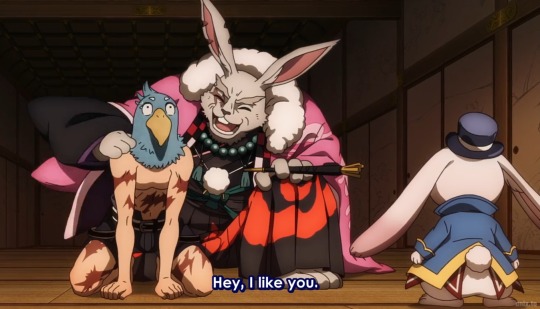
This is by far the best fake video game I've ever seen written in fiction.
Most MMO-centric isekai stories have trouble with providing accurate and realistic depictions of the complexities and minutia that give MMOs the allure they have. I've seen so much handwavey bullshit tacked onto fake-games that introduce unrealistically overlooked mechanics for reasons like giving the protag immense power just because they're the protag and the story is about them. A good example of this is another MMO Isekai airing this season, "A Playthrough of a Certain Dude's VRMMO Life", wherein the main character becomes extremely rich, powerful, and famous by episode 2 because he stumbled into a stealth archer playstyle, a build which apparently no human in that universe had ever conceived of before, and then making a fortune by selling basic potions to everyone after NPCs stopped selling them (another thing he was uniquely able to do because not a single other player had the forethought to spec into alchemy). These lesser, dime-a-dozen isekai add up to be boring fantasy strories with gaming elements clumsily put in so that the author can demonstrate how powerful the world's inhabitants are by showing their stat allocation screen instead of, say, explaining anything about what they do that's so uniquely powerful and how they figured it out. Ya know, stuff you'd hope to hear about from any competent story.
Shangri-La Frontier is a breath of fresh air for anyone who, like me, is sick of authors ignoring the things that actually make video games compelling in service of creating a stock-standard narratives in fantasy worlds because it allows them to get away with bullshit. I've always found it very convenient that many isekai narratives indulge in things like chattel slavery, because it's societally normal enough for the protag to purchase a beautiful, vulnerable girl to add to his harem (dont worry, she is always inexplicably in love with him no matter what because he's SUCH a kind master). And it never really seems to go anywhere. Because the Video Game Isekai, while an interesting premise in theory, is more often than not used exclusively as a means to simplify the structure of a world's power scaling to abide by an arbitrary set of omnipresent universal rules (e.g. what people who have never cared to look into game development think of video games). This anime, by comparison, is VERY clearly authored by someone who plays a LOT of games.
Every piece of logic used to drive the plot forward, so far, is congruent to a real-world example of video game conventions, and I'm not just talking about levelling up and selling monster parts. Story elements that I've rarely (if ever) seen explored in other isekai are ever-present and genuinely clever and amusingly introduced. My favorite example of this so far has been the way the protagonist has been able to go head to head with so many overlevelled foes in the first 9 episodes. The story of course makes note of how good of a gamer Sanraku (our hero) is, but much like in real life games, being super duper good at dodging attacks doesn't really make up for a 70 level gap in items and learned skills. For that reason, he gets his ass whooped more often than he actually outsmarts others (so far he hasn't beaten a single player in pvp). So how is he getting out of these situations without dying so frequently? Simple: he got access to a later area too early relative to his level (sequence break) and got access to a high level follower NPC that's been carrying him. This is something he acknowledges directly several times, specifically using words like "Emul has been hard-carrying me for a while." This, to me, is extraordinarily meaningful. That's something you can exploit in Skyrim, man. That's REALISTIC CHEESE STRATS. The excitement and wonder I find in this show doesn't come from watching the protag do something unexpected, but by watching him do something that I would think to do.
This knowledge the author has demonstrated regarding modern gaming culture extends further into the actual realistic nature of game design and community. The story exists in a reality where full-dive VRMMOs are the be-all-end-all of gaming, and given the prohibitively expensive nature of developing and designing expansive, immersive worlds, most games are pretty shit. It's been hinted at so far that this is due to a monopolistic megacorp which is one of the only entities rich and powerful enough to make a good game (the game in question being the one that shares the title of the anime), but so far the strife of the characters have been pretty centralized to the happenings of the game world and its politics. By the way, lets talk about the game world's player base politics, which I'm also quite pleased with. It exists in the form of guilds and clans who struggle for power not by participating in seemingly random pvp with other powerful players to see who is the most epic and badass warrior (again, like many contemporary isekai typically opt for), but by gaining actual realistic support from a fictional playerbase with realistic desires and playstyles. Some guilds are interested in lore, some gather for alliance and boss raids, some for things like animal husbandry, and (naturally) at least one is dedicated to trolling and PKing. Each of these factions, through the very little that we've seen of them so far, communicate on forums and only know as much as is reasonable for them to know. The only reason they give a shit about the protagonist at all is because he gained access to a high-level unique scenario quest that they want information on how to access, and the only reason word of that got out in the first place was because someone posted a screenshot of him with a unique NPC onto a forum, asking about it as "where can i find this pet summon, its super cute!" That's real. That's video games, baby.
I like this show a lot so far. I like that it cares about video games, but I also like its writing. I like the main character and how hes less of an ultra badass super cool guy, and more of an earnest challenge-run lets player. Like, a lot of his dialogue straight up sounds strikingly similar to Japanese youtubers. And he's naturally always quick to point out inconsistencies in the game world's logic. I ALSO really like his community of pals from a janky old fighting game, and I ADORE the girl from his school who has a crush on him and also just so happens to be an exceptionally high level player from a top clan, and how she had to spend 9 episodes working up the courage to send him a friend request. I love that so, so much, dude.
I highly recommend this show if you're into a single thing I've mentioned. The animation is great. The world is beautiful. The character design is immaculate. And I'm looking forward to watching it continue.
614 notes
·
View notes
Text
Hazbin Hotel Has Better Theology Than Most Modern "Christian" Stories
As a Christian who was raised in a fundie cult and escaped to now have a far healthier and vital faith, I genuinely really like this show. The songs are bops. The characters are well crafted and interesting, and likable too. The art design is bizarre but appealing.
And, as a theology nerd who studied theology as part leaving said cult and also has since gotten papers published in theology, I'm actually fairly impressed by the show's handling of theology.
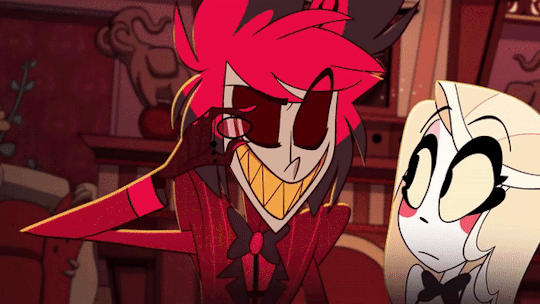
No, I'm not expecting the story to preach or even like, be explicitly Christian in a lot of ways. But it's taking a lot of the really beautiful aspects of Christian theology and re-contextualizing them in a way designed to provoke thought: by juxtaposing them with the antithesis of what you would think, by making demons heroes. In my opinion, this makes the beauty shine brighter.
Yeah, yeah, it's designed to be offensive and obscene in a lot of ways. Yet, it's never (thus far) mean-spirited. On the contrary, it seems to have a big, beating heart at its core that is perhaps best embodied by Charlie Morningstar, its protagonist and the daughter of Lucifer and Lilith.
Critique of the Church, with Caveats
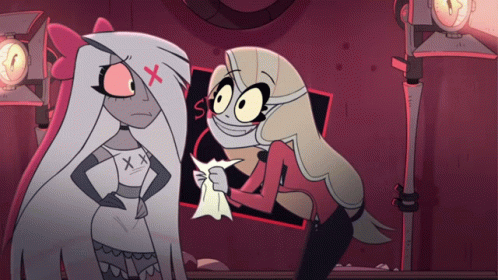
The story works best with an interpretation that heaven isn't actually heaven or God (who has been conspicuously absent), but instead as a critique of the church. Specifically, the evangelical American church, and specifically, white evangelicals. (Same as She-Ra's premise, actually).
God's absence therefore makes sense, because while Christians do believe God is present as a living reality among us, we also can't like, see him physically now. So, God being not even mentioned in HH makes it seem more like a mortal reality rather than an immortal one. Honestly I kinda hope God doesn't appear in the story, not only because I think it could cross some lines (which is admittedly personal), but also because I don't see that the story really needs it.
Adam in particular reminds me of every "theobro" on Twitter (I'm not calling it what you want me to, El*n). Basically a dudebro coopting his supposed salvation to flex in an often misogynistic way, who doesn't realize that he has absolutely no love in him and therefore is actually a worse human being than everyone he condemns on the regular.
(Which is kind of why I'm expecting Adam to wake up in hell next season...)
Think red hats. And Mark Driscoll. And, I have a list of pastors. Sigh. They advocate for how "simple" Christianity is, except they themselves make it ridiculously complicated and don't even examine what they suppose is "simple" if it requires them to take the planks out of their own eyes. "Shallow" is a better description of what they actually preach.
But what sends people to hell or heaven anyways?
Eschatology and Atonement Theory

Hazbin Hotel combines a lot of theories, throwing not only the idea of a physical hell (albeit mixed with Dante's idea of what hell is the Inferno, but to be fair a lot of the church has adopted that idea too) but the idea of annihilation, which HH calls "extermination."
See, in Christianity, there's a lot of debate about hell. Like, since 2000 years ago. The reason is because a lot of Bible verses seem to indicate hell, but others indicate the eventual redemption and salvation of absolutely everything in the universe, so you have Christian universalism tracing itself back just as long. But, setting aside universalism, people who do believe in hell tend to fall into one of two camps:
Physical hell, aka suffering for eternity, or annihilation: the idea that souls that aren't saved end up annihilated, or snuffed from existence. HH combines both of them, wherein everyone lives in hell but then every so often heaven "exterminates" a certain number of sinners.
And then you also have Catholic purgatory, which is also adapted in HH in that... for most Christians, physical hell doesn't offer the ability to redeem yourself. Chance over, you're dead. But, Catholic Christianity, which draws on ideas of praying for the dead, has the idea that people can improve themselves or be prayed out of it and into heaven. This seems to be somewhat similar to the idea of Charlie's hotel, in that sinners can improve, redeem themselves, and rise to heaven.
And, I mean, it's already kinda worked. Sir Pentious acted out Jesus' words: Greater love has no man than this, that he lay down his life for his friends (John 15:13).

But anyways, the branch of theology that deals with the afterlife is eschatology. And Hazbin Hotel takes on a related form of theology as well, a type of theology I've only seen covered in stories once before (The House in Fata Morgana): atonement theory.
Atonement theory is something I remember well from my theology 101 class, as in I remember sitting with a friend and her turning to me and being like, "okay, so we know Jesus' death and resurrection give us eternal life, but we have no idea how or why?" To which the answer was "basically, yeah."
Most of the white, American evangelical church is very "penal substitutionary atonement," but the reality is that this theory has only been popular for the past few hundred years. It's also, imo, somewhat scripturally unsound. But there are a lot of other theories, and sometimes the theories overlap. Here's a fairly decent summary. (I'm in general a believer in Christus Victor.)
So how does atonement theory tie into Hazbin Hotel? Well, essentially the scene where Charlie and Vaggie are debating with Emily, Sera, Adam, Lute, and others in heaven is them going over various atonement theories and realizing that they actually know nothing at all. How does one get to heaven? How is one saved? They don't know.
Sera criticizing Emily for asking questions was also very relatable, and I feel for Sera. She's genuinely scared but the truth will set you free, Sera. John 8:32. Anyways, the point is like... the angels are an organized religion, an evangelical church, that preaches about simplicity but mistakes shallowness for simplicity and discourages depth and discovery.
Anyways, the whole crux of theological study and atonement theories is that they should promote humility. We don't know for certain on this side of the curtain. That's okay. So what do we have to guide us?
Love. After all, God is love (1 John 4:8).
Charlie is Jesus
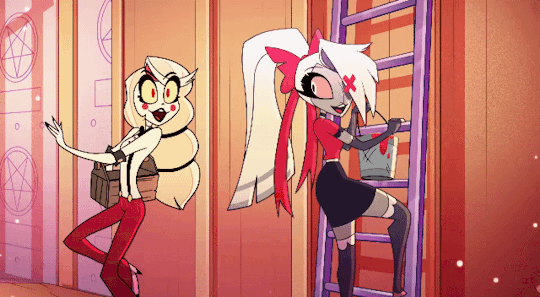
"Why would you endanger your immortal life for these sinners?"
Adam, the absolute worst, says the above to Charlie in the finale.
I mean... look. That's literally the premise of Christianity. That the immortal son of God comes down to earth, lives with sinners, loves us, and dies to save us. However that happens. Charlie even responds:
"They're my family!"
In other words, she loves them. Yeah, sure, they're destined for extermination, but they are going to be exterminated over her dead body.
In a lot of branches of Christianity, and even in some creeds--though I'm going to give into my pet peeves here and state that it is NOT Scriptural and relies on the faulty assumption that God is bound by time, when I think God exists outside of it--state that Jesus descended into hell after his death and took all the souls of people who were saved prior to his coming to earth to heaven. Again, I think that's small-minded at best. But, the idea that Charlie is working among them to bring them to heaven is pretty reminiscent of this idea. And I don't hate it lol.
Charlie sees worth inherent in everyone, and no matter what they've done, thinks there's a future for them. Honestly we need people like her on this earth.
Angel Dust

Angel Dust is clearly my favorite character. Bite back your shock, I know (I have a type). But his name is also a fascinating multi-layered pun.
Angel is clearly foreshadowing his endgame. Let's be real, we all know Angel is ending up as an angel. And "angeldust" is of course a name for PCP, and considering Angel's drug habits, yeah.
But, dust also has another meaning to it. See, when Adam was created in Genesis 2:7, the words in Hebrew are "apar min ha'adamah," which is translated literally as "dust of the ground." So the dust is what creates Adam, literally "ground."
In other words, I very much expect Angel Dust to end up being foiled with Adam even more so. Adam might be the first man, but Angel is the first sinner working towards redemption. And let's be real, for all Angel's flaws, he's already a better person than Adam. And if there's any hope for Adam (not that I particularly care if there is but) it'd be through realizing that he and Angel aren't actually different after all. Conversely (and not necessarily mutually exclusively), Angel might serve as a more symbolic "adam" in that he becomes the person all sinners look to for hope. Which, y'know, since "the last Adam" is also a Scriptural term for Jesus...
And so it is written, “The first man Adam became a living being.” The last Adam became a life-giving spirit. (1 Corinthians 15:45).
I fully expect Angel's arc, alongside Charlie's, to bring life and redemption for everyone around them. Maybe, maybe even the dramatic "all" of Colossians 1:20 (which means, literally, all, everything, everywhere, in the entire universe).
Closing Thoughts
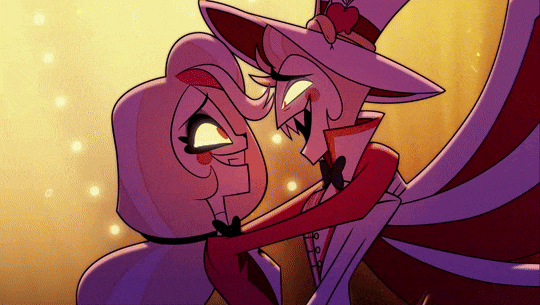
But honestly, regardless of how the story ends--besides that it will presumably end happily because HH is at its core feel-good despite being profane--season one at least has got good theology. Why? Because it's digging into the questions that theology is concerned with. It's digging into the ideas of human nature, of what it means to be a good person, of what it means to redeem oneself, of affirming how precious each individual human soul is.
It doesn't offer cheap answers, and it specifically calls out the white American evangelical church for how it purports to be simple but actually just confuses people and punishes them for things they can't help, that creates more stumbling blocks than it does shine a light. And it does it in a way that is scandalous. Offensive to many religious people.
But, y'know, Jesus was pretty scandalous too.
So I really love the story so far because it emphasizes what I find so beautiful about my religion, and criticizes the parts that have also hurt me. I don't think it's remotely aiming to be a Christian allegory or anything like that, and I don't at all think anyone has to be religious to enjoy it or gain the core message of it, but I do think that it's doing a hell of a lot more good in the world message-wise than most evangelical movies of the past 30 years.
#hazbin hotel#hamliet reviews#theology#christianity#charlie morningstar#jesus#angel dust#angel hazbin hotel
305 notes
·
View notes
Text
emma is the villain of tgwdlm
I need to talk about this oh my god
because it's told from the hive's perspective. paul is the protagonist because he is the one who resists them but must ultimately come to accept that they're right. emma is the one who must be beaten through force.
the difference between the hero and the villain is that the hero must change, while the villain cannot. (I'm not speaking in universals here, just generalizations of how the narrative structures work that tgwdlm uses in parody.) the hero and the villain both hold a belief that represents the thematic evil; by the end of the story, the hero must undergo apotheosis, which is to say, ultimate unity with the thematic good. once this is achieved, he can defeat the villain, who represents the thematic evil completely and is incapable of change.
to the hive, "good" is unquestioning conformity to the group's ideals, specifically, singing and dancing in sync with everybody else. "evil" is refusing to sing and dance along when, clearly, you want to.
paul is the perfect protagonist because he resists song and dance, but largely because it makes him uncomfortable. getting out of your comfort zone is necessary for change! it's a good thing to let yourself go through something uncomfortable in order to come out the other side better and stronger for it. (that much is true; however, sometimes discomfort is a legitimate sign that you should stay away from something.) paul has never really tried singing or dancing, and deep down, is afraid that if he tried it, he might like it. exactly the sort of person who can be converted and used as a shining example of the hive's righteousness.
emma must be the villain because her refusal to fall in line is a choice. she can sing, she can dance, she was in brigadoon in high school and she fuckin killed it, she is even taught a whole ass song with choreography by the hive on their first morning in hatchetfield (emma's comment about how they have to sing "all the time, apparently!" and zoey's implied presence at the theater when the meteor hit - because she was with sam, and sam was there - strongly suggests that nora and zoey were zombified all morning and she had no idea). it's stated by hidgens and suggested by nora and zoey that getting a human to sing/dance along with them is supposed to be a sort of mesmerizing tactic that the hive uses to start synchronizing a person to the hive mind, but emma refuses. she sings and she dances, just like they want, but she chooses to actively hate it the whole time, on principle. she can't be convinced; they have to swarm her, surround her on all sides. let it out is meant to win paul to their side; inevitable is just to gloat.
in the bar scene in hidgens' bunker, emma says that she must be the villain to paul's hero because she was in the musical that got him to hate musicals. on the one hand, she had it backwards; she's the villain because according to the hive, the all-encompassing narrative power, he's not supposed to hate musicals. on the other hand, she's kind of right: paul is the protagonist because he is the guy who didn't like musicals, while emma is the villain because she has the capacity to like musicals as well as experience in them, but has chosen to reject them.
who is the hero and who is the villain all depends on who is telling the story. and the hive is telling this story. don't forget that.
#starkid#team starkid#the guy who didn't like musicals#tgwdlm#media analysis#literary analysis#hero's journey#tgwdlm emma#tgwdlm paul#emma perkins#paul matthews#lauren lopez#jon matteson#nick lang#matt lang#jeff blim
295 notes
·
View notes
Text
Welcome to another round of W2 Tells You What You Should See, where W2 (me) tries to sell you (you) on something you should be watching. Today's choice: 琅琊榜/Nirvana in Fire.
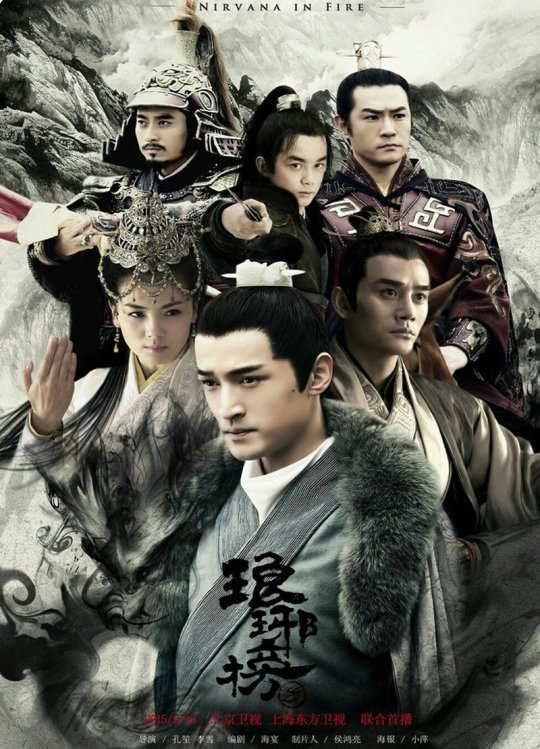
Nirvana in Fire is a 2015 historical series best described as either a complicated succession drama set in the premodern Chinese imperial palace, or the story of a man who didn't die a decade ago and has decided to make it everyone else's problem.
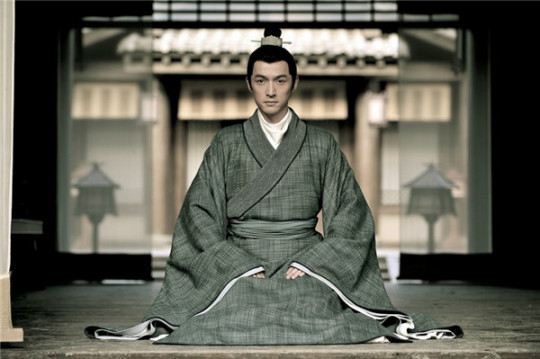
And really, I almost feel silly giving my glib little summary, because Nirvana in Fire is so well-known of a property. It's a classic for a reason, and that reason is that it's legitimately very good. This show is what happens when you adapt a solid story, get a bunch of very talented actors, and throw a huge amount of money at it. It's incredibly popular and highly acclaimed, and it earned all of the hype.
Still, while I bet there are few people adjacent to c-drama stuff who've never heard of Nirvana in Fire, I'm sure there are plenty who haven't watched it. After all, it looks like one of those slow, serious shows with a lot of ponderous talking and no joy. If that's the impression you've been given, I could imagine looking at the 54-episode commitment and saying, I don't need that in my life.

I am here to tell you you're wrong. It is a banger of a show. It's tense. It's funny. It's heartbreaking. It’s exceptionally clever. It’s jaw-droppingly stupid. It’s romantic. It’s tragic. It has smart plots and bizarre subplots. And that's not even touching the thing with the yeti.
So in case you're one of those people who's heard of Nirvana in Fire, but has put off watching it for one reason or another, I'm here with five reasons I think you should try it.
1. Epic Shit
Did you like the Lord of the Rings? More specifically, did you really like the second Peter Jackson film? Great, then you're all set for this.

I guess I could have called this Game of Thrones without the dragons, but that's not actually the vibe at all. Game of Thrones is much more sensational and salacious, with all the blood and butts and what-not. The Tolkien comparison is more apt, I think, because Nirvana in Fire is equally about as wholesome as you can get in a property where dudes are still getting stabbed all the time.
This is a show about vengeance. And yeah, justice for the fallen, sure, that's fine too. But mostly it's about a bunch of good people joining forces to make sure the bastards who did wrong pay, with their lives as necesary.
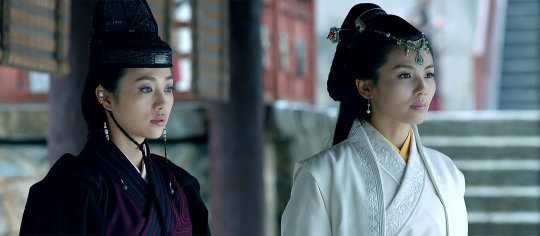
The problem, though, is that these bastards are incredibly powerful, which means that a pure brute-force approach isn't going to work. Accordingly, this quickly becomes a story about the power of smart teamwork to exact retribution on some people who can (and did!) legally get away with murder -- and our heroes are some of the people with their necks most on the line if anything goes wrong.
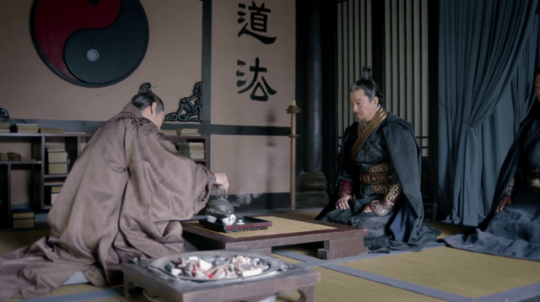
Don't let the Middle Earth comparison fool you into thinking this is all epic swordfights. It's not. (I mean, for one thing, as well-funded as this project is, it doesn't have Peter Jackson Money.) The vast majority of the tension in the show comes from dialogue and slow, terrible realizations. The fight scenes are almost a relief from the nail-biting intensity of intimate conversations about getting a letter from somebody's ex-wife or returning a book.
All told, the show has that incredible almost-RPG vibe of going through all the little subquests and cutscenes you find along the way to defeat the final boss. The plot carefully unravels a multi-tendriled mystery told to you by people in incredible costumes. It doesn't get much more epic than that.

(Nirvana in Fire is also a cautionary tale about how you should be very careful with who gets invited to your birthday party.)
2. A chronically ill protagonist
Okay, right in the first episode, it is established that the main character has three whole completely different names and an old nickname. I'm going to call him Mei Changsu for the duration of this rec post, but let the record show that I could just have easily gone with one of the other three.
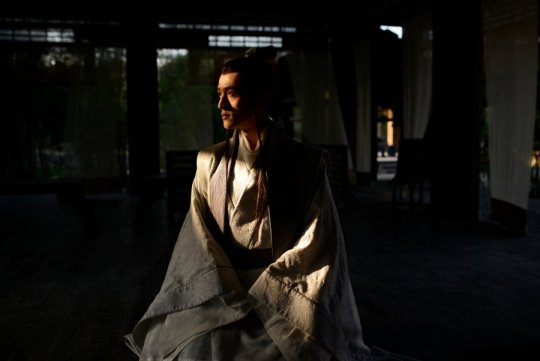
What you learn in that same first episode is that Mei Changsu used to be a palace insider, the cocky son of a noble family, only now nearly everyone he used to know thinks he's dead. Also, he's not far off from being actually dead -- he has an unspecified terminal condition that's mostly managed, provided he stays in his little mountain hideaway with his handsome doctor bestie and doesn't return to his old stomping ground and start kicking over hornets' nests.
So guess what he's about to do.
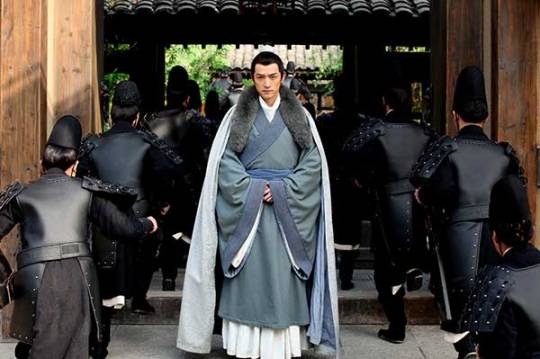
I have to make a note of how brilliant the casting is here: Hu Ge is an action actor! He is a kickpuncher of a man! And I think it's great that you can sort of see his frustration, as well as Mei Changsu's, at having to spend the whole series wrapped in countless layers of fabric and/or lying in bed while everyone around him gets to be the badass action heroes.
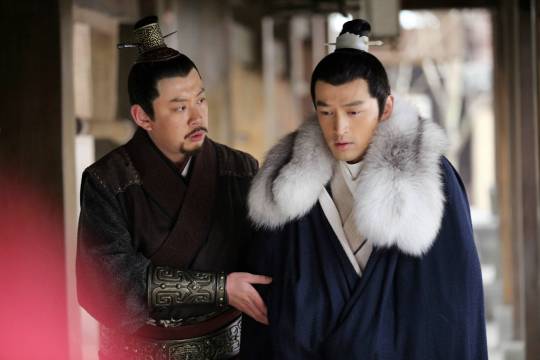
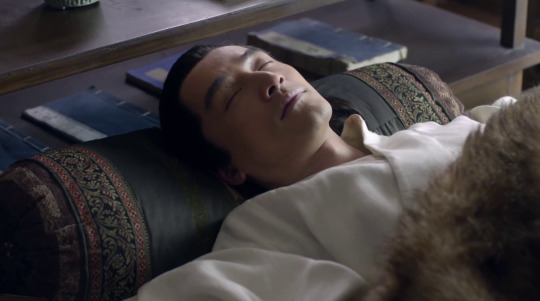
Mei Changsu's not faking it, either -- he's actually dying. He expends his energy where he thinks it's necessary, and sometimes that means he has to spend the following week in bed. He's constantly frustrated with himself for what he can't do anymore. He's racing a clock, and that clock is his own failing body. If he dies, the only hope anyone here has for justice dies with him.
He gets two love interests that the show treats pretty much equally. One's a lady general who wasn't even a love interest in the book. The other's the handsome prince who was initially going to be his textual romantic partner in same book, until the author hopped genres from danmei to general historical drama. I can't even call this a love triangle, because there's no competition. He just gets a wife and a husband -- in that he gets neither, because circumstances and his own illness keep him distant from them. He lies to both of then about his condition (among other things). He wants to be with them both and knows he can't be with either. And they in turn have to learn to accept what of him they can and can't have.
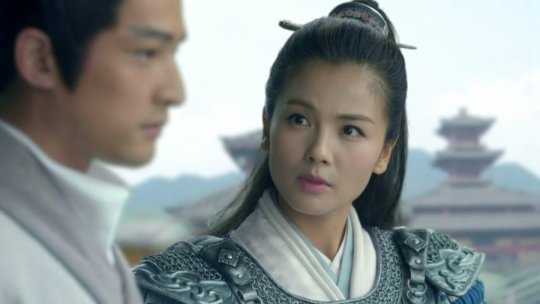

(Also, Nihuang (her) and Jingyan (him) are both incredibly gorgeous, which is exactly what bisexual genius Mei Changsu deserves.)
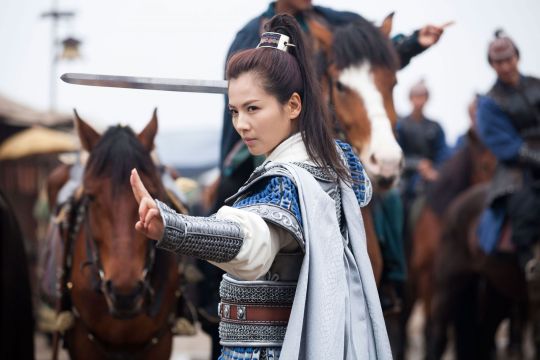
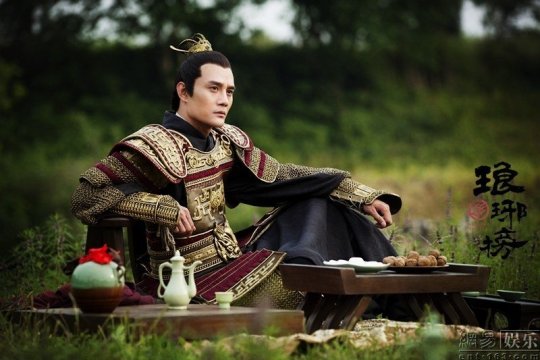
Obviously this isn't a perfect representation of life with chronic illness, largely because Mei Changsu is an incredily wealthy man who lives in a universe with what's basically magic medicine. However, I've seen the story's treatment of him and his condition resonate with a lot of chronically ill viewers, so even with the fantasy layer on it, there's definitely something there.
3. Dave
I have already told the story of how Meng Zhi became "Dave," but long story short, he's such a Dave that I legitimately forget his character's real name. He embodies Daveness. He's The Ultimate Dave.
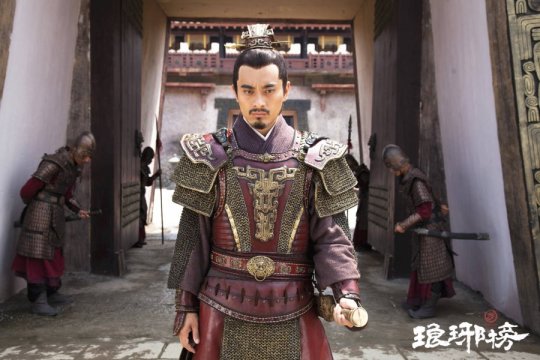
Dave is an excellent fighter, a loyal friend -- and a terrible liar. He's possbly the only straightforward character in the entire show. When he's asked to be duplicitous, he's comically bad at it. Dave will never do a heel turn. I was misled at first by his semi-evil facial hair, but I have seen the error of my ways. Dave is pure lawful good.
And the reason I list Dave as such a selling point is that having a Dave means you always know what's going on. This is because Dave never knows what's going on, and he has no ego about that, so he asks questions, and other characters have to explain to him what just happened, and that is how you figure out what's going on.
It's an incredibly smart move on the drama's part, because some of the (very fun) schemes are so complicated that there's no way for you, the viewer, to understand them just by watching. Without the internal monologues and omniscent narration of a book, the machinations are opaque. You need things explained -- but why would the schemers explain their schemes? Well, Dave needs some exposition, so here you go.
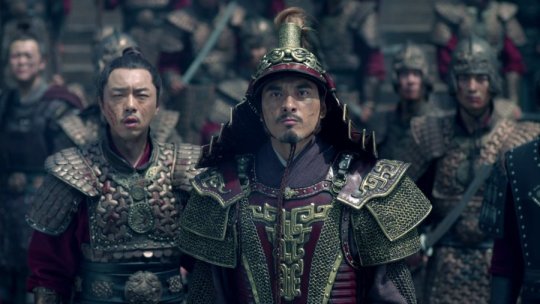
So if you're worried that you might be left feeling stupid by a show where so many sneaky people are hatching so many complex plans, worry not! Like the good man he is, Dave has your back.
4. A Million Amazing Antagonists
If you like bad guys, this is a show for you. This show has brilliant bad guys all the way down. It has bad guys at every turn. It has bad guys for every taste. Welcome to Big Liang's Big Bad Guy Emporium, where we guarantee you'll walk out of here with a bad guy you like, or your money back!
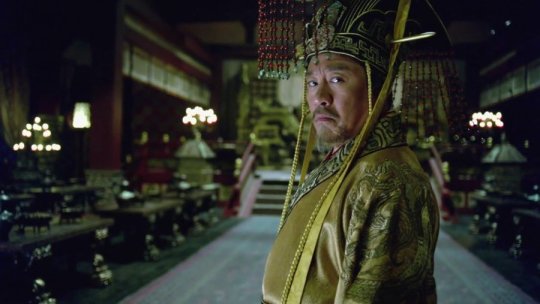
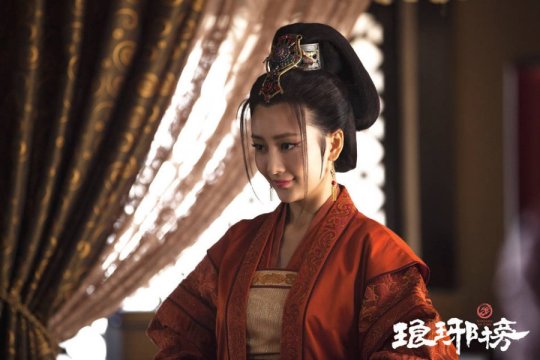

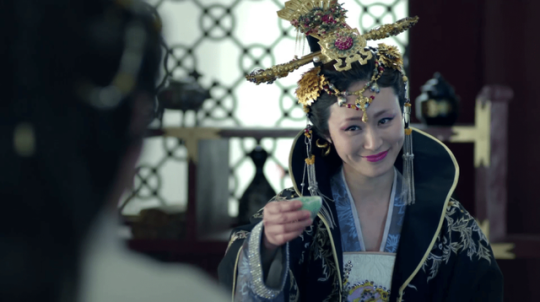
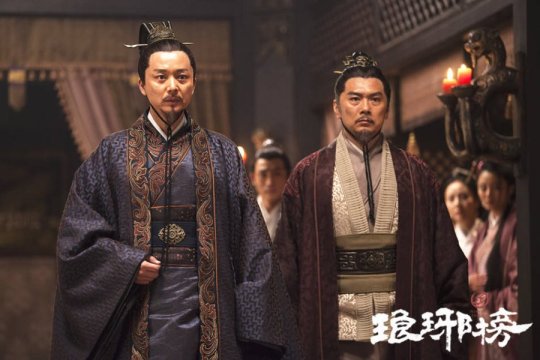
(And yes, this set of pictures is also to say that their costume budget was entirely well-spent.)
Without getting too far into spoilers, I will say that the basic situation underlying the whole series is this: The emperor has done a lot of bad things, and he has enlisted a bunch of people's help in hiding those bad things, so much so that many of those other people have done even more bad things the emperor didn't even know about -- and then everyone has gone to great lengths to cover those up as well. Our protagonists spend the whole series unraveling this colossal shitshow and bringing people to task for their crimes.
So really, if you're going to spend 54 episodes taking down the baddies, they've got to be baddies you love to see taken down. And these are -- in part because all of them have crystal-clear, rock-solid motivations for their actions. Nobody here is a moustache-twirling comic-book-villain baddie. They're all bad for reasons that are very understandable in their individual contexts. And not a single one of them is going to go down without a fight.
5. World's Best Mom
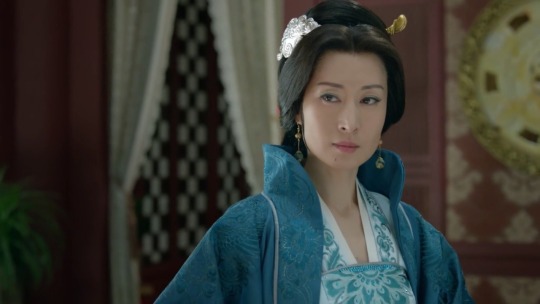
(Sidebar: The fact that four out of five of my reasons to watch the show are individual or groups of characters should be your strongest indicator that this is an intensely character-driven story.)
This is not a Dead Mom Show. Okay, some moms are dead, but mostly this is a Moms Are Alive And Often Cause Problems Show, which is a lot of what makes the palace drama so delicious. But there is one Good Mom who stands out above all the rest: Consort Jing.

Played with perfect grace and devastating politeness by the stunning Liu Mintao, Consort Jing is a skilled doctor and excellent baker who starts the show with a low-level status among the women of the palace. She swallows down all kinds of mistreatment because she's not in a place to oppose it -- and when she can retaliate, it must only be through soft power. She loves her jock son with all her heart, but because of both their relatively poor positions in the hierarchy, she doesn't get to see him all that much. She wants to be an asset to him, while all the time she has to fear becoming a liability.
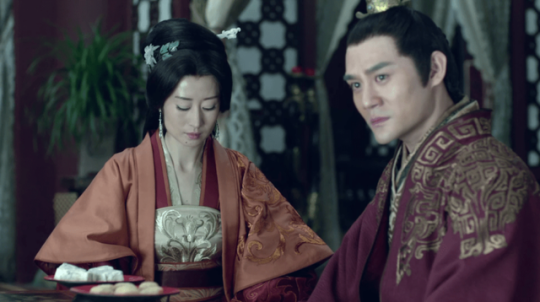
She is also the smartest person in any room that she's in, unless she's in a room with Mei Changsu, and even then it may be a tie.
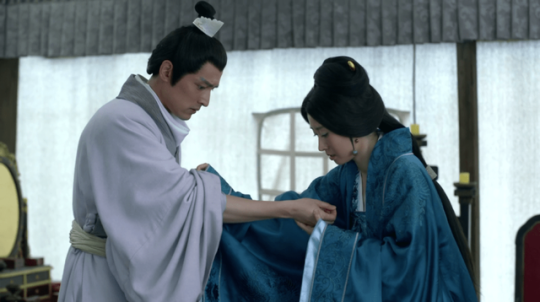
There are lots of great characters in the show that I could have highlighted here, and plenty of them are women, but Consort Jing in particular never ceases to impress me. She is trapped in a gilded cage, married to a man who [lengthy list of spoilers that are traumatic to her in particular], and held hostage by how every time she even looks like she's out of line, it puts both her and her boy in danger. She's the most vulnerable of any of our good guys. Kind of like Wang Zhi, she's got to be clever or she's dead.
Consort Jing is not part of Mei Changsu's original plan. She figures out his plan and makes herself part of it -- and entirely remotely, as she and he aren't even in the same room until episode 40 or so. She puts herself in great danger to make sure he succeeds, not because it will necessarily do her any good, but because Jingyan needs him. This woman has been captain of the Mei Changsu/Jingyan ship for like twenty years already.
Oh, and did I mention her outfits?
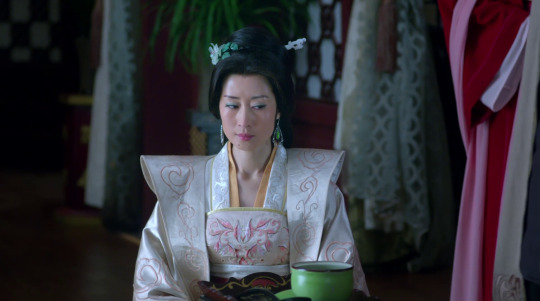
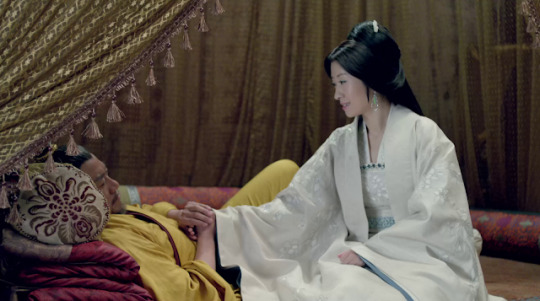
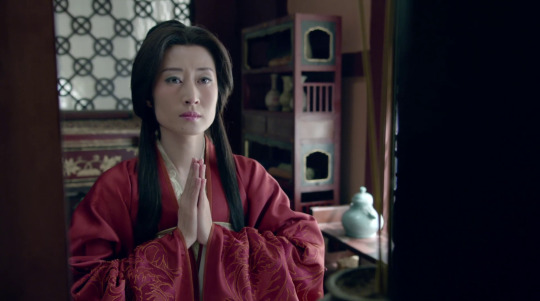
I love you, Consort Mom.
Are you ready to watch it yet?
Get it on Viki! Get it on YouTube! Get it on YouTube but in a different playlist! (And also maybe get it on Amazon? Not in my region, but maybe in yours.)
I will warn you that it does take off running -- I think I saw someone say it introduces nineteen characters in the first episode? I was worried that I'd be too innundated by situations and flashbacks and names to be able to follow. By the second or third episode, though, I was rolling with it. So if you feel like you're struggling at the beginning, stick with it a bit. See if you don't feel it start to click.
...Man, reading over this post has left me going, oh, but I missed that! and that! and that guy! And yeah, the truth is that there are just so many great things about the show that limiting myself to only five (and being limited to only thirty images) was tough. I'm sure that people reblogging will add their own must-see elements.
Truly, this is a show that deserves its reputation. It may not be for everyone, but if this is the kind of thing that you like, it is a shining example of that thing.
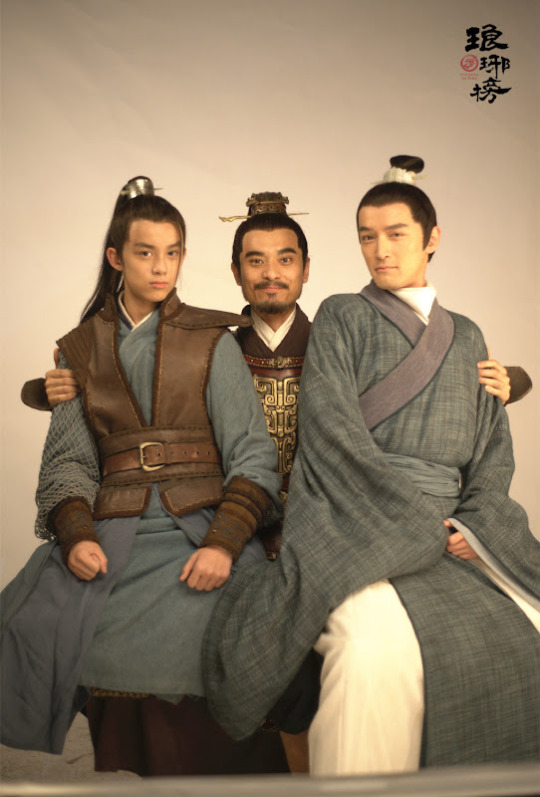
Besides, you have to love a production where everyone was clearly having just a whole lot of fun being big ol' costumed dorks.
377 notes
·
View notes
Note
Oh my god stop fucking romanticising the Laika story. I'm sick and tired of you people glorifying the life and death of what was a completely normal dog who was horrifically abused and went through unimaginable suffering at human hands. She is not the patron saint of anything she was just a dog who experienced great cruelty. It could have been any dog. If they killed your dog by overheating and suffocating you wouldn't be saying this same shit. You actually make me feel sick lol. She wasn't a hero or the protagonist of some great story, she was a victim. The only reason you're even remotely interested in her is bc she was abused. Disgusting
i understand your anger and respect it, because clearly you see this in a different way than i do, but please consider that maybe a fellow abuse victim would relate to and want to give the memory of another abuse victim meaning and power. consider that it's not suffering that's being celebrated, but the memory of a victim who could have been any dog, but was Laika, and deserves to be acknowledged as such. consider that me making that post about her is because i want to mourn the sacrifice she was given no choice in making and not let it be forgotten. i don't love her because she's a victim or for the sacrifice she was forced to make. i love her because she was alive and she existed and that should have been enough. i love her so that her memory endures and she is not consigned to history as nothing more than a stepping stone in the name of progress. i love her because we have both been hurt and had decisions made on our behalves that weren't in our own best interests or even considered us and what we would be made to endure at all, and nobody loved us enough to step in and say "no" and stop it. i love her because i am angry and afraid and have suffered and seen others suffer and i refuse to be defined by that suffering and fear and anger alone. you can disagree with how i express that, but don't assume that you know me or my reasons simply because they don't fit your own expectations, and don't make it my problem that you made up a guy to be mad at and attached my name to him.
#🐉#laika#animal death#animal cruelty#maybe this is harsh. but i dont like it when people assume the worst of me.
1K notes
·
View notes
Note
Non comic related ask,
A while ago you were asked about Jujutsu Kaisen and said something to the effect of you didn't like the direction it seemed to be headed in. At the time only the first season of the anime was around and I thought it was pretty nifty at the time.
Now that the second season is concluded and it's at least as far as I'm concerned it's suffering in tone plot and pacing your words have come back as best I can remember them anyway.
So the question as it were, what were the clues that tipped you off to this? I respect your well earned media literacy skills, but even with your statement I would not have thought it was going to turn out this way.
Huh, interesting!
Since I haven't been keeping up with it I don't know what the recent developments are, and it has been a hot minute since I watched the first season, but from what I recall I just realized pretty quickly that JJK was aiming to purposefully subvert a lot of shonen action anime tropes, starting with the Superpowered Evil Side and going from there. Vibes-wise, the power and combat system was pretty visceral - most of the characters had to do pretty gross or unpleasant things to get their powers working, which wasn't really my speed from the outset, so I was already wibbling a little on how invested I wanted to get.
And when the darkness ramped up with that one major character death - the one who was in the anime intro having lovely downtime with all the heroes in a peace he never actually got to experience because instead he died horribly - I got the impression that the underlying theme that was playing out was "our hero thought being a shonen action protagonist would mean the world around him played along to the classical narrative beats, and he has just learned that this is not true." It essentially ties in with my thoughts on Tone Armor: the story was playing with a familiar space of shonen anime tropes in such a way as to make the audience and characters expect one thing, suddenly experience something much worse than anticipated, and thus feel unsafe in the world it was establishing. Kind of similar energy to Madoka's sudden reveal of What The Story Actually Is the first time a magical girl gets her head bitten off.
I didn't think this was bad, it was pulling off everything it wanted to accomplish very effectively - it just didn't really play to my tastes at the time, so I fell off of it and haven't heard anything to get me reinvested.
219 notes
·
View notes
Note
I love your writing. If you want to, could you write something about an asexual hero x incubus/succubus.
"How come you're not trying to seduce me?"
"Excuse me?" The incubus turned to face them. He really did look like the kind of fairytale that ended up in broken hearts; too beautiful to be quite believable.
The protagonist swallowed. "How come you're not trying to seduce me?"
"...you're asexual. You're not going to be seduced by me. You're not going to be dinner."
"Some asexual people are very sex positive, I'll have you know. Big libido. All the kinky fantasies. Love all the incubi fun times."
"Are you one of those asexual people?"
"I'm just saying, it would be nice to get a bit of effort. I'm supposed to be your date tonight."
The incubus blinked.
"Just forget it!" the protagonist snapped.
"Are you feeling neglected?"
"I said forget it."
"Because I can certainly try and seduce you." The incubi's voice switched tone entirely; a rough octave drop perfect-made for silken sheets and slips. His hand pressed warm against the protagonist's waist, drawing them in, strong and sure.
The protagonist's breath caught because - well, sex was sex, but this. The electricity. The possibility. The giddy, intoxicating feeling of being the only thing that those eyes wanted to see, above everything else in the room.
The incubus could have anyone they wanted. It was stupid. It was embarrassing. They never should have said anything.
God, they wanted more of it.
They wanted the incubus to pick them out of a crowd and lead them onto the dance floor. They wanted the dips and the romance; the roses and all of their thorns.
They wanted everyone's eyes to stop skimming over them, the second they heard the word 'asexual', and they knew that was wrong but...
The incubi's lips dragged hot against their throat, pressing against the shell of their ear.
"The problem," the incubus murmured, "is that I rather like you, and I'd rather not kill you."
It snapped them out of the fantasy to - to the incubus's eyes, warm and amused and something else entirely. To the kindling-curl of the incubus's lip, dragging the protagonist's mouth helplessly up into a matching smile.
"You like me?" the protagonist managed.
"I invited you here."
"I just thought you wanted a buffer. Someone who didn't helplessly throw themselves at you."
The incubi raised a brow. "And that pique of...whatever that was...was you being totally cool and not desiring me in anyway whatsoever?"
The protagonist opened their mouth. They closed it. They wanted the floor to swallow them. "Well, I still don't want to sleep with you!"
"Well, thank god," the incubi replied. He flipped the protagonist's hand, pressing a kiss to their knuckles, holding their eyes. "Now come dance. We've got a scheme to foil, don't we, my hero?"
My hero. They could get entirely too used to that. The incubus looked like he knew that.
"You're a bastard," the protagonist said.
"Mm. And you're seduced." The incubus's grin was a wicked, entirely delighted thing.
"Such a bastard."
The incubus winked, and dragged them out onto the dance floor.
At least for the night, for five minutes, the protagonist felt like the story they'd always wanted to be.
768 notes
·
View notes
Text
something that i've been thinking about lately is the parallels between star wars: andor/rogue one and tamora pierce's trickster's queen duology. primarily because the star wars brainrot is real and the tamora pierce obsession is forever, but also because they are kind of both tonal and thematic departures from their main 'verses in some similar ways?
in both the star wars verse and the tortall verse, the majority of the media has focused on one individual (or a small group of individuals) who make a profound difference in the world. Whether that's alanna singlehandedly finding the dominion jewel/becoming king's champion/making way for female knights, or luke skywalker blowing up the death star, or daine and numair going to the divine realms during the immortals war, or anakin skywalker becoming a sith and dooming the republic, most of the original material has seen battle and political change as something that is affected by either an actual chosen one or simply a single very plucky and well-placed individual.
trickster's queen and andor, however, really look at rebellion as something that has to be done by a diverse group of flawed people who work together despite their differences. mon mothma knows that her role is raising money. ulasim, chenaol, and the other members of the raka conspiracy each take their individual roles in the rebellion, and recognize that even though they might not want to work with aly or the luarin nobility, they need their skills and influence to make it happen.
both stories also show rebellion as extremely costly and something that requires making tough calls. nobody has their hands clean by the end of a civil war. notably, trickster's queen explicitly narrowly avoids having the protagonists kill a group of 5 year olds. luthen is ready to kill cassian when he becomes a liability, and cassian does kill lots of people, including some allies whose only "crime" is being susceptible to giving up rebellion secrets.
in rogue one, we don't like davits draven because he orders jyn's father killed, and that just feels wrong. jyn is our heroine and it upsets her, so emotionally it's distressing. but of course, draven and cassian and jyn are all working towards the same goal. draven did what he had to--galen erso is a liability as long as he's alive. dove and sarai's little brother elsren has to die because he's a direct heir to the throne, ahead of his sisters. it doesn't matter that he's five and totally innocent. as long as he lives, a luarin has a greater claim to the throne than a raka, and as long as that's true, the rebellion can't succeed.
in the star wars original trilogy, people for sure die! i'm not trying to say that they don't, but it's definitely not something that's shown affecting our protagonists on a deep, emotional level. they're all side characters, or else they come back as force ghosts. the prequels are uh. fucking tragic, but at the end of it, almost all of our heroes make it out. even the casualties of the war are droids vs clones, which is to say, totally interchangeable cannon fodder on both sides!
the number of character deaths in the tortall 'verse is fewer, probably because it's primarily created for middle grades, but even when people do die, they're either demonstrably bad people or minor enough characters that the emotional resonance isn't the same.
by contrast, at the end of trickster's queen, almost the majority of the main conspirators die in battle, not to mention those who don't even make it to the final conflict. at the end of rogue one, all of our heroes are dead, and people aren't exactly making it out of andor s1 in good shape either. more than half of the aldhani team dies on that mission.
I could go on further, but I think my main takeaway is that once you've invested a lot of time and attention and fandom into a 'verse, you have a lot more leeway to tell different kinds of stories. tamora pierce could not have written trickster's choice until after the values and world of tortall were so clearly established, and if she had, it wouldn't have had the impact that it did. similarly, part of what makes rogue one/andor so striking is the fact that it is such a departure from the preexisting values and story format of star wars.
for every chosen one we see in media, there are hundreds of people working behind the scenes to make their big, death star destroying moment possible. the only way to improve society is through collective action, and part of that is that everyone's hands are going to get dirty. i think lots of people want to imagine that they could be like luke skywalker and swoop in 2 weeks before the battle of yavin and become a hero, but the fact of the matter is that that's not how the world works! war requires us to do things that would ordinarily go against our values, but in the context of a drawn out, bloody, thankless battle, maybe we decide the ends justify the means.
#analysis#i don't particularly imagine that anyone will read this because it is so niche lmao#but the brainworms wouldn't leave me alone#star wars#long post#tamora pierce#tortall#tricksters queen#andor#rogue one
249 notes
·
View notes
Note
"A deuteragonist has a very different role in the MHA and that is a whole other post ."Can you please write this article? I am tired of Bakugo being constantly downplayed. There are very few people who understand his character and role in the story as well as you do.
Haha I mean hehe it's just hoho I never said fufu that Katsuki is the deuteragonist guffaw shucks haha I mean come on snort why are you putting words in my-
Katsuki Bakugou is the deuteragonist.
Katsuki Bakugou is the deuteragonist
Katsuki Bakugou is the deuteragonist
"Of course you would say that. You're a Katsuki Bakugou stan! You are invested in inflating his importance in the story because you love him." - some people, probably
No. If that were true, I would be arguing Katsuki Bakugou is the protagonist. But I'm not.
Because Katsuki Bakugou is the deuteragonist.
It's not that I love him and therefore assert that he's the deuteragonist. I love him because he's the deuteragonist (plus many other reasons). He is an archetypal familiar shounen hero made interesting in part by the fact that he is NOT the protagonist and deliberately written in the deuteragonist role/function, and I will go into visceral detail about this momentarily.
I promise you I don't go around in other fandoms arguing my favorite non-main character is the deuteragonist. I fully embrace whatever role it is they play in the story. YOU WILL SEE THE EVIDENCE OF THIS VERY SOON, FOR EVERY CHARACTER IN MHA.
What is a deuteragonist?
A deuteragonist is a story archetype. They are the second-most important character in a story (which is a vague as hell definition). They are often known as the "secondary main character."
That's it. Everything else one might say about a deuteragonist is just a sub-archetype.
A deuteragonist can be a sidekick, a love interest, a rival, an antagonist, or even a neutral party. They are often, not always, written as foil characters to the protagonist. They often, not always, provide a different and yet similar outlook to the protagonist's. Their utility in a story can be quite varied. Sometimes they support the protagonist, and sometimes they oppose the protagonist. Often, they are used to help the protagonist complete their character arc.
Sometimes, there can be more than one deuteragonist.
What the hell is a deuteragonist?
The problem is, the function of a deuteragonist can change just depending on the type of story we're talking about. A deuteragonist in an ancient Greek tragedy (theatre), where the term originally came from, won't necessarily function the same way as a deuteragonist in a 2-hour contemporary movie. Things get even more complicated when we're talking about a TV series, a book series, or a comic book series in which the cast becomes so large we're likely to see MULTIPLE deuteragonists.
My Hero Academia, like many long-running shounen manga, has an ensemble cast. Would you be surprised if I told you My Hero Academia not only has multiple deuteragonists, not only has multiple antagonists, but also has multiple protagonists? Because it does!
Sometimes people wanna divide MHA into three or four acts and make the claim that the deuteragonist changes from act to act. I say they aren't going far enough. MHA is divided into arcs, and each arc has its own protagonist and antagonist and sometimes even deuteragonist. This is a STAPLE of ensemble cast shounen manga, where often there will be so many characters they get grouped off into trios (or more) and one among them will be the group's designated protagonist.
Sure, in most MHA arcs, Izuku is the protagonist. But he's not always. Who is the protagonist of the Pro Hero (Endeavor vs Hood) arc? Who is the deuteragonist? It's not Izuku and Katsuki; it's Endeavor and Hawks! What about the protagonist in the My Villain Academia arc? Tomura. The Hero License Supplementary Course arc? Katsuki and Shouto (who can't seem to decide if they're co-protagonists or protagonist and deuteragonist and who is which). The Overhaul arc? Izuku is the protagonist and Mirio is the deuteragonist. Some arcs really play with these roles or make it unclear who is playing which role or if the role even exists.
What is a deuteragonist in My Hero Academia?
So if we have a bunch of protagonists, does that mean the most important one is the series' overarching protagonist and the one second in importance is the deuteragonist? It COULD be, but it's not necessarily true.
There aren't that many arcs where Izuku is not the protagonist. If we look at the number of arcs where someone else is the protagonist, following the above logic, we could end up with All Might or Endeavor as the deuteragonist. Maybe some people would earnestly make the argument Endeavor is the deuteragonist--I don't know, I haven't met those people I guess. The problem with this approach in my eyes is that it entirely discounts the deuteragonists of each arc. Would it not follow that the overarching deuteragonist is the character who has played the deuteragonist in the largest number of arcs? What if that character is different from the character who has played protagonist the second-most number of times? And this is to say nothing about if the protagonist or deuteragonist are the same as the antagonist in a given arc! It's difficult to weight any one character in this fashion particularly when you have an ensemble cast.
This is getting into the question of focus and screentime. How much should we weight this metric? Admittedly this one can also be complicated, especially when it comes to long stories with ensemble casts. The question is how much does screentime actually convey how much a character is the focus of a story, and does that necessarily translate to protagonist and deuteragonist? Because for many the question is: could the deuteragonist be an antagonist in MHA?
It just gets a little harder to argue someone besides Katuski Bakugou is the main deuteragonist the more Katsuki's screentime allocation looks something like this:
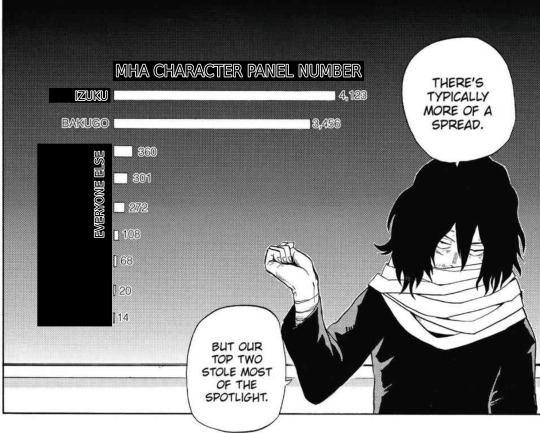
Okay, perhaps that exact size of gap is hyperbole. But there is a clear, measurable gap between Katsuki Bakugou and everyone else and I don't think anyone has ever disputed that. Please check out this post by @dekusheroacademia that has compiled some of these statistics (they also make some excellent points about evaluating the elements of a deuteragonist and how various characters fit or don't fit those characteristics).
Still, this is merely supporting evidence, not conclusive. I am well aware of the concept of a false protagonist, where someone appears to be the protagonist until later someone else is revealed to be the story's true protagonist. And while I've never seen a false deuteragonist where someone SEEMS to be the deuteragonist and is later revealed in a twist not to be (as opposed to the deuteragonist just merely changing NOT as a deliberate twist where expectations were set to be otherwise), that doesn't mean it can't happen.
Tangentially related, we could also potentially look at marketing as another piece of supporting evidence. It's not conclusive that just because Katsuki Bakugou is one of the most merchandised characters in the franchise that he is more important to the story than those who aren't, but it's still notable supporting evidence. After all, based on Horikoshi's marketing of his own story i.e. who he draws in which orientations on chapter and tankoban covers, or how he lists characters on character intro pages, we could easily come to the conclusion as casual readers that Izuku is the protagonist. There are many cases where one could conclude Katsuki is the deuteragonist based on such presentations alone. But again, I concede this is not conclusive.
So, if we set aside individual story arc roles, screentime, and marketing, what does that leave us with?
What is THE deuteragonist in My Hero Academia?
Even if we can determine Izuku Midoriya is THE protagonist of MHA based on things like the number of times he's protagonist in story arcs, his screentime, and marketing, I'll set those aside for the deuteragonist and see if there's something else that can help us here.
What element are we missing? The overall story.
Sure, we can break down the story into arcs and assign deuteragonists that way, but that's not getting us to THE deuteragonist. So let's start with the protagonist. How do we know Izuku Midoriya is the protagonist of MHA without considering the previous metrics? The way the story focuses on him. It is easy enough for anyone to recognize the characteristics of a protagonist in him from a functional perspective. He is a POV character. We hear his thoughts. He narrates the story. We see the story over the timeline of his character growth. His character arc coincides with the overall story themes.
I've talked many times about how My Hero Academia at its core is a story that explores the question: what is a hero? MANY characters explore this question, but the character who compiles these answers together and rounds them all out and grows and has his perspective change and exemplifies the moral is: Izuku Midoriya.
So let's go back to the functional elements of a deuteragonist. Remember those sub-archetypes? Well, in a shorter story with no ensemble cast, what do a sidekick, a love interest, a rival, an antagonist, and even a neutral party all have in common? They are defined by their relationship to the protagonist.
You see, in a story where all the characters interact with each other and converge on the major theme of the story, ALL characters are defined by their relationship to the protagonist. But in particular, the function of a deuteragonist is to supplement the story with what the protagonist needs FUNCTIONALLY. When is a sidekick the deuteragonist of a story? When the story focuses on the adventures of the protagonist and their sidekick. When is a love interest the deuteragonist of the story? When the story focuses on the developing relationship between the protagonist and the love interest (i.e. the romance genre). CAN a story with a love interest deuteragonist focus on their adventures and individual character development too? Yes, but sometimes the result is that the love interest is ALSO the sidekick...or the rival. When is the rival the deuteragonist? When the story focuses on the clash and growth between the rivals. When is the antagonist the deuteragonist? When the story focuses on the battle between them. NOTE that when I write this, I don't mean it focuses on the protagonist's adventure that culminates in them meeting the antagonist at the end for a battle. I am talking about when the BATTLE ITSELF is the main focus of the story. See stories like Silence of the Lambs or Death Note for a clearer example of what I mean, where the focus of each is on the psychological games the protagonist and antagonist play with each other. The point is, the story on a structural level, on a meta level, has to focus on these sorts of interactions to determine its deuteragonist.
Obviously this gets more complicated with a large story and an ensemble cast because you could have bits of the story where the structure changes and seems to focus on new things. That's why I pointed out that the more immediate protagonist and deuteragonist and antagonist often change in MHA depending on the story arc.
When I try to determine who is THE deuteragonist of the entire story, I have to look at the entire story. I have to ask myself what the story is about. So what is the story about? What is MHA about?
If you said MHA is about Izuku falling in love with Ochako, I'm sorry but you're wrong.
If you said MHA is about Izuku taking on All Might's mantle, I'm sorry but you're wrong.
If you said MHA is about Izuku defeating/saving Tomura, I'm sorry but you're wrong.
If you said MHA is about Izuku rekindling his friendship with Katsuki, I'm sorry but you're wrong.
MHA is about Izuku Midoriya (and most everyone else) learning what it means to be a hero.
It's in the fucking title. MY HERO ACADEMIA. The story is about Izuku's education (as it takes many forms) to learn what it means to be a hero.
So who is the deuteragonist in the story about Izuku Midoriya learning what it means to be a hero? The character who is second-most important in how Izuku Midoriya learns what it means to be a hero.
A lot of characters do teach Izuku Midoriya what it means to be a hero or at least some piece. But who is MOST IMPORTANT?
See, My Hero Academia is LONG. If we just focus on the parts of the story in which Izuku tries to learn from All Might or take on his mantle, we lose ARCS of the story. The same is true if we focus on his love life, or his rivalry with Katsuki, OR EVEN HIS BATTLE WITH TOMURA AND ALL FOR ONE. In the case of the latter, we're basically excluding HALF the story: the school arcs!
MHA is structured such that it alternates between what we colloquially refer to as "school arcs" and "villain arcs." And while exploring the question of "what is a villain?" is an important subset of the main theme, it is not the entire story. You can't just label all the school arcs as "filler" (because they're not) and chuck them out. Each story arc contributes to the lessons Izuku learns and the theme of the main story.
I can think of something every character teaches Izuku with respect to this theme. I can think of a lesson Izuku has taken away from every encounter and every story arc. But who ELSE is present in nearly every story arc? Who represents the foil to Izuku who allows us, the audience, to learn alongside them what it means to be a hero? Who learns the bits Izuku does not need to learn because he already exemplifies those answers in spades? Who represents the other half of the hero equation that Izuku is missing? Who has his own blanks filled in by Izuku himself? Who has played all the sub-archetypes of a deuteragonist for Izuku Midoriya, including antagonist, rival, sidekick, and even arguably love interest (replace with platonic interest for the rekindling friendship angle if you want so we don't have to go into that whole thing here please, I'm talking about the generic structural elements within a story more than anything)?

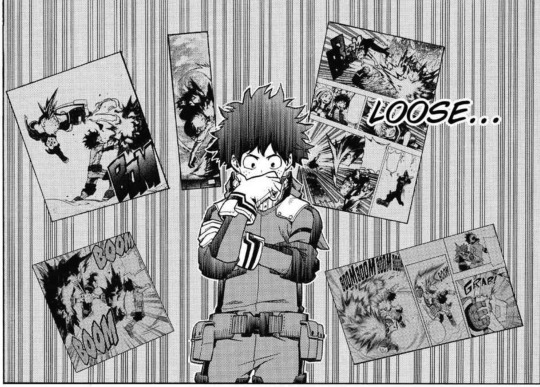
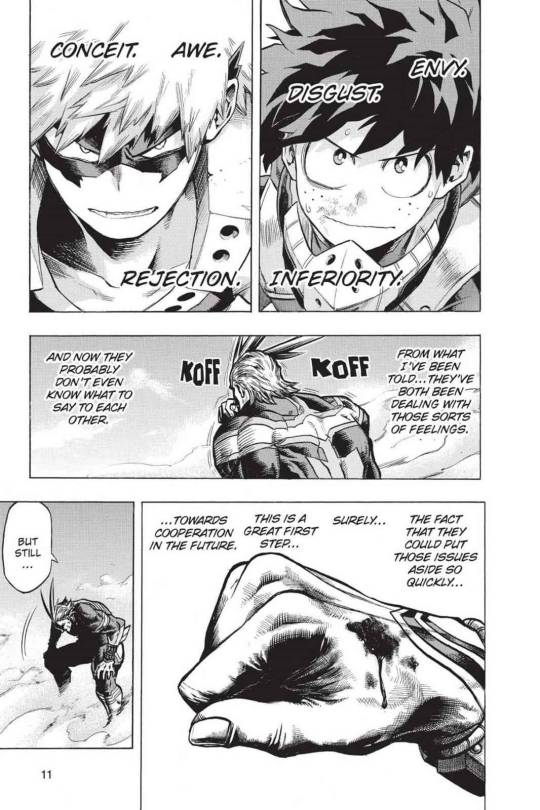
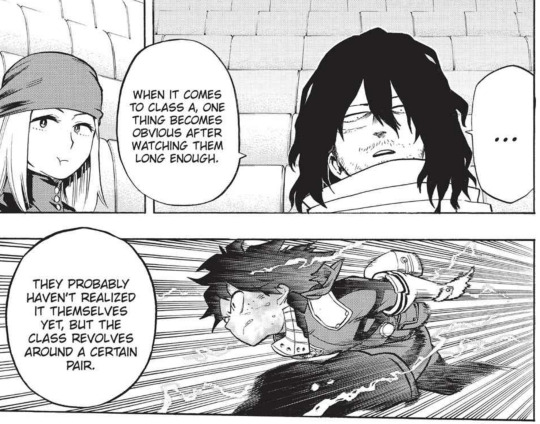
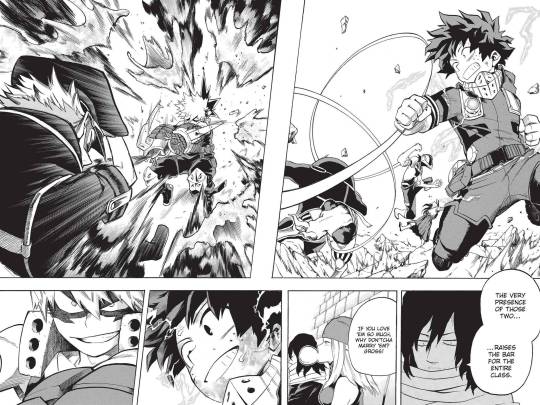
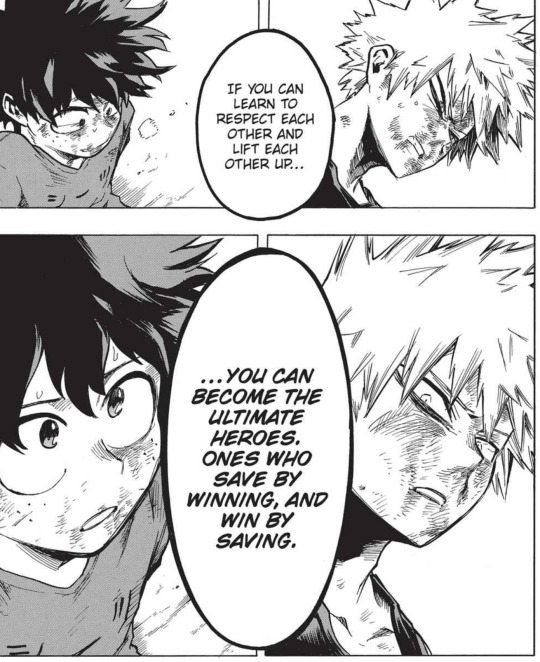
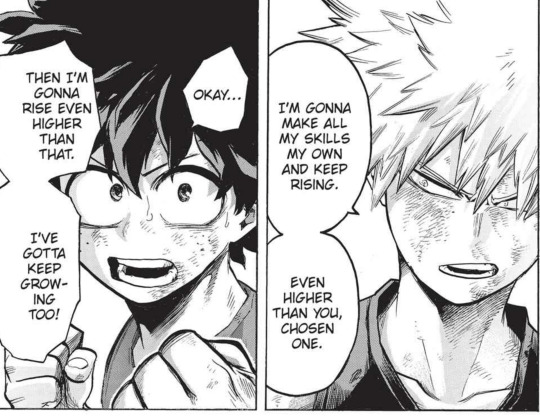
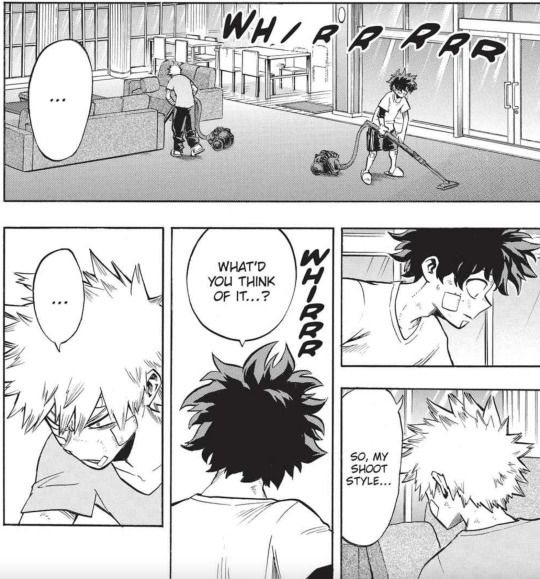
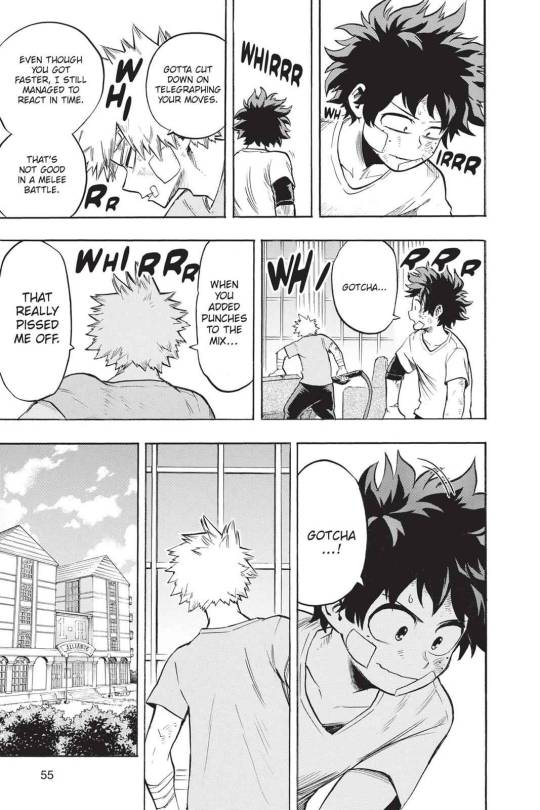
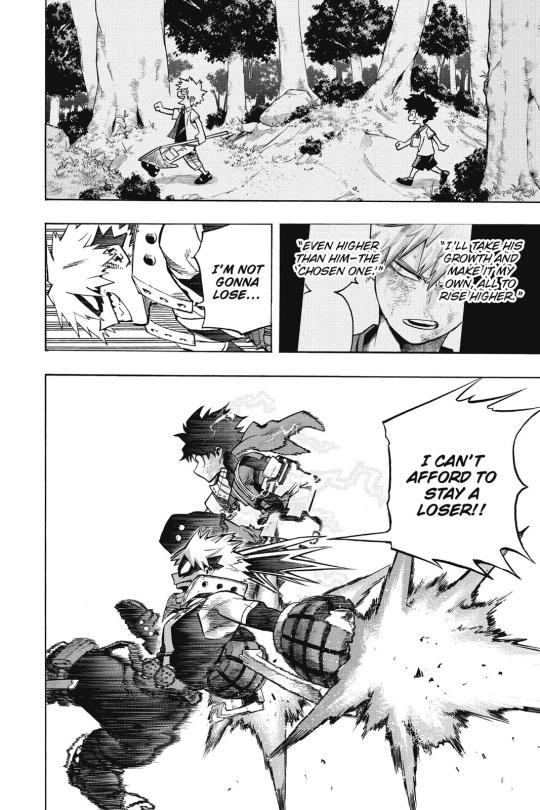
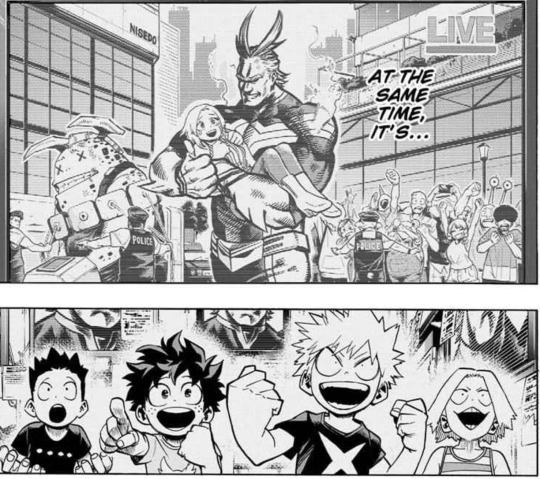
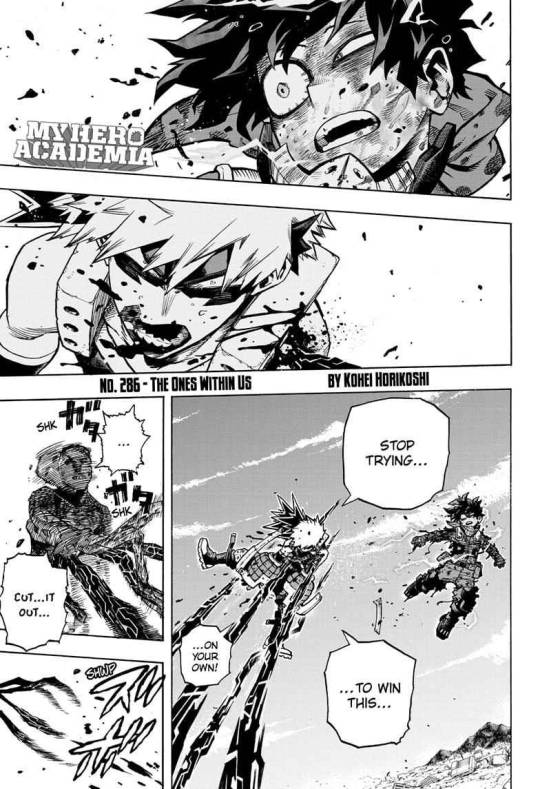

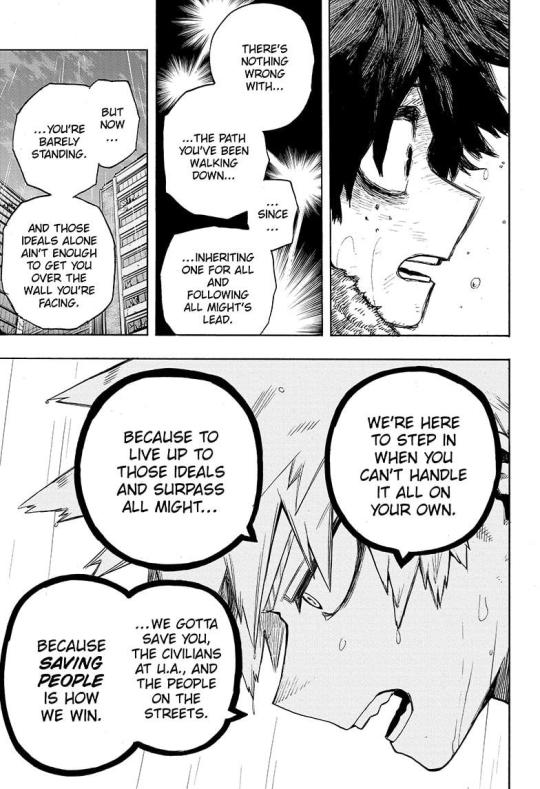
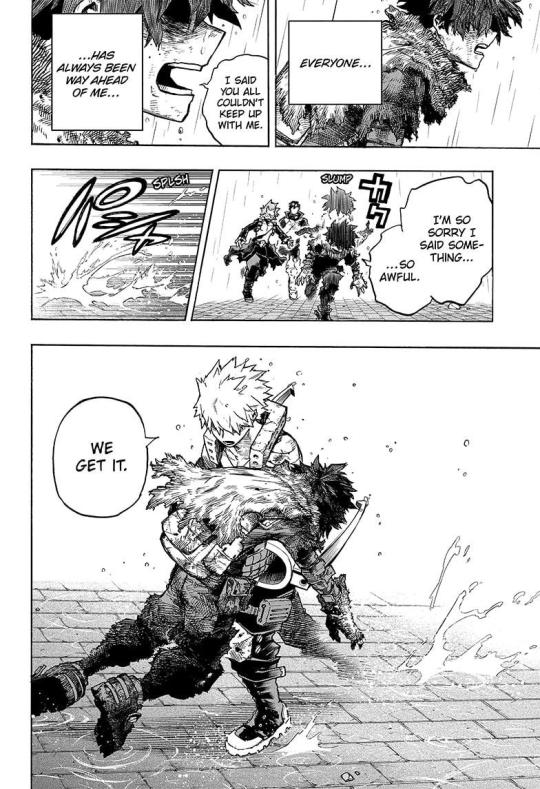
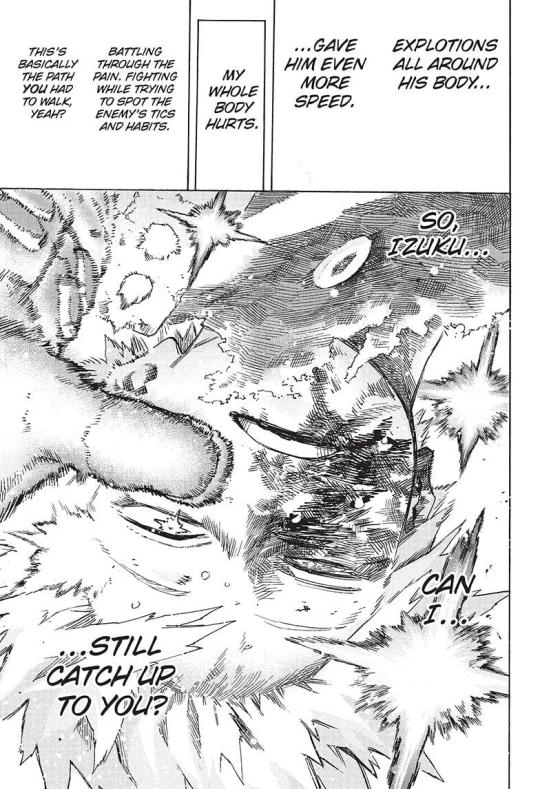
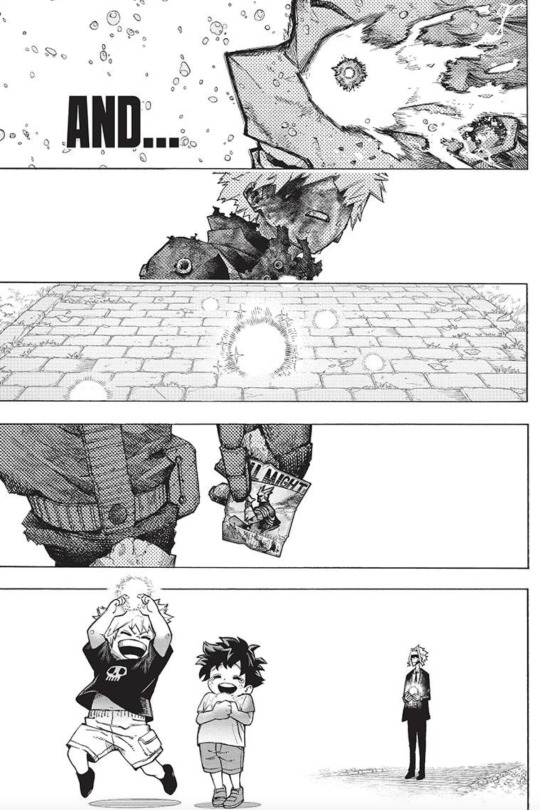
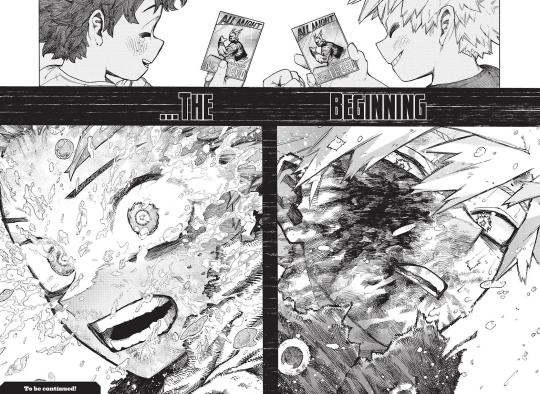
Izuku Midoriya cannot possibly have learned the fundamental lessons of what it means to be a hero without Katsuki Bakugou's character arc to supplement him. Katsuki Bakugou is an irremovable, integral player in demonstrating the theme of collectivism that informs the main story, not just for Izuku to learn it but for THE AUDIENCE to see it too. He is one half of "win to save, save to win." He is the standard shounen manga archetype who has to learn the value of teamwork/collectivism so that he can teach it to Izuku Midoriya and save him from himself. The story is structured in such a way that it resembles LESSONS for the characters to learn, and Katsuki's "education" in this respect is VITAL to the story, second in importance only to Izuku Midoriya's.

P.S. Is it actually taking away from Katsuki to call someone else THE deuteragonist?
Yes. I know some people don't want to have to say it that way, but it is. Based on a number of metrics, Katsuki Bakugou is most widely recognized as the deuteragonist. If there's a default answer to the question of who is the deuteragonist but you think the deuteragonist is someone else, then in order to be persuasive you must not only argue why you think your chosen character is the deuteragonist but why Katsuki Bakugou is NOT the deuteragonist. If you want to argue someone else is the deuteragonist, you are taking on that onus, that burden of proof. You have to disprove Katsuki Bakugou is the deuteragonist.
Are there other characters who fit the deuteragonist function at times? Yes! There are multiple deuteragonists! But if in spite of the multiple protagonists we're still able to call Izuku Midoriya THE protagonist of My Hero Academia, then we are absolutely able to call Katsuki Bakugou THE deuteragonist as well.
tl;dr MHA is about learning what it means to be a hero and Katsuki Bakugou's story is second-most important to that theme, which makes him the deuteragonist
#anon ask#ask pika#my hero academia manga spoilers#final showdown spoilers#katsuki bakugou#meta#deuteragonist#now just because i care does that mean i actually CARE?#no not really#think what you want you aren't doing anything to ME
114 notes
·
View notes
Text

alright! we got one whole person interested, so here's my hot take:
the first "how to train your dragon" movie is WAY better than httyd 2.

i know everyone loves like, the cool warrior mom design, the romance and the "epic animation moments" in 2... but can we for a moment be honest and say the whole "hiccup becoming a leader / which dragon is the Good Alpha" plot was dumb as hell? also, the villain sucked?
the original httyd is pretty good about keeping the structural problem grounded in real societal fears. namely, fear of the unknown and of beasts. it makes sense for any ol' village dealing with such a problem. it was intelligently designed around a solid premise.
httyd 2 is like. actually, dragon taming is a big thing, even outside berk. and theres a Scary Foreign Man dragon tamer who is bad and just wants power. it's okay to other him. being a good guy is about being a protector instead of an evil, power-hungry guy... which hiccup never was anyway... so no real growth there. just be good instead of bad. wow. what a theme. very thought-provoking.
people act like httyd 3 being bad came out of nowhere, but httyd 2 was the original sin to me. it totally dropped the societal themes in favor of generic good vs evil fights and "worldbuilding" - despite having no more interesting stories to tell.
it also kind of ruined hiccup for the sake of developing him. like. his whole thing is that he can't fight, so he has to find other ways to contribute to society. he's the anti-macho hero. which ends up being important in convincing the village that dragons can be peaceful. he's empathetic to the other, because he's been othered.
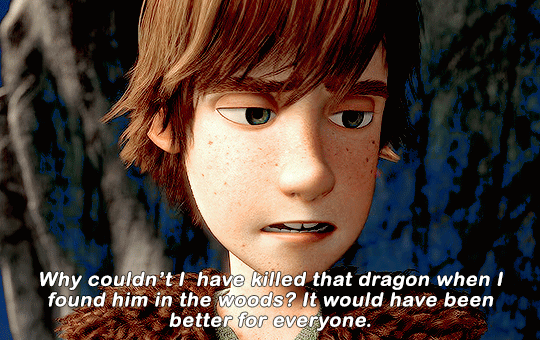
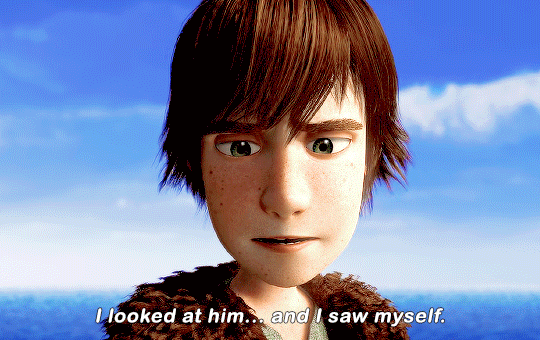
meanwhile in httyd 2, hiccup's like. Cool Warrior Man, who needs to step up and be the hero king when his dad dies. he can fight just fine, because he has a cool dragon to fight with. so he's just like any warrior, but one who fights with weapons instead of brute strength. aka most fictional warriors who arent just "the heavy."
the first movie isn't beyond criticism, obviously. the animation was a little meh compared to httyd 2 - i get why visually its seen as an upgrade. plus, httyd 1 also did the thing of having like a last minute evil dragon to defeat... but that wasn't the point. the POINT was the village and its fears. the POINT was overcoming that.

whenever people list why they love httyd 2 and consider it superior, its like... lists of details. like, look at the upgraded character designs, the cool flying scenes, the affection between hiccup and astrid, or the clever way hiccup's prosthetic leg is designed.
but these are film *details*, not fundamentals.
if you told me the sequel to httyd was going to have a much more generic story, ignore the themes of the original and makes its deliberately lanky and weak protagonist into Handsome Hero Warrior Boy, i'd be like. that sounds kinda bad. but the Animation Details (tm) i guessssss
i know hiccup is still "himself" in 2 to some extent, btw. he's an inventor, he's intelligent, and he initially tries to talk to the villain. but none of that ends up mattering. its arguably looked down on by the movie, which really, really wants him to step up to be the warrior king like his dad. aka a generic Hero Strongman.
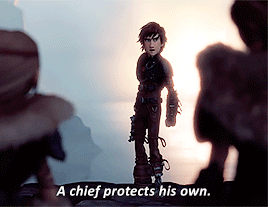
i'm not totally against evolving the themes of a work to fit new conflicts, btw. sequels should generally be different from the first movie. that's fine. that's expected.
but while the new conflict in httyd 2 IS born out of the results of the previous movie, that evolution feels very literal, not thematic.
namely, the evolution is "more people have dragons now." it builds the conflict from there. its based on worldbuilding, not on theme.
i don't think a very interesting evolution.
it kinda went from, in httyd 1: "the theme is fear of the unknown. how prejudice/ignorance manifests, educating oneself through compassion, the dangers of worshipping violent masculinity, and the importance of questioning what you're taught by society."
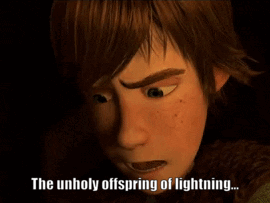
to, in httyd 2: "the theme is dragons. who has them? what they want with them? how can the Good Guy humans protect dragons from the Bad Guys? also, being a Good Leader means being a strong Hero Man who protects his friends," without asking any deeper questions related to the themes of the first movie.

and i'm like. guys. guys.
the theme shouldn't just be "dragons."
the theme of the first movie was NOT just "dragons." the first movie could've been about people being afraid of unicorns. or large birds. or unusually intelligent bears. it was not just about literal dragons, it was about societal fears and trying to overcome our base gut instincts.
i think this is what really plagues httyd 3: it builds on the themes of the second movie, not the first.
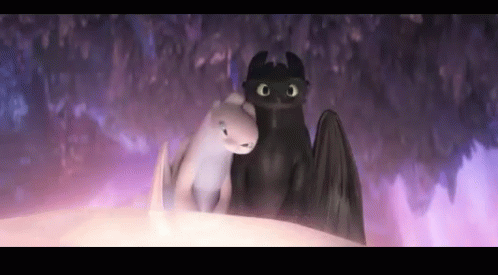
httyd 3 asks further questions that only really revolve around the literal relationship between humans and dragons. it does not understand any broader themes of what that relationship represents.
it clearly thinks its very intelligent for asking "what do the dragons themselves want?", but that question is not respected enough to be explored in any thematically coherent way.
the only real weight its given is the argument that there will always be "bad humans" out there, and so, dragons are safer in the wild. which sure is... an argument. but its a very "othering the problem" kind of argument.
it acts like its caring about the agency of dragons, but its not really. dragons were not actually portrayed as "oppressed" in berk society after the first movie, nor lacking agency. they were only at risk of "bad individuals", to which that solution is stupid. the racialized bad guy in httyd 2 didn't steal all his dragons from berk. he caught and subjugated them, mostly from the wild.

all while looking like... this, by the way. i feel like we don't talk about that enough. all the good guys are white nordics, while the only man of color is scary, domineering and cruel. in a series of movies that was once about having empathy for the other.
MAYBE if berk had been really oppressive towards dragons in httyd 2, we could've had a theme. maybe if they treated them like a dangerous commodity that must be tightly controlled despite their nominal acceptance and inclusion, we could've had a thematically tight 3-movie arc about like fear and oppression or whatever.
but that would require, yknow... making the movies be about broad societal problems, instead of just evil individuals. and only the first movie cares about making any real societal critique.
also, the solution in httyd 3 would've still sucked. these movies, in terms of writing, really decrease in maturity from 1, down to 2, to the plummeting depths of 3.
there is no relationship of oppression that is solved by completely segregating society and going our separate ways (httyd 3). just like there is no oppression that is solved just by defeating bad individuals (httyd 2). we have to learn to coexist as equals, to educate ourselves and be compassionate to the other. even if we're afraid.
that's the dream only the first movie kept in its heart.

#httyd#how to train your dragon#httyd 2#httyd 3#how to train your dragon 2#how to train your dragon 3#long post /#media analysis#media criticism#writing#ask to tag /#racism /
266 notes
·
View notes
Text
Since insomnia is kicking my arse of late, I naturally tilted into the thoughts about the nature of the 3-act structure and why S2 of OFMD may have felt off and incomplete to a lot of people.
I am fully in agreement that we lost a lot of valuable time with only 8 episodes and a lot of it did feel rushed, but for the amount of story and set-up and growth and development they needed to fit into 4 hours of television, they did astonishing things.
DJenks has said from the very start that this is a story that has been planned out to take 3 seasons. It's literally a 3-act play and we are currently right in the middle of the worst part of that timeline according to every traditional 3-act structure.
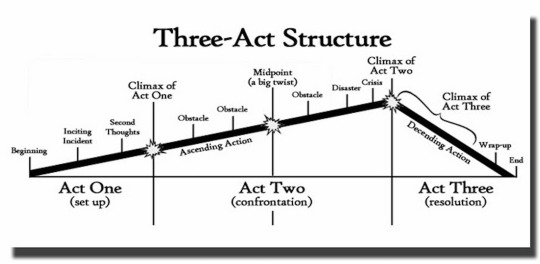
Act one/season one is self-explanatory. Like New Hope in the Star Wars Trilogy or Fellowship of the Ring, this is the set-up. We're introduced to our protagonists and antagonists, the relationships are given a foundation.
The beginning is Stede's journey to becoming a real boy. The inciting incident, the one that actually pushes his change beyond "playing pirates" is meeting Ed. The second thoughts come together in episode 8/9 after his confrontations with Jack and Chauncey and episode 10 is the climax.
Act 2/season 2 is never going to be as smooth and simple as act 1/s1. A big part of the A2/S2 job is set up for A3/S3 and this is what we're seeing and why a lot of story threads seem to have been left dangling.
Again, to call back to Empire Strikes Back and The Two Towers, the structure is much the same: the original batch of people are divided and scattered, the big enemy from A1/S1 is looming, new allies make themselves known. In SW, this meant the introduction of Lando and Yoda as allies plus the hint of the Emperor lurking in the background. In LotR, we have the Rohirrim, Gondor and the Ents as allies and the expansion of Sauron's forces in Helm's Deep, Osgiliath and the winged wraiths.
There's a clear trajectory following the A2/S2 structure:
obstacle 1 - the crews separated and struggling
obstacle 2 - the end of episode 2 and the repercussions of his actions
twist - just when things start to settle, the Ned Low situation happen and Stede kills for the first time
obstacle 3 - Ed's struggle with his identity leading to him leaving
disaster - Ricky's assault on the Republic
crisis - do-or-die battle because they have no other choice
climax - the last 15 minutes of ep. 8 live here.
As with SW and LotR, there's an ending, but weighted with the knowledge of a story that is meant to continue. Each of those act 2 films end with the heroes still aware of the looming threat, some of them heading out on new missions, and some of them resting and healing. There's brief pause, brief respite, a moment to take a breath.
We have all the characters in place now and the battle-lines have been drawn. Luke still needs to confront Vader (I see you, impending Ed and Hornigold confrontation), Frodo still needs to destroy the ring, Aragorn still needs to lead the army against the Black Gate, the second Death Star is still hanging in the sky.
I'm so excited to see what S3 brings because we have so many arcs ready to go: Zheng's vengeance trip, the inevitable enforced out-of-retirement arc for Ed and Stede, Hornigold, Ricky trying to maintain his tenuous control of the republic given how many of his people were killed when the crew escaped, the pirate rebellion gathering forces.
Also how often do we get shows/films where the supporting cast are given this much storyline? We have a named/speaking-role cast of upwards of 15 central characters. That is a staggering amount of people to work with, when most shows would only focus on the leads and a couple of their friends. Six is the average for most TV shows, while comedies can inch higher because ensembles, but most ensembles don't get as much as our crew did.
I know a lot of people aren't happy about Izzy's death. I know I would have liked to see him a lot more, because he's such a grumpy old bitch and I love him and him affectionately roasting Ed and Stede would have made my entire month. But I'm also aware that narratively, as a figurehead of the old ways of piracy and "we were Blackbeard", it was a symbolic death as well - a sign of the death of the old ways of piracy and of Blackbeard as was.
(Also, they Obi-Wanned him. I'm not over that. Gave him the "if you strike me down I will become more powerful" speech. I'm just... guys, your star wars nerdery is showing XD)
So while it was flawed in places and pacing, given the scale of the story they're telling, the number of pieces and characters they had in play, and the arcs they have been setting up while also still keeping the humour, I am giving a standing ovation for a remarkable piece of work.
384 notes
·
View notes
Text
Thinking about Zuko's influence on the audience's perception of Aang, specifically in Book 1. I kinda touched on it in this post but that post is pure unsorted rambling in which I didn't get to delve as deep as I wanted. Anyway, the relevent part was:
"With this whole episode, it's just the fact that Zuko is the reason we first get to see just how fucking cool Aang is. It's so easy to be like the others in the show and see Aang for his childish antics and sweet nature, but Zuko is the one that consistently reminds us, “No, this is the Avatar. He's powerful, he's brave, he's fiercely protective, and he deserves respect and acknowledgment for that.”"
Like, I mean, the point is redundant, everyone knows they are foils, so I'm not saying anything ground breaking when I say Zuko is often the one who brings out the best in Aang and encourages him to embrace being the avatar and that a lot of Aang's strongest charater moments are because of Zuko, yada yada, okay, we know, zukaang meta 101, nobody wants to hear it
But also, Zuko's opinion of Aang is so interestingly different from everyone else's. We get a view of Aang from the pov of himself, in which we see his doubts and struggles, the pov of the gaang, through which we see his antics and improvement and flaws. We also understand the opinion of the Fire Nation abt Aang (pure threat that's weirdly small), and we get plenty on the different opinions of the rest of the world.
If you took out Zuko's reactions to Aang, you'd feel like you know pretty much all there is to know about Aang. But to Zuko, Aang is an ever present mystery. The gaang doesn't really question anything abt Aang except what he can do and the rest of their enemies don't care to know things about Aang
But Zuko does. To Zuko, Aang is a source of constant questions, and this is sometimes played as a joke (i.e. "He must be a master of evasive maneuvering." to "You have no idea where we're going, do you?") and sometimes it hits the very core of Zuko's being and changes the course of the plot, (i.e. The Blue Spirit)
Zuko is unique because, to everyone else, Aang is one of two things. A Hero, or An Threat. He is neither to Zuko.
Zuko has no desire to defeat Aang. Aang is not a Threat to him. Hell, as Iroh says, Aang actively gives Zuko hope. But Aang is also not a Hero or ally.
He is neither a protagonist or an antagonist in Zuko's story. He's a goal. And that's such a unique perspective that allows us to question who Aang is from a neutral standpoint. Who is this person who effortlessly escapes trouble while having no idea what he's doing? Who is this person who saves someone they defeated? Who is this person who looks at an enemy and says 'you remind me of my best friend'?
Who else makes us ask these questions?
Through Zuko we, or at least I, see Aang as more than a person, and more than a hero, but as this unconventional conundrum that defies expectation at every turn, baffling and beautiful. Aang is so much more than your conventional hero and nobody sees or shows us that more than Zuko.
My favorite way to look at Aang is through Zuko's eyes.
#zukaang#atla#you know what other stories have a character whos 'a goal' to the protagonist#romances#im just saying#zukaang talks#talks#just came off a long shift#so Im not entirely sure this makes sense#but I cant sleep with zukaang thoughts#woodlaflababab
120 notes
·
View notes
Text
First-Order Archangels
Part 1: Maybe You'll Spot An Archangel
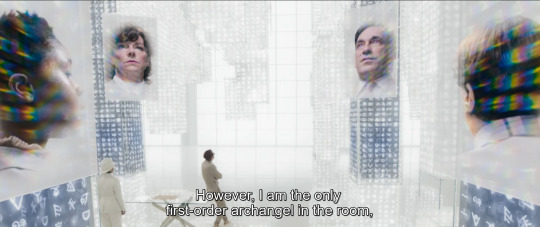
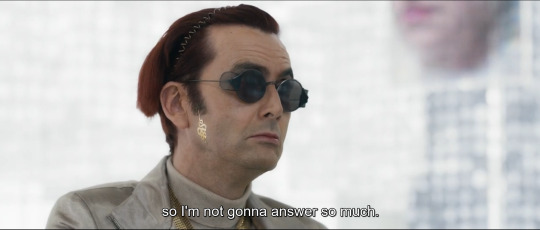
GABRIEL: I told you you could ask. However, I am the only First-Order archangel in the room, or, you know, the Universe, so I'm not gonna answer so much. But you feel free to knock yourself out with all the asking.
While I was writing my meta series The Passion Of Jimbriel it became fairly obvious to me there was something more going on between Crowley and Gabriel in S2 than just the numerous pointers to Crowley's pre-fall angel status. They are acting as both parallels and foils to each other, and in places you can swap their characters and get the same story at a different time – and that just opens up a whole new window of context and insight into things. For pre-reading, see this meta from @vidavalor that nicely lists some obvious parallels. It doesn’t mention everything though, so I’m going to discuss parts in more detail.
A foil is a character who contrasts with the protagonist, to highlight or differentiate certain qualities between the characters. Crowley and Gabriel do this because they have come from essentially the same place, and share some story elements, but they still end up in different places.
There is a lengthy original discussion about Crowley's pre-fall angel status here, for pre-reading. It points out the obvious and some not so obvious points that ops have noticed in S2 telling us about Crowley's pre-fall status. Rather than just go through them all again, I'd like to look at some other scenes in S2 that also tell us something about both the similarities and the differences between these two high-powered entities as I go along. In addition, I’ve done a series of posts looking at Gabriel as a shoulder angel (links at the end of post,) because quite often he’s on the demonic left-hand side – which makes sense when you realize he’s a Crowley parallel.
Take the arrival of Gabriel to Whickber St and the bookshop. I’ve already mentioned this parallel story line a couple of times now, but lets look at it again in more detail. It mirrors the opening of S1E1 where the serpent climbs the wall of the Garden of Eden, morphs into a demon and starts to converse with the angel standing on the wall.
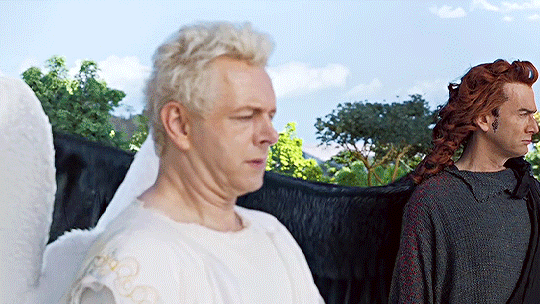
Back in the present day, we have a Gabriel, who also tends to present on the sinister-side, walking up to the gate of the present day Garden (the bookshop), which is still guarded by the same angel as it was 6000 years ago, and basically tells Aziraphale he has “fallen.”
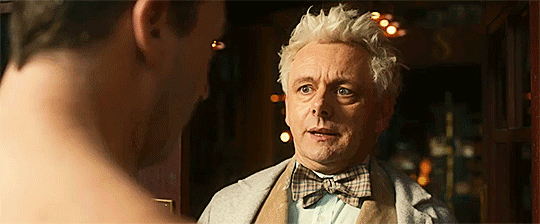
How to we know this? It is a reference to the Fall of Man, when Adam and Eve ate the apple the serpent offered them, they suddenly became aware of their nakedness, and hid from God. Gabriel has already upset the love-apple tomato cart on his way to the door of the bookshop, its a sign of the chaos to come.
The fallen angel is not sure of his name, so he prompts with a question…
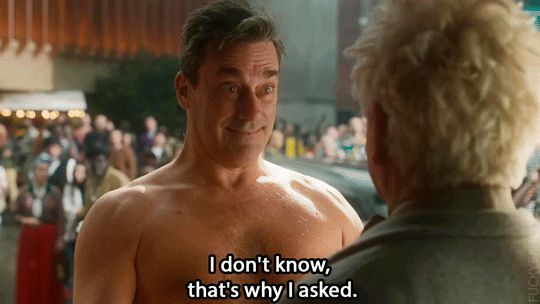
And asks for shelter under the (reluctant) angel’s wing..
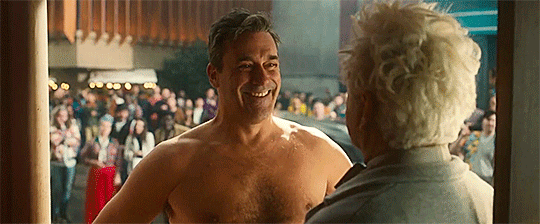
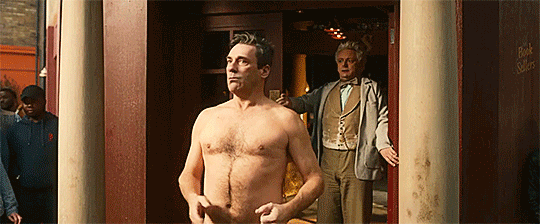
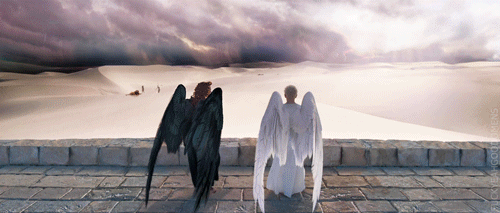
But there is one thing he does know, the one thing that drew him to Aziraphale in the first place:
AZIRAPHALE: Then why did you come to my shop?
GABRIEL: I don't know. I just thought I should. You know what it's like when you- when you don't know anything at all, and yet you're totally certain that everything would be better if you were just near one particular person?

Later, Aziraphale realizes that he must give Gabriel a new name to hide him – because fallen angels take on a new name, don’t they? Just like Crowley did.
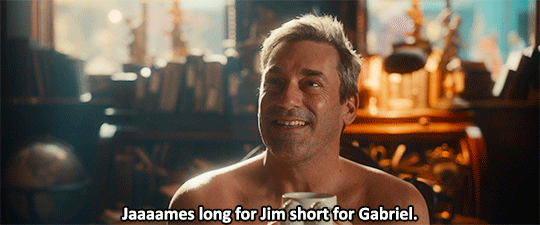
Then we get a confession:
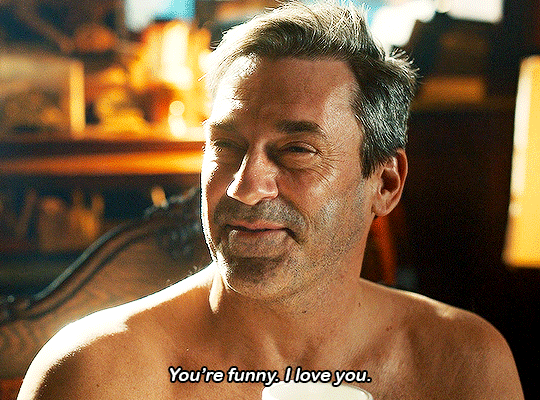
Which is what Crowley loves about Aziraphale as well - that bit of unpredictability, because you know how humour kind of works? It throws the unexpected at you.
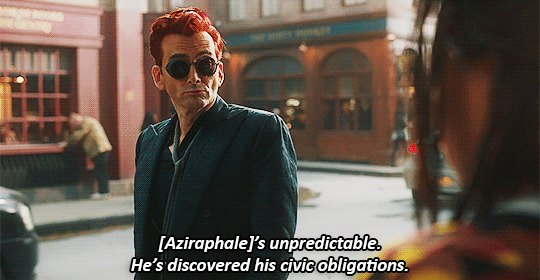
Early on in S2 we find out they are both in trouble: first His Royal Smugness, then Our Hero himself. Our view is turned upside down, with the angel made the bad guy and the demon the good guy who needs to win. But both of them are being hunted by Shax.
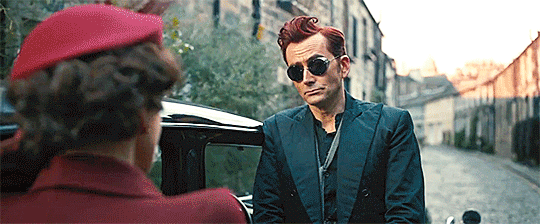
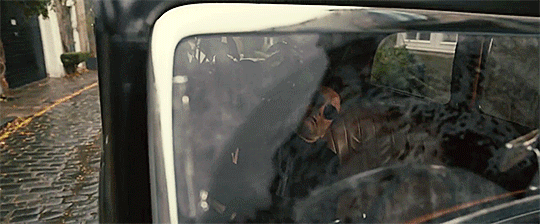
Then we get one of the early clues pointing to Crowley's high status as an angel:
SHAX: A miracle of enormous power happened last night. The kind of miracle only the mightiest of Archangels could've performed.
CROWLEY: Mm?
SHAX: Somewhere very close to your friend's bookshop. Are you telling me you don't know what caused it?
CROWLEY: How'd you know I didn't do it?
Shax stalks and threatens both of them, sometimes at the same time:

Another parallel Gabriel and Crowley shared in S2 were associating their identity - no, lets rephrase that - "essence" was one description I've seen - with boxes.
Gabriel arrives with a box that strategically covers his front, and quickly tosses it aside once Aziraphale opens the door to the bookshop. It lies forgotten until Gabriel mentions it a while later. Inside it is the fly from Beelzebub - an object from Hell - so it really needs to be 'invited' across the threshold of the bookshop by Aziraphale to be able to enter. The box initially appears to be empty, Once inside, the fly is free to roam. It has a message written on one side of it.
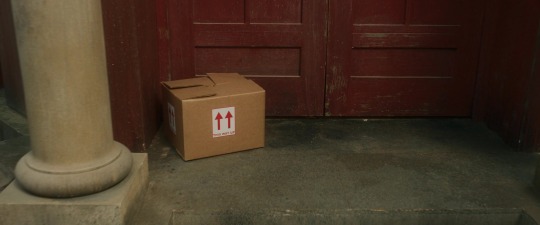
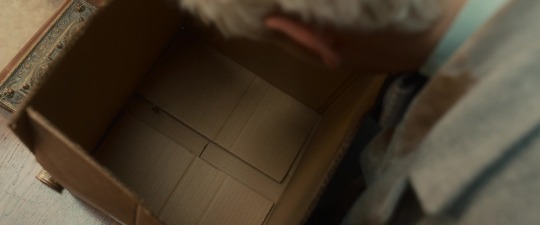
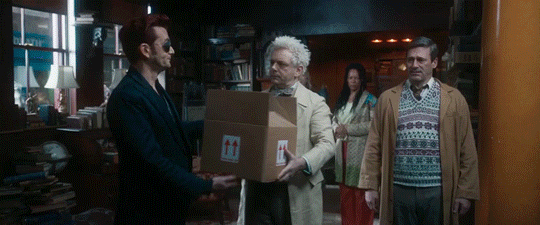
The same goes for the matchbox. Message included.
ah, wot? you say. Yep.
The matchbox represents Crowley, probably in more ways than one, but I'll just go through the stuff relevant to this meta here.
I notice I'm not the only op to connect the line from the Book of Job on the side of the matchbox with Crowley. The line is from Verse 41, which talks about Leviathan. Among the various shapes it is described to take is a great sea serpent. This deserves its own meta for further discussion, which I plan to do after this one, because yes, Crowley is Leviathan in disguise, but there is much more to it than that. But for now, just know that the matchbox is Crowley.
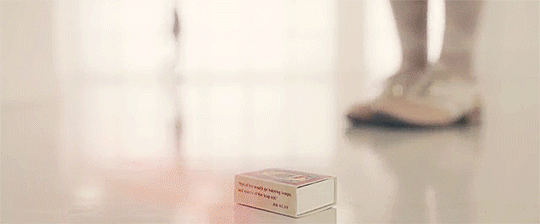
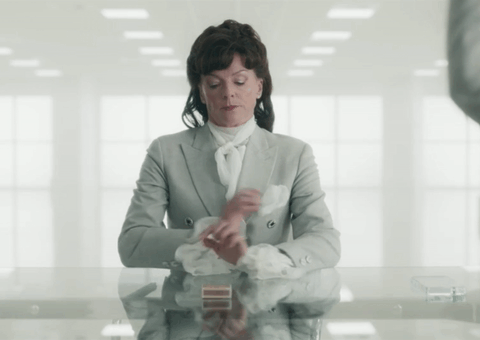
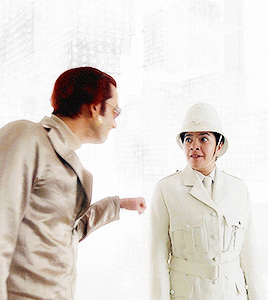
Once you know this, it makes sense that Muriel finds it - a discarded cardboard box by the front door to Heaven - and deals with a material object that shouldn't by rights exist in Heaven. Then a certain demon finds Muriel lurking outside during the siege on the bookshop at the end of S2E5, and talks them into letting the certain demon be escorted up into Heaven where he doesn't belong, where he's free to roam around - only he needs a guide because he's not sure where to go. Ah Muriel, you poke the Serpent, he's going to poke you back. Good thing he likes you, and it just was a gentle nudge.
Two empty boxes, two cases of memory-loss. That is what S2 seems to suggest to us at first glance.
Gabriel's seems to be the most straight forward in hindsight - find the fly and restore Gabriel to his original "Gabriel-ness." But its more complicated than that. When pushed to remember, his lilac eyes return and another voice can be heard speaking through him of the past. This happens twice, with the second one being part-prophecy. What is really triggering these episodes of channeling? Is it God or someone else speaking through him? We really aren't sure at this point in time.
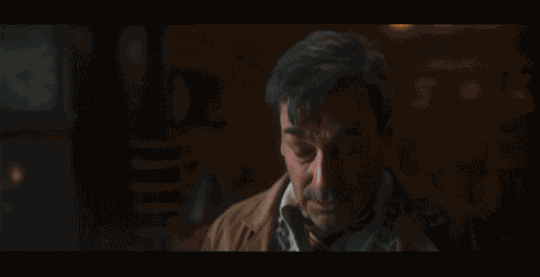
Then there are questions around Crowley's memory. Did he have his memory wiped when he fell? Was it wiped repeatedly? Was it not wiped at all, and he just pretends he doesn't remember? Neil has even said he is an unreliable narrator about his own Fall, so who are we to trust at this point? Crowley does seem to understand in the end some of the problems Gabriel is having with his absent memories and that brings them to a temporary truce.
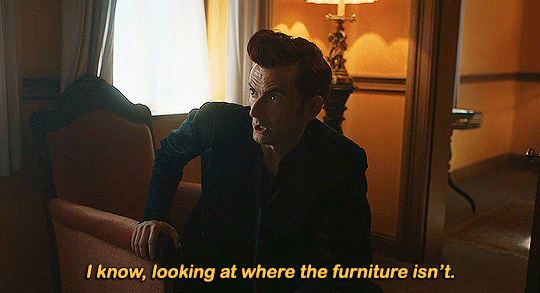
Both Aziraphale and Michael inspect their respective "empty" boxes, and neither notices anything obviously amiss. Gabriel's box just seems empty to Aziraphale, he takes no notice of the fly container in there, and archangel Michael tentatively inspects the matchbox brought to them by Muriel but nothing seems out of place there either.
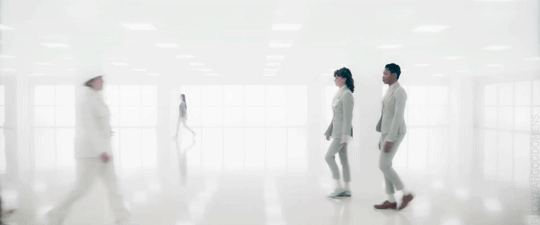
Crowley's change in costume in Heaven during his little infiltration caper with Muriel is also another clue to his past status as an archangel. He has a silvery-gray suit, similar in style to Saraqael's to reinforce the link with them, but at the same time he is also mocking the other archangels and their elite status. We've assumed for a while now that the appearance of the tactical turtleneck signals that Crowley is up to something sneaky or spy related, but I'm starting to think it also relates to a bit of a power play (and Crowley certainly laid the power on for Mr Brown in the pub!) Looking back at S1, Gabriel's not adverse to wearing one either when he needs to be at his worst (or best. Your choice.)

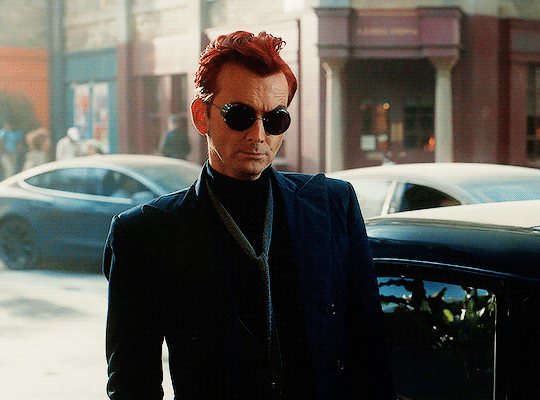
The way one dresses is a way of expressing and reinforcing authority, and its something both Gabriel and Crowley do without much thought. They have been used to being in a position of power and/or independent authority for much of their existence, and I would say that even if Crowley is a few steps down now from where he started, and he's more cautious around those higher ranking than him than he used to be, he still retains that knowledge of what its like to be at the top.
Crowley's usual near all-black costume is a form of power dressing in itself. Whether is was in the past, when black was an expensive color to buy and maintain in clothing, or in the present day, we are still respectful of those in a stylish cut of black.
Gabriel's impeccable tailoring as Supreme Archangel also commands respect. So it's no wonder that one of Gabriel's first requests on regaining his memories was to ask for new clothes! He wasn't just being the vain archangel we believe him to be (although, I think there is still some of that) you also need to consider the elements of the reference characters that went into his shop assistant character: Granville, the belittled shop assistant nephew from the sitcom Open All Hours, who got stuck with all the shop duties from his uncle and felt like life was passing him by, and the silly Monty Python gumbies, that complained of hurting brains - lovable and much loved characters, but not ones you'd really want to be forever. We all want to be loved, but we want to be respected as well.
For all his fierce posturing around Gabriel, there is a brief moment in S2E3 where Crowley backs down and treats Gabriel as an equal - and that is reflected in a change of dress as well. His outside jacket off and sleeve-garters on, Crowley sports a look we haven't seen since S1 when he was home alone in his Mayfair flat. He patiently explains gravity to a curious Gabriel and then describes his "Operation Lovebirds" plan to his puzzled companion. He admits he hasn't "done weather in ages." It's just a quiet, charming moment, watching two ex-archangels get along together.
You're smiling, aren't you?
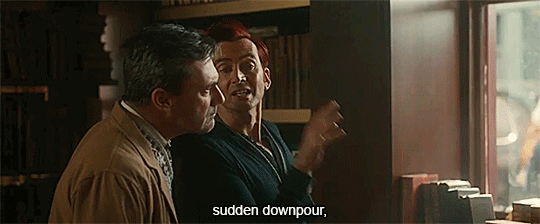
This meta continues in Part 2: Foils of War, where the differences between Gabriel and Crowley get explored in more detail, and how Aziraphale and Beelzebub act as mirrors to each other a few times as well.
This meta is part of a series on Gabriel:
Gabriel as a Shoulder Angel: S1 Study
S2 Study Part 1: Ep.1 The Arrival and Ep. 2 The Clue
S2 Study Part 2: Ep.3 I Know Where I'm Going and Ep. 5 The Ball
S2 Study Part 3: Ep.6 Every Day
First-Order Archangels Part 2: Foils of War
First-Order Archangels Part 3: Seeing Eye to Eye
#good omens#good omens 2#good omens meta#crowley#gabriel#the only first-order archangel in the room#or you know the universe#aziraphale#garden of eden#fallen angel#his royal smugness#how will our hero cope#maybe you'll spot an archangel#book of job#vavoom
172 notes
·
View notes
Text
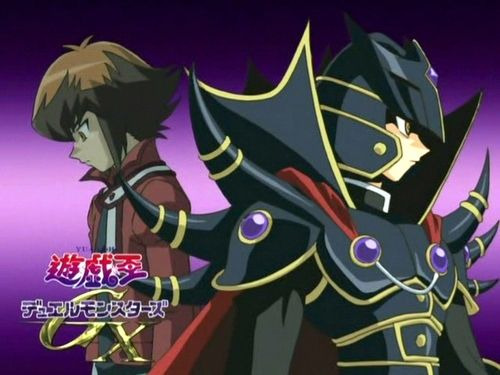

The Supreme King Judai vs. Dark Deku: How To Do a Dark Deconstruction of your Shonen Hero!
Think of this as less me complaining about My Hero Academia, and more me taking a closer look at the writing of the Dark Deku arc and why it failed to achieve what it set out to achieve.
I like to look at writing on a deeper level than Thing Bad, and Thing Good. Imagine a story is a car engine that won't start, in order to find the problem you've got to disassemble all the pieces and look at them one by one to see what pieces aren't working. That's the kind of criticism I'm talking about, break storytelling down into different tools like parts of an engine, plot, world, characterization, ideas, actions and consequences and then look if the author is using those tools effectively to sell a story.
In other words we're talking about the difference in ideas and execution. All works of fiction have ideas, even bad anime can have good ideas inside of it. The idea in question is Judai's case is can exploring the dark side of a hero. Can a hero's positive qualities also lead them down a dark path? Yu-Gi-Oh Gx answers this in a satisfying way, and My Hero Academia I'm going to argue does not.
IDEAS VS EXECUTION
One piece of writing advice I heard from Brandon Sanderson of all people that always stuck with me is "Ideas are cheap. You can always come up with more ideas."
All works of fiction have ideas and themes no matter what the Game of Thrones guy say, but some works are better at communicating their ideas than others. I want to quote a Homestuck Ending analysis of all things to explain what I'm talking about.
When you are a writer you can write anything you want. But if you want to write a story that people want to read you have to follow the rules of good storytelling.
There are reasons why storytelling rules exist. A story is a bond between author and reader, readers to other readers. It is a communication between humans and humans work in a certain way.
Storytelling rules are rules of communication. Rules for handling expectations and saying what you intend to say without it being misheard. Rules for tugging at emotions and pulling heartstrings in a good way rather than a bad way. Storytelling rules are lessons learned by authors of the past that failed to communicate what they needed to. They are not that subjective.
Chief among these rules is buildup and payoff. In fact one of the most basic techniques of storytelling is foreshadowing, in screenplays you usually foreshadow one important twist, then add a reminder so the audience doesn't forget, before finally paying it off.
To simplify build up and pay off I like to refer to it as question and answer. Usually a story will ask its audience a question, and usually by the end that question is answered, unless the point is to leave that question unanswered / ambiguous.
Character arcs are examples of buildup and payoff too, a lot of characters, especially in serialized media are sold on their potential future development. Here's an example, how may people got invested in Dabi years in advance because of the Dabi is a Todoroki Theory? That's an example of good buildup and payoff, because the author sewed just enough hints to build up an audience expectation and then paid it off. People became invested in the story, because they thought their investment and theories would pay off eventually and it did - so hooray!
Both MHA and YGOGX dedicate an entire arc to trying to deconstruct their main protagonist. They also seek to deconstruct the "Hero Complex" or "Saving People Complex" that each protagonist has, and ask the question if those traits are really a good thing.
This post puts it better than me so I'm going to quote tumblr user rhodanum.
‘Hero complex’ or 'saving people complex’ — an obsession with rescuing people in the face of danger, often to the exclusion of all higher thought processes. All too prevalent among shounen main leads, especially hot-blooded shounen main leads. Yuki Judai is certainly no exception. What is interesting in his case is that the writers follow the consequences of his rash, reckless, often thoughtless actions all the way to their heartbreaking logical conclusion.
For those not fully in the know, it involves spiky black armor, an army of sycophants and a fall from grace that caused as much damage as a thermonuclear bomb. Don’t make perky, happy shounen protagonists snap, people. First rule.
I'm going to quote another video too, to add onto the above quote. It's from this video, starting at around 39:52
"GX is kind of famous among fans for taking its happy protagonist and stripping him down to all of his worst qualities. And that's fun. So Judai is a character who's really interesting. He's definitely open to a lot of interpretation, and you know we're gonna be leaning on my interpretation of him. Sorry. It's my video. I think he's commonly referred to a "very typical shonen protag" probably one of the most shonen protag of the yu gi oh protagonists. He is headstrong and loud, and (makes punching noises while air boxing), he is a type of character who's like I'm gonna be the best and brings everyone along on the ride. He's the kind of protagonist that everybody loves him they're all fighting over him, and Yu Gi Oh Gx really puts him up on the pedestal, of like THIS GUY. THIS GUY DOES IT ALL. Then season 3 rolls around and dares to ask: but what if that's selfish behavior?"
That's the question both MHA and YGOGX are asking in Dark Deku arc and Season 3 respectively, what if all of those behaviors that make them the typical hot blooded shonen protagonist are actually selfish? Is their hero complex really a good thing?
Each arc is tasked with exploiting the main character's flaws, until they reach their emotional breaking point and lowest point in the story. Let's see how each story treats their main character and from comparing that I want to make a point about what makes effective storytelling.
The Supreme King Haou Arc
Instead of recapping the entire arc to you, I'm going to touch upon what ideas the story setup in regards to Judai's character and how it paid off those ideas. What are the questions the story asks and what answers does it give us?
I'm going to focus on the two questions I outlined above. Is their hero complex a good thing? and What if this is selfish behavior?
Yu-Gi-Oh GX is an anime where instead of using super powers, the main characters fight each other with a magical trading card game. Besides that fact there's a lot of similarities between GX and MHA. They both take place in an academy setting where the main characters learn about using their quirks, and playing the card game better respectively. It is a shonen battle anime where almost everything is solved with a shonen fight, they just use cards instead of flashy superpowers. The main characters are all students who have to grow up and enter the adult world.
Judai and Deku are both characters that deconstruct the "hero complex" of shonen main characters. Judai is themed entirely around heroes, he has an elemental hero deck where every hero is based off a hero that appears in popular culture, he is the best duelist in the school and the one everyone calls on to save the day over and over again. As stated above he is the most Shonen Protag to ever Shonen Protag, he's a warrior therapist who makes friends and saves the day because he's really good at the card game, and will always show up to fight for his friends.
For the first two seasons Judai is built up on this pedestal of the ideal Shonen Protagonist, and praised by basically every single character for being "childish" and "pure of heart" however when Season 3 comes around the narrative stops heaping endless praise on him and starts to challenge him. However, this doesn't come from nowhere there are signs of these personality flaws of Judai, they just get swept under the rug the first two seasons.
There are several moments such as the climaxes to season 1 and season 2 where Judai fails to grasp the stakes of the situation, saying things like "Oh, this card game is really fun" when he's dueling with lives on the line. Judai in fact has a pattern of "only wanting to duel for fun", he fights because it's fun to him not because it's the right thing to do. However, he's continually forced into high stakes situation where he has to fight for others just because he's the strongest character - and constantly having to carry that on his shoulders starts to weigh on him after awhile. Judai will show up to fight and save his friends every single time they need him, and that's the source of his hero complex because after a certain point his friends start relying on him too much.
In general he also doesn't have deep thoughts of what heroes are, he admires heroes but it basically boils down do "Heroes are cool." He's kind of like Goku where he doesn't really fight for any idea of justice or to save others, just for the thrill of fighting itself. He also has a tendency to be insensitive to other people's feelings and take things for granted. For example, in Season 2 like three of his friends get possessed and Judai doesn't even do anything about it for half a season because he's too busy participating in the dueling tournament.
In general though it's a pattern of Judai only wanting to "duel for fun" and him being forced to duel to save others instead, and be responsible for other people. Judai will show up to fight for his friends, but even then he falls back on just "dueling for fun" because always having to fight for others is too much responsibility to put on his shoulders.
There's a lot of hints of Judai's flaws, but they also tend to get brushed off because shonen protagonists are just like that. Like, Judai can say some insensitive things to his friends sometimes and be oblivious to their feelings, well he's just a book dumb shonen protagonist. Judai should be taking this fight seriously, well he's just being a happy go lucky shonen protagonist, etc. etc. A lot of these things are also just swept under the rug as him just being a child, a boy-at-heart like most shonen protagonists are supposed to be.
However, season 3 starts looking at Judai not as a shonen protagonist but as a person, and it all starts with the suggestion that maybe Judai remaining a child at heart is a bad thing, especially when his friends around him are all growing up. It all starts with the introduction of this guy right here - Johan Anderson.
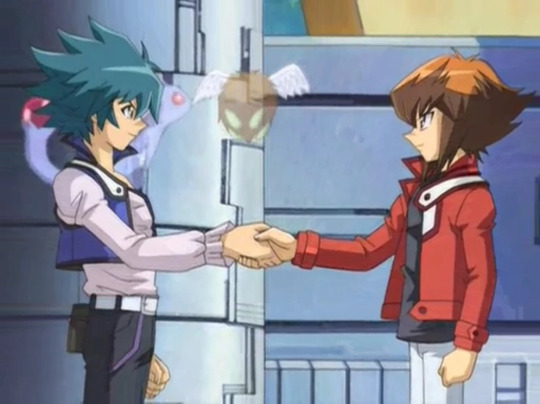
Johan shares many things in common with Judai, he can see spirits, he's a duelist who loves to duel, he has a strong connection with his cards. However, the more you compare them the more you notice that Johan has a lot of things that Judai lacks. They are so similiar that they become almost instant best friends, but even then Johan himself notices there are a few things off about Judai's behavior.
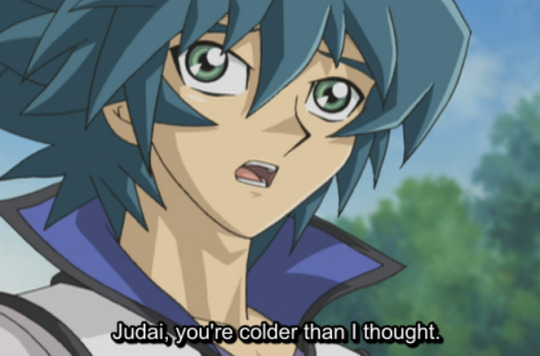
Sho: Bro... I thought you would have something to say to me.
Johan: He seems lost. I think he just wanted you to give him some advice.
Judai: SHo will be fine.
Johan: Judai, you're colder than I thought.
It takes someone completely new to the dynamic between Judai and his friends, who likes Judai but hasn't spent the past two seasons idolizing him to realize that some of his behaviors are kind of off. That Judai isn't really the most empathic, or even that good at understanding other's feelings.
Johan is the one to point this out because he has the emotional intelligence that Judai lacks. We've been told Judai is our shonen protagonist for two seasons, only for the real shonen protag Johan to step up out of nowhere and show them how it's done. Johan is good at seeing other people's emotions, and he becomes a near instant pillar of emotional support for Judai. More than that, he also is the first person to treat Judai like an equal, he never asks Judai to save him like all of Judai's friends do, if anything they both save each other.
Johan also exists to show what Judai is lacking, mainly a reason behind why he fights.

Judai: I do it because it's fun. Or because of the surprise and delight, I guess. Well, I guess that comes down to "because it's fun", huh? Sorry, I guess that's an awkward question to ask out of nowhere.
Johan: What's wrong, Juadi?
Judai: Nothing, really.
Johan: I have a proper goal.
Judai: Don't tell anyone. Even if people don't have the power to see spirits, they can still commune with them. That's why, for those people as well... (I want to be a bridge between humans and spirits).
Judai is someone who will always show up to save his friends when he is asked, but he doesn't really have a concept of what being a hero is or the repsonsibilities it entails, he just admires heroes in a pure hearted way. Johan on the other hand has a reason to fight and that's to help humans and card spirits get along, and Judai expresses admiration for Johan because he has a goal.
At the same time this is happening, Judai gets picked apart by two villains for his lack of reason for fighting. Judai has been praised to death for two seasons for being pure of heart, but now the villains are challenging him by saying he has no "darkness of the heart". That without it the reasons that Judai fights are superficial and frivolous.
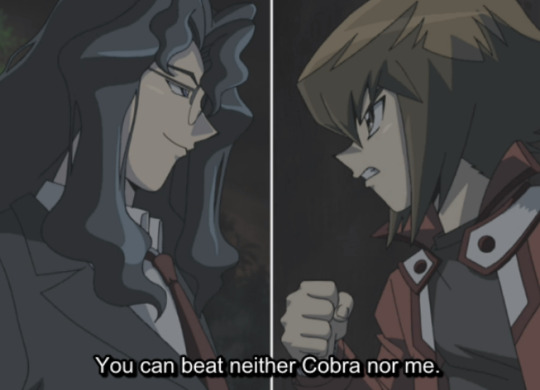
We have something that you lack.
Judai: That I lack?
Yes the darkness of the heart that slumbers deep within a duelist. The burden that a duelist bears in his heart. Judai, you have none of that.
Judai: A burden in my heart.
I have nver, not even once, dueled for myself. I doubt someone like you, who only thinks of himself could udnerstand that.
Judai: What would be fun about a duel like that?
It isn't fun at all! You must bear other's expectations while remaining strong. That is what it means.
Judai is a bit of a blood knight, he will be dueling with his friends lives on the lines and stop to go "Wow, this duel is really fun" and it's usually just dismissed a shim being a shonen protagonist until suddenly it isn't.
I'm gonna draw a deliberate parallel between Deku and Judai here that I'll reference later on, they both don't understand "darkness of the heart" and they need to understand it in order to grow as people.
There's also the underlying notion that being a hero is not all it's chalked up to be, to be a hero, to fight for other people's sake means also taking on their suffering. As noble as that may seem suffering is suffering.

Cobra: Fortune would never smile on a fool like you who fights while prattling on about enjoying duels.
Cobra: You are certainly a talented duelist. But you have one fatal flaw.
Judai: A fatal flaw?
Cobra: Yes, your duels are superficial. Someone who fights with nothing on his shoulders, cannot recover once he loses his enjoyment. What a duelist carries on his shoulders will become the power that supports him when he's up against the wall!
Cobra: But you have nothing like that! Those who go through life without anything like that cannot possibly seize victory.
Cobra: But I know that nothing I say will resonate with you... because you have nothing to lose but the match.
Judai: I...
Cobra: Afraid aren't you? Right now, you have nothing to support you.
In the context of this scene, Cobra has told everyone that he's currently enacting his evil plan out of the vain hope that he can somehow revive his son from the dead.
As insane as "I think I can revive the dead" is as a motivation, fighting for the sake of your dead son is a much stronger motivation than "I think duels are fun."
Judai doesn't have an appropriate answer as to why he fights when he's questioned by the villains, and instead of coming up with his own answer he relies on the answer Johan provided for him.
Johan: You idiot. Why are you so shaken Judai? You think you have nothing on your shoulders? Give me a break! You always bear other's expectations on your shoulders. When you have other people's expectations riding on you, it means they've trusted you with their hopes! Don't you always carry those? If you lose what will happen to us here?
Johan's words snap him out of it, but this isn't Judai coming up with an answer himself it's just taking the one that's provided for him.
This is also the point where we get start to develop an answer to our question. Is Judai selfish?
In action he's not. His actions are selfless. Judai is always fighting for others, even when he only wants to duel for fun. He will show up and fight if you ask him too.
However, in motivation he is selfish. His motivations are selfish. Judai isn't fighting out of some selflessness, but because fighting for the sake of other people gives him a purpose. He keeps fighting for his friends, because he's built all of his friendships around being the one to solve their problems. It's why he Johan's answer suits Judai so well, because he thinks that's how friendship works that he has to keep carrying everyone's burden for them.
Not only does it lead to unhealthy friendships (he sees his friends as burdens) but also it's unhealthy for Judai himself (he can't keep carrying other people's burdens without getting weighed down).
Judai's hero complex, this pressure he feels to save everyone around him arises from two things, it gives him friends when he'd been a lonely child before that, and it gives him purpose. Playing the hero is how he made all of his friends, and now it's how he keeps them.
However, in spite of doing all this to keep his friends, Judai's relationship with his friends is so all give and no take that he's practically fighting alone until Johan shows up. Judai doesn't form a healthy and stable relationship with Johan however, Johan just becomes a crutch.
In Summary:
Judai's actions are selfless.
His motivations are selfish.
Judai's purpose is to carry everyone's burdens on his shoulders.
Judai's friends exist to be saved by him.
The following arc is roughly divided into four sections. Everything I've covered above happens in the first section the Cobra Arc.
Cobra Arc
Zombie Survival Arc
Dark World / Supreme King Arc
Oh Shit, Yubel's Back
The cobra arc is the introduction and it sets up the basic ideas of Judai's character that I listed above, in addition it focuses on the question of if Judai is selfish, and the idea that being a hero is a burden. There's also the third question where Judai is called to understand darkness of the heart, something Deku will also be called to do.
The Zombie Survival arc is an arc where the school is teleported to another dimension and they have to survive for several days with a limited food supply, everyone fighting, and an outbreak of zombies.
The main setup of this arc is to show how everyone is working well together as a team, even in a high stress situation. Alexis, Judai, Misawa, Kenzan, all pull together with the help of new students Johan, Austin O'Brien and Jim Crocodile Cook.
However, I'm brushing over this arc because Judai doesn't actually do much this arc. If you analyze who does what, it's mainly Johan and Austin O'Brien who are in charge of the entire school. Johan demonstrates leadership skills, calls on everyone to pull together in a time of crisis, and most importantly emotionally supports Judai all throughout.
Even when Judai is confronting the main villain of this scenario Yubel, it's Johan who shows up to support Judai, and it's Johan who wins the duel at the sacrifice of his own life. Everyone gets through the zombie arc unscathed, but it's because Johan is the hero of this part of the arc, not because of anything Judai really did.
Judai who having gone on so long carrying other people's burdens to the point where he's made saving others his purpose, has for the first time experienced someone helping him carry those burdens only to disappear and Judai does not react well to it.
This is when the story has finished setting up all the dominoes that are about to fall. We have one mini-arc drawing attention to the dark side of Judai's personality and how he doesn't understand his own darkness, and one mini-arc showing Johan being a much more effective hero and leader than Judai, demonstrating everything Judai lacks.
You Either Die a Hero, or You Live Long Enough...
Yadda yadda you know the rest. A character being undone by the same traits that made them a hero, is classic tragedy 101. It's called the Hamartia or the fatal flaw. A character's greatest strength in some situations can be their greatest weakness in others. The Supreme King Arc is a masterclass in showing how the traits Judai had that led to his success in the first season, can lead to his total ruin, and even to him becoming the villain of his own story.
Hero and Villain are much closer than you'd realize, and this becomes especially true in the relationship between Judai and Yubel. Judai shares an extremely close relationship to his antagonist foil, just like Deku does with Shigaraki.
However, in Judai's case he's the reason that Yubel turned evil. While it's not entirely his fault, Judai's decision to abandon Yubel when he was a child, made Yubel go through ten years of painful torture all alone, which is the reason behind their current madness.
To summarize Yubel and Judai's story briefly. Yubel is a card spirit, the thing that Johan wants to serve as a bridge between card spirits and humans. Judai had an incredibly close relationship with Yubel as a child, but Yubel was overprotective and used their powers to harm anyone who came near Judai. Judai launched Yubel into space hoping the righteous space rays of justice would calm Yubel down (I know that sounds stupid just go with it) but instead Yubel was hit with the light of destruction a corrupting force that made them endure years of torture. They called out for Judai's help in their dreams only for Judai to eventually forget about them with a psychologist's intervention. Eventually the satellite they were trapped in made it's way back to earth, and they almost died burning up on re-entry. When they finally crawled their way back to Judai, they found Judai had been living the past ten years happy and surrounded by friends, while they had been tortured in space and nearly died all alone.
At which point Yubel snaps, hard.
While it's not Judai's fault entirely because he was a child and he didn't know what was going to happen, he still made the decision to abandon Yubel and stuck them in that situation. Judai's actions creaeted Yubel, and now Yubel is here broken and hurt and determined to hurt all of Judai's friends.
Judai doesn't know how to cope with the guilt or responsibility for either of these things. Both for creating Yubel, and for the fact that because of Yubel Johan might now be dead.

I'm the one who made her what she is!
This is where the show starts demonstrating that understand in darkness of the heart is necessary, because Judai can't understand two things, number one the fact he might have hurt Yubel, and two how to deal with the sense of responsibility he feels towards Yubel becoming what they are, and for Johan's apparent death.
He just feels a lot of guilt, and as someone who's only been the carefree hero up until this point he doesn't know how to deal with that guilt.
Judai makes a very similiar decision to Deku. He decides to go out and hunt for Johan by himself, leaving his friends behind so he won't risk their safety. Unlike Deku however, his friends immediately follow and insist on coming along.
This is when the problems start appearing, because the second everyone enters the Dark World to look for Johan, the show starts demonstrating clearly how different Judai's leadership is from Johan.
All of Judai's flaws start popping up, he's tactless, self-centered, and doesn't consider others feelings, and most importantly of all he doesn't look before he leaps. These behaviors that could earlier be swept under the rug, just become aggravated in a high stakes situation where everyone's lives are on the line. Judai came together with everyone to look for Johan, but he keeps acting like he's alone.
Another user's meta post here summarizes Judai's actions in the Different Dimmension, more succinctly so I'm going to quote them.
Shit Judai’s friends signed up for when they went into the Different Dimension with him:
searching for Johan
working as a team
deciding as a group what risks they’re willing to take
risking their lives together, on an even playing field
Shit Judai’s friends didn’t sign up for when they went into the Different Dimension with him:
having their input thoroughly ignored
being left behind while their friend recklessly charged ahead
having essential information kept from them (Judai didn’t tell them about the fatal consequences of dueling in Dark World)
being kept from dueling without their opinion on the matter ever being taken into account
having their physical, mental and emotional well-being be completely ignored by the de-facto group-leader
being relegated to secondary importance in comparison to Johan, in Judai’s eyes
having their group leader outright break the promises he made to them
To name a few things Judai does while in the different dimmension. Almost immediately after entering the dimension he runs away from the rest of the group, forcing Austin O'Brien to follow before anyone has even gotten their bearings or investigated where they are. Make an agreement with everyone to rest and wait for Dawn to search for Johan, only to run off into the middle of the night without telling anyone. Run off ahead of the group leaving several of their members behind, and when O'Brien tells Judai that members of their group are missing and that he should go back and search for them, Judai asks O'Brien to just do it instead.
Judai doesn't see the flaws in this behavior because it's how he's been acting all along, he always runs off into danger head first and he always fights on his own. Judai's never been good at considering the feelings of others though because he's a tad socially impaired, so he just doesn't seem to notice everyone's growing concerns with how he's acting.
Once again we are asked the question, is Judai's behavior selfish?
Judai deliberately abandons his friends three times, and the third time everyone stops to discuss his behavior.
Kenzan: True, we did come to this world to save Johan, saurus...
Fubuki: He did find some minor clues as to Johan's whereabouts, so I suppose it's only natural, but...
Asuka: But right now, I feel something is different about Judai.
Menajoume: That's right. He got us all riled up about this, and now he's totally forgotten the comrades who came along with him.
Kenzan: That's really irresponsible, Saurus.
Fubuki: I don't mean to be a wet blanket, but I wish he'd realize the anguish he's putting us through.
Asuka: Judai isn't doing this for Johan or us now. It's for himself. He just seems to be rushing forward, headlong, to forget the responsibility he bears on his shoulders.
The answer now is yes, his motivation is selfish because it's no longer about saving Johan, but just to stop himself from feeling guilty.
The stress of the situation is aggravating Judai's worst qualities yes, but Judai's always thought about himself first before others, he's always viewed his friends more as burdens / people to be saved rather than equals.
This all leads to a situation where Judai messes up big time. The same way he abandoned Yubel, he abandons the rest of his friends to run ahead and search for Johan.
They are all kidnapped - and it's Austin who notices they are missing Judai isn't even paying attention. Austin says they should head back and look for the others, but Judai asks Austin and Jim to handle that alone so he can keep searching for Johan.
Jim: The others haven't arrived yet. Something might have happned to them on the way.
Judai: I see. Sorry, but could you go back and fetch them?
Jim: What? You mean you don't care what happens to them?
Austin: Don't forget these are the friends that are in this with you. To fulfill our objective in this dimmension we need everyone working together. You wait here until we return.
Judai: Okay, I will.
Austin and Jim agree to go back and search for the others, if Judai promises to wait for them here instead of going on ahead. A promise which Judai immediately breaks.
Which is how Judai walks right into a trap.
Judai abandons his friend so they get kidnapped. He doesn't go back to look for them, so he misses out on a chance to save them. He doesn't wait for Austin and Jim to come back, and because of that he wanders all alone into a trap.
That trap is a sacrifice ritual where the leader Brron challenges him to a duel, and every time Judai attacks one of his friends are sacrificed. Judai is forced to attack and each friend dies one by one.
Judai didn't want to attack, he didn't choose to sacrifice his friends, but he did make every decision leading up to that. The trap was easily avoidable if he 1) didn't leave his friends behind 2) went looking for his friends after they were left behind or 3) waited for Jim and Austin to come back.
Judai didn't mean to sacrifice his friends, but it's a result of his own bad decisions. It's the culmination of an arc where he's been selfishly taking his friends for granted. It's a consequence for Judai just choosing to recklessly barrel forward because he can't cope with his guilt.
Judai's lack of darkness of the heart really dooms him here, because he was blind to his own flaws until it was too late. This isn't even the part where Judai does the bad thing, Judai's careless actions lead to four of his friends dying but he doesn't learn from his mistakes. He snaps, hard.
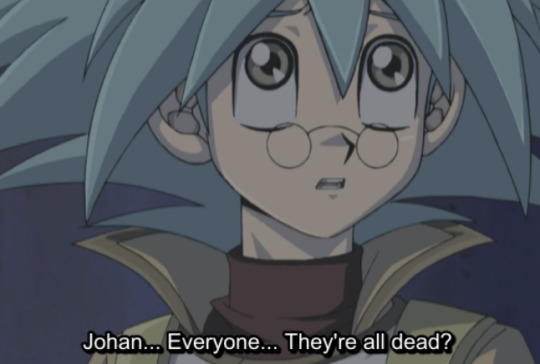
Judai: But at least I avenged them. Sho I'm really glad you're alive.
Sho: Those words... they're just lip service. Bro... bro, you're selfish. Before now, I thought of you as the sun. Someone who gave others energy and made the impossible possible. But, I was wrong. All you care about is getting your way. You don't care who you sacrifice. You'll do anything in the name of your goal. Avenging them won't bring back the people you sacrificed. You're just dueling to satisfy yourself.
Judai: O'brien!
Austin: I thought I told you to wait.
Judai: Are you saying what I did was wrong?
Austin: Think it over for yourself.
Judai: Why? What did I do that was so wrong? I... I did the right thing! And yet... everyone keeps leaving me! What... What is wrong with me?
Supreme King: Yuki Judai. To be willing to be evil to defeat evil. This world exemplfiies survival of the fittest. It must be ruled with power.
Judai: Power? I don't have that much power...
Supreme King: You hold the Super Polymerization card in your hand. Defeat the spirits that stand against you. Breathe their lives into it and complete that card.
After this point Judai decides to sacrifice everything else for power, and to complete the Super Polymerization card he's already sacrificed four friends four.
It's the culmination of an arc where Judai's only been praised for his strength and his ability to win duels. Where he constantly has been called to win duels to solve problems, until that stops working. When everyone is gone, all that's left is his strength. He had to keep winning to keep people safe, but even that wasn't enough, he was still missing something.
He knew he was missing something, that there was something wrong with him and he didn't know where to look.
Conclusion?
He needed power. If he had power, then he wouldn't have lost. If he had power then everything would have turned out alright. He didn't have the strength to carry everyone's burdens for them, that's why he lost, so what he needs is more power. He's been demanded to win, win, and win again so now winning is all that matters.
Now we have our second question: Is Judai's hero complex a good thing?
That's a definite no, because the pressure to always win, to always save everyone and carry their responsibilities has now completely broken Judai. To the point where he now believes that the only thing good about himself is that he's powerful, but he now is willing to sacrifice others to gain more power.
My name is the Supreme King.
Now here's the best part about Judai actively having a villain arc.
He does bad thngs. He does a lot of bad things.
It turns out when you're abandoned and left alone to suffer you do bad things, crazy that, I'm sure Yubel would have a lot to say about that.
Judai is also not being possessed in this scenario. They state it several times. You could say he's Shadow possessed in a Jungian sense. The supreme King is the symbolic embodiment of all of Judai's flaws that he's been ignoring until now. You could say Haou is representative of Judai's subconscious that has been repressed for so long until all those flaws finally surfaced, and that the Judai we see on a day to day basis is his ego, that the relationship between the two is a metaphor for conscious and subconscious.
Jim does a deep dive into Judai's mind, where we're shown a symbolic sequence of what the inside of his head looks like. Judai witnesses his friends appear in mirrors before they shatter one by one, all while he mumbles about how he needs to get stronger.
These are all storytelling devices to show Judai's fractured psyche, but Judai is still in control of his actions. Judai talks and responds to questions when he's addressed. Judai's friends confirm that it's still Judai, he's not a puppet or possessed.
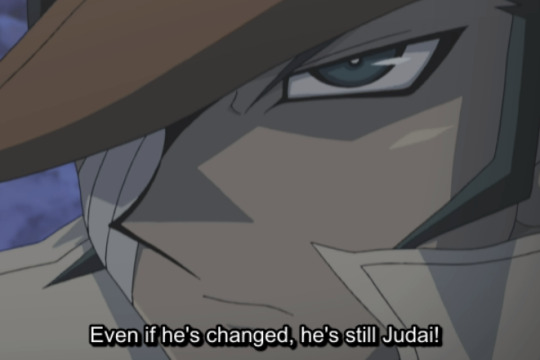
Misawa says later to Judai's face that he and the supreme king are the same person. Judai later is able to use the Supreme King's powers and maintain complete control, because the Supreme King isn't a split personality. Judai even says when Amon is sacrificing someone he loved for power, that he was doing the same thing as the Supreme King, sacrificing everything for power.
We later learn that the ritual that sacrificed four of Judai's friends was a part of Yubel's schemes, but that's the only thing Yubel set up. Judai made every bad irresponsible decision that led to his friends being captured. Judai was the one who snapped and decided to complete Super Polyermization after it was completed. Learning Yubel was behind the sacrifice ritual doesn't take away any agency from Judai at all, because Judai is responsible for his own decisions.
What it does do is create another parallel between them, because we learn the reason Yubel set up the sacrifice was to make Judai walk the same path that they did.
Judai is hurt, abandoned and isolated and in that situation he ends up lashing out at everyone around him in a similiar manner to Yubel. When Judai is put through similiar trauma, he doesn't overcome it in some heroic way because he's an innately good person, no he succumbs and behaves in ways that are incredibly similiar to Yubel.
Even when Judai's friends selflessly try to help Judai, he resists them every step of the way. He ignores their constant calls to him, their comfort, and he even fights them. Judai is eventually reached by the efforts of Jim and Austin combined, but they both die in the effort. Judai is saved because Jim and Austin were way better friends to him than he was to them.
Judai is effectively snapped out of his destructive spiral, but he's left alone with the sobering realization of everything he's done and the blood of two more friends on his hand.
When it's time for our hero to finally face Yubel, he no longer has the moral highground. Now when he faces Yubel it's not as hero and villain, they're just two sides of the same coin. Two people who when they were abandoned, lashed out and hurt everyone around them.
The question is no longer can Judai save Johan. The question now is whether Judai can live with the guilt he's carrying within him, and for that matter can Yubel live with the guilt of what they've done now too?
By this point Judai's been completely deconstructed. He's no longer the hero of the story, he's just a flawed person who needs to fix his flaws. He has the choice to live with his mistakes, and the biggest conflict now is whether he's going to save his villain foil Yubel, or strike them down in order to save the rest of his friends (the three that are left).
This also creates a much more compelling reason for Judai to save Yubel. Not just because Judai is responsible for Yubel's creation, but because they've both made the same mistakes, they have the same traumas and the same scars. Jim and Austin were willing to risk everything to save Judai even when he didn't deserve it, and didn't want it. Now is Judai capable of doing the same thing, of reaching Yubel the way he was reached, not for the sake of saving the world but for helping a friend?
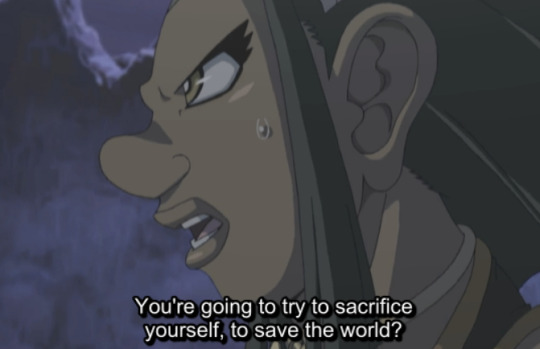
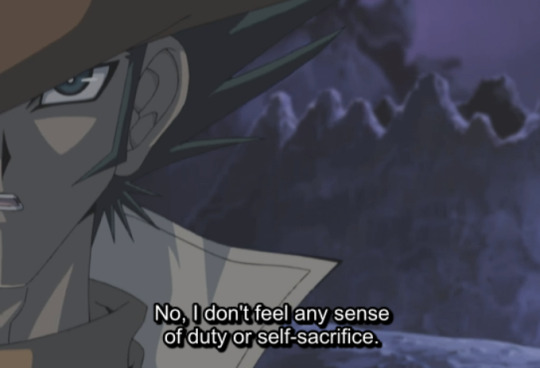
I just want to save my friend. That's all.
This is to me a very compelling setup for the challenge of whether or not Yubel can be saved. Judai's not really saving a helpless victim, he's not acting out of a sense of duty to sacrifice himself for the world, he's being challenged to save someone who suffers from all the same flaws that he does. Judai and Yubel are so similiar at this point it's really just Judai saving himself.
The Dark Deku Arc - Setup
This is the part where I'm actually going to praise MHA. Shocking I know. Season 1 and 2 of Yu-Gi-Oh GX are about 105 episodes in total. The Dark Deku arc begins at about episode 131 with Deku's decision to leave the hospital by himself to hunt down Shigaraki and AFO alone and try to understand villains better.
The 130 episodes up until that point are much better build up, than the first 105 episodes of Yu-Gi-Oh GX. To put it frankly GX is paced like ass. There's far too much filler, and because of that the plot points the anime is trying to make are delivered less efectively. In fact 105 is a good example of what I said above, that ideas are one thing and execution are another.
Season 2 especially is a season filled with good ideas and weak execution due to pacing. Here's one I use as a go-to example. There's a character named Edo Phoenix who's on a quest to find who killed his father. The ending of his plotline is he discovers that in a twist, the man who adopted him is the one who killed his father, and he's been encouraging Edo to investigate because it lets him spy on the police investigation and keep it off his tail.
That's a good twist - however that twist happens in the same episode that Edo's adoptive father is introduced. The audience is given literally no time to even get to know Edo's adoptive father, or get invested in their relationship so the twist doesn't hit at all. A better paced story would show Edo's relationship to his adoptive father early on, get you invested in them, only to pull the rug out from under you so you would feel the shock of that betrayal alongside Edo.
GX establishes its character cast, and yes the filler does give the cast time to breathe and they're all well characterized but because the plot around them is so poorly structured, none of the plot points really hit. Okay, Edo's adoptive dad is evil. Next! You can have good characters, but if you don't put them in a strong narrative framework that challenges them then those characters are just gonna kinda sit there.
The first 105 episodes of Yu Gi Oh GX does succesfully characterize most of the main cast, but it also feels like everyone's just goofing around. In comparison the first 135 episodes of MHA much more successfully builds an escalating conflict. Each new arc either introduces you to a new facet of the world, makes the amin characters more complex, or adds to the conflict.
We basically go from arc 1 "The hero high school is fun" to Arc 2 "The villains are a serious threat" to the Camp Arc "Oh shit, Shigaraki is learning and the villains are getting stronger."
When Bakugo is kidnapped at the end of the camp arc, the tension is ramped way up with the appearance of AFO, and All Might's retirement.
After that point we're introduced to the Overhaul arc, which not only again makes the League of Villains more complex and sympathetic, but also introduces the audience to All Might's more flawed side - the fact that All Might literally worked himself to death saving others and it still didn't work.
Then My Villain Academia -> The Villains are now a threat and they have an army.
Each arc builds on a previous arc, the characters and the world grow more complex, and it feels like you're learning about these complex issues alongside the characters. It just makes Yu Gi Oh Gx look like the silly card games show by comparison, by setting up this very layered world, and conflict, and heroes that challenge the protagonists on what it means to be a hero and what it means to be a victim.
Then all of that great setup.
We are side by side with the proagonist. We, like Deku now want to see if someone like Shigaraki can be saved. We, alongisde Deku want to better understand the villains and learn to see them as people. We want to know if the corrupt hero system can be salvaged.
However, these are too many questions so let's boil it down to two once more, because this is looking at Deku's character.
Deku and Judai are in some ways different as night and day. Deku is an introverted nerd and the victim of bullying, and he starts out with no quirk at all. Judai is a self-confident, charismatic prodigy who instantly seems to charm and befriend everyone around him. Deku desperately wants to be the hero and works his way up there, whereas Judai is just kind of thrown into the school hero because he's the best at dueling.
Judai is kind of a mix of Bakugo and Deku's traits, he's a self confident prodigy who always wins, but he's also someone obsessed with heroes and who has a hero-complex where he's continually forced to save others.
The Dark Deku arc, like the Supreme King Arc looks to take a darker, more introspective look at Deku's character, while also exposing Deku who is a sheltered kid to the a very grey on grey world. It also seeks to deconstruct Deku's suposed "hero complex". Despite the many differences between Deku and Judai I believe the two questions an be boiled down to the same thing.
Is Deku Selfish?
Is Deku's hero complex a bad thing?
These are the questions the series itself is asking in the deconstruction of Deku's character. Deku himself is asking if there's a better way to save villains tha just beating them down or outright killing them, but we'll discuss that later.
Just like Judai there is some setup before this to give a previously very one-note Shonen protagonist mor depth. Deku and Judai are both people who fit the determined, punchy, solve everything fist fight shonen protagonist to a T, on top of being the one to always show up to fight for their friends. Just like in the beginning of season 3, we do have some hints before this that there's something wrong with this attitude. That there's something about Deku that's not entirely there.

There's a flashback of All Might talking with Bakugo where Bakugo discusses that the fact that Deku never takes cares of himself or factors himself into the equation when he always puts others first deeply bothers him and there's "something wrong with it" that's made him always push Deku away.
This flashback also leads into a scene where Bakugo pushes Deku out of the way of one of AFO's attacks, telling him to "stop trying to win this on his own." In an attempt to make Deku see that he's not fighting alone this time.
Deku has also been warned repeatedly about the way his power destroys his own body when he uses it, warnings he's repeatedly chosen to ignore. Saving others isn't just a goal for Deku, you could arguably say it's a method of self-harm and that's what unnerves Bakugo. Bakugo even gave a similiar speech in the past, about how someone like Deku shouldn't take all of the bullying that Bakugo has given him over the years and still try to be his friend afterwards. At this point it's not really like Bakugo's done anything other than tone down the constant insults a little bit, he hasn't apologized or anything but even this early in the manga Deku has a tendency to just let Bakugo's treatment of him go. It's not like they were super best friends forever before the bullying started either despite what the shippers might tell you. Bakugo is saying it's weird that this kid just takes it, and takes it, and takes it without fighting back like he doesn't care about how people treat him and Bakugo is right... that is weird!
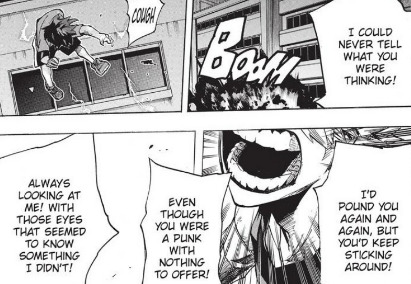
Deku either has such low standards for how he's treated that he just lets Bakugo get away with it, or he just doesn't hold a grudge when he is mistreated because his pain and his suffering just always matters less. Either way it's not healthy, and it could be indicative of a deeper problem hiding behind the surface.
Either way there's setup here, because on one hand you have everyone and their grandma praising Deku for his "drive to save others that eclipses all common understanding."
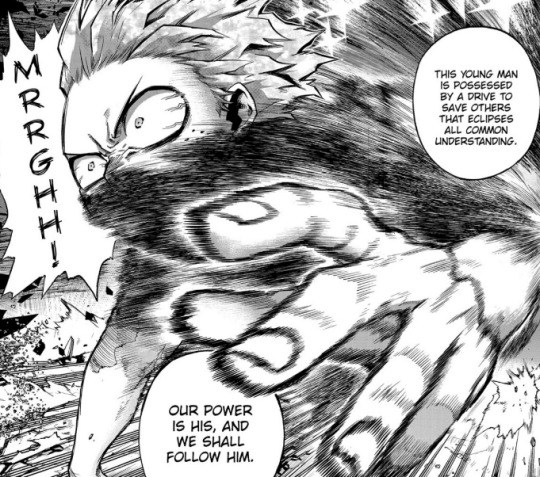
While at the same time he's criticized by Bakugo for having no regard for others. This could be the setup for the character trait that led to his earlier success leading to his downfall later. In Judai's case, everyone praises his purity of heart, but then that purity is later criticized as childishness, naivete and a refusal to grow up.
As for Deku...
How can you protect others if you can't even bother to protect yourself? How can you save others if you can't save yourself? That's the question Touka asked of Kaneki in Tokyo Ghoul when she rightly called out his desire to protect everyone at the Anteiku Cafe as just a roundabout way of getting himself hurt by acting recklessly.
In Kaneki's case he's not trying to protect anybody, he's just picking battles against the doves and getting himself hurt. He's acting out a hero complex in the sense that if he feels like he didn't fight his friends battles for them like Judai then he wouldn't have any friends to begin with. That's why Touka also says "Besides that, everyone doesn't belong to you. You have no business protecting us."
Is Deku fighting for the same reason? Does he harm himself to protect others because he views himself to be worthless and the only way to demonstrate his worth is try and fight to save others?
We don't get an answer for that question. Judai thinks duels are fun, and he's really good at them, and because he's good at dueling he's made friends. He think to keep those friends he has to keep dueling for the sake of others.
Deku's not motivated by the idea of protecting or keeping his friends, that's a secondary motivation. All we have on Deku is that he feels a strong desire to save others, and that he worshipped heroes like All Might growing up but has a naive idea of what a hero is supposed to be. However, his lack of motivation could be the "something that's missing" just like Judai has.
The GX writers did some hardcore digging into Judai's character by focusing on how shallow he was in motivation compared to everyone else, and showing that to be a symptom of his childish naivete.
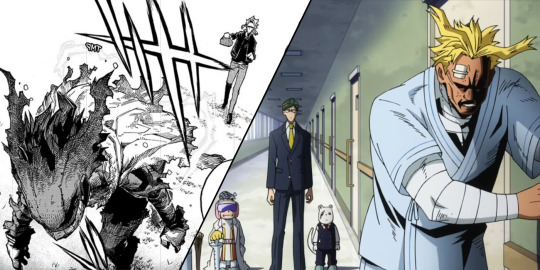
There's also the potential parallel between All Might and Nighteye's breakup, and Deku's decision to leave all his friends behind to hunt for Shigaraki himself.
Even if Deku doesn't have a deeper motivation than just "an unnatural drive to save others" then you could show the effects of Deku walking down the same path that All Might did, the belief that he has to be the one to save everyone singlehandedly and if he rests for a single moment than someone might die, leads to him not only destroying his body, but also doing permanent damage to all of his social relationships.
Even if Deku's motivation isn't too deep, you could still have the traits that led him to earlier success now driving him to ruin as the story punishes Deku for his excessive selfishness.
This is also where we finally get back to Deku's goal of understanding Shigaraki, and contemplating whether or not it's possible to save villains without killing them.
I draw a parallel between this and Judai's enemies calling him out on lacking "darkness of the heart" and that without understanding that darkness he can't win.
Judai's lack of darkness of the heart means two things, he's not mature enough to understand the reason why his enemies are fighting, and he's also not mature enough to se the darkness in his own heart which is why he ends up blind to his own flaws and making pretty severe mistakes later on.
For Deku, it's mainly a lack of understanding of the motivations of the villains he's fighting again, villains he's only ever really beat down with his fists until now.
However, for Deku lacking darkness of the heart you could also re-contextualize that as meaning because of his idealization of heroes he's never once looked at the darker sides of hero society that might have driven people into becoming villains.
Deku's lack of inner darkness may just come from the fact that compared to the villains he's fighting against, he's gotten to live a pampered life. Without understanding that darkness, he can't be a full person because he'll still be a naive sheltered child, and not an adult wise to the way the world works and the moral greys he inhibits. Either way, it's just as necessary for Deku to gain an understanding of "Darkness of the Heart' as it is Judai.

So here's all the setup for the start of Deku's Dark deconstruction arc. As different as these characters and scenarios you can still boil it down to those three narrative questions about Deku / Judai, is there behavior selfish? Are there hero compelexes a good thing? Do they need to understand darkness of the heart?
Before moving on I'm going to summarize Deku's setup as thus:
Deku's actions are selfless.
Deku's motivations are also selfless (a desire to save others).
Deku does not benefit from saving others in any way, if anything he actively harms himself in order to do so.
Bakugo finds this behavior incredibly disturbing.
All Might destroyed his body and burned all bridges because of similiar flaws to Deku.
So the answer to the first question is Deku selflish? No. Is his hero-complex a bad thing? Potentially.
While Deku himself decides that he needs to understand darkness of the heart in order to better understand villains. Deku is actually more set up to contemplate darkness of the heart than Judai is, because Judai charges into the dark world blindly with only the motivation of saving Johan not even caring for Yubel, while Deku has the explicit motivation of trying to understand the little boy inside Shigaraki.
DEKU LEFT THE HERO ACADEMY
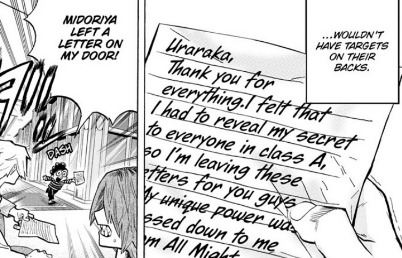
Deku begins the arc by leaving alone to go searching for Shigaraki, with hand-written letters addressed to all of his friends that tell the truth about One for All and also say Goodbye. He makes the deliberate decision to leave them behind so they don't get targeted alongside of him. It's a pretty classical superhero motivation, I need to cut myself out of my loved ones life in order to protect them. Of course this sort of ignores that everyone in his class has super-powers too, but you know heroes they're all such drama queens.
Is this selfish behavior?
This is going to be the only time I'm going to solidly answer yes. Deku clearly did not take his friends feelings into account. His desire to protect them, is more important than their own agency. They also might want to fight alongside him, they'd be upset if they saw him die or get hurt trying to protect them. Deku thinks of his own feelings of wanting to keep them safe and not being able to handle the emotional burden of protecting him, more than he does their own personal feelings.
This is also something that All Might did they permanently burned all of his bridges with his sidekick and friends, and deeply hurt his sidekick who was just asking him to take a break so he did not get himself killed and quit because he didn't want to watch All Might slowly kill himself by inches.
Deku is being selfish here, and later on when he does face his friends he even acts pretty condescending belittling them and insisting they can't fight on their own or keep up with him.
However, I need to ask a secondary question.
Is there any lasting consequences for this selfish behavior?
Besides the fact that it hurt his friends feelings for a little bit, no. I spent a much longer time covering this in Judai's sections because Judai's selfish behavior led to character conflicts. Judai disregarding his friends led to everyone starting to resent him in the Dark World, and their once tight-knit friend group further falling apart.
Judai on three seperate occasions makes impulsive decisions to run ahead without consulting with the group. The second time he outright lies to the group and sneaks ahead without them. THe second time all of his friends are captured when they go after him and try to follow him to give their support because they're worried about him. The third time he makes the decision to run ahead, he knows about the danger they're in and the risk of getting captured and he just blatantly ignores them. When Austin notices they're missing Judai doesn't even go looking for them because they're not a priority at this point - saving Johan is.
This is something that has very real and lasting consequences in the story, they're captured because of his recklessness, and sacrificed in front of his eyes. Even though they technically come back in season 4, the trust between Judai and his friends is all but gone and he's alone for a lot of Season 4.
Judai's decision to abandon his friends has direct and lasting consequences. He is being punished for his hero complex. Running ahead, and fighting alone against the bad guys is what Judai has always done and what's worked before, but now in a more complicated world it's not cutting it and Judai is being challenged for his flaws.
Deku hurts his friends feelings a little bit, but even in that case the focus is on how sad it is for Deku, how hard it must be to be a noble hero fighting alone.

Deku's Mary Jane and Spiderman bullshit never impacts his friends directly, other than the fact that they find it slightly condescending. His "I need to keep secrets from my loved ones attitude" is challenged because his friends want to fight alongside him, but there's never any narrative punishment delivered to him. It's just solved with one fight scene and a character holding out their hands. Whereas, the consequences for Judai's rash actions last two seasons.
I call it "Mary Jane and Spiderman" Bullshit, because Spiderman keeping his identity a secret from all his loved ones is a big conflict in the comics. Something that got Gwen Stacy killed, because Peter Parker never told her his identity in order to protect her, and then that just ended up with Norman Osborne finding out about her anyway and kidnapping and killing her.
You might have heard of the "Death of Gwen Stacy" it's a pretty famous moment in comics. It's also a case where it shows that the Hero's failure to communicate honestly with their loved ones in the name of "Protecting Them" can actually get them killed.
There's even consequences in MHA itself for heroes choosing to sacrifice their personal lives to help complete strangers. Shigaraki literally made a whole speech about it. Kotaro Shimura is traumatized for life over his mother's decision to abandon him instead of giving up on being a hero. Nana Shimura believed she was doing something selfless in sending her child into foster care to keep him out of AFO's clutches, but that was shown to be wrong as AFO just found Kotaro's household and then destroyed him later on in adulthood anyway.
So in the story we are shown scenarios where choosing to abandon your loved ones in the name of "protecting them" can have disastrous and lasting consequences, but as for Deku himself, the decision to leave the school has basically no consequences whatsoever.
Well, Deku making the decision to fight alone is something that might lead to some consequences. After all, Judai's breakdown came about because he always felt the pressure to fight alone and carry everyone's weight on his shoulders until he couldn't.
Perhaps, with Deku fighting alone to protect everyone we'll reach a similiar breaking point. Just as Judai couldn't handle carrying everyone's burdens, looking for Johan, and leading his friends into the Dark World all that the same time and eventually broke down maybe we'll see Deku break down because he just like All Might can't carry the burdens of an entire nation - oh wait nevermind he's working with the Top 3 Heroes.
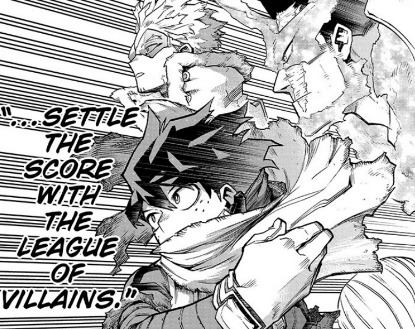
Even the premise that this is Deku leaving the school, to become something like a vigilante wandering the countryside trying to fight AFO on his own is just incorrect because Deku is receiving government assistance right now.
In the Dark World it was really just Judai and his friends, so every single bad decision Judai made had consequences because they were well and truly alone. Deku has backup so he's not even really "alone" in the arc that's supposed to be about him fighting AFO and trying to understand Shigaraki alone.
ALL YOU'LL FIND IS BLOOD AND VIOLENCE
Let's briefly focus on questions two and three, is Deku's hero complex bad, and does Deku need to understand darkness of the heart?
Judai's hero complex was based on the idea that if he wanted to have friends he needed to fight for them and solve their problems for them.
Judai got in such an unhealthy negative feedback loop, that he had to carry his friends burdens in order to maintain his friendships with them, but at the same time he couldn't receive any help from them because he made their friendship all about him carrying their burdens. He was operating underneath an amazing pressure to always win until he lost. The very thing he did to try to maintain his friendships, keeping his friends at arm's length and fighting alone is exactly what ends up driving them away and leaving him alone.
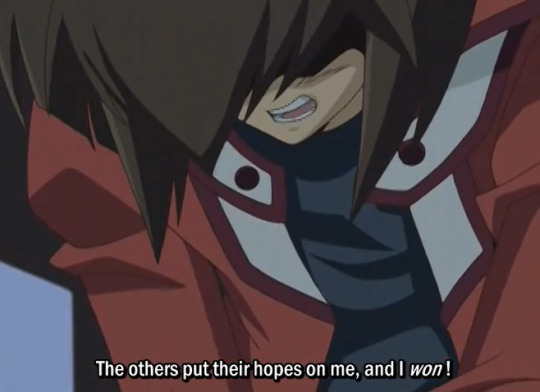
But, still...!
They're all... They're all gone. There really was something missing in me. But what is it? What was missing? What should a duelist burden themselves with?
Judai paradoxically fights alone in order to keep his friend group together, which only ends up with him losing four friends and being abandoned by the rest when they're disappointed for him in his selfish behavior. Judai screams out why, realizing he did something wrong here, that something went wrong because he's been winning duels, he's been fighting the same way he did before only to end up with the worst option possible. The realization that he is truly alone breaks him down entirely.
Judai's hero complex unwravels when simply charging ahead to fight doesn't work for him anymore, because the situation becomes more complicated than that. Darkness of the heart can mean many things. Judai not understanding his own personal flaws. Judai not seeing how his flaws are affecting others. Judai not looking at other people's emotions, he doesn't hear or respond to criticism when his friends start trying to tell him how is selfish decisions making is making them feel.
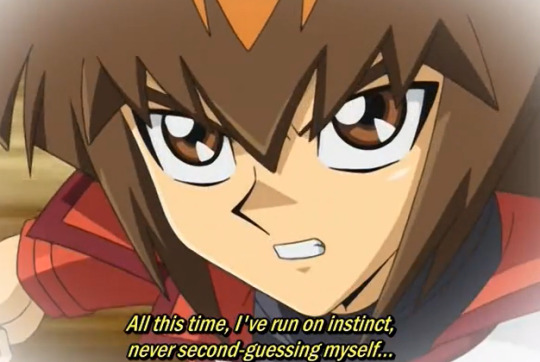
I can't just stay and wait. All this time I've run on instinct, never second-guessing myself. If I just stand still now... I'm sure I won't be able to start running again. And I won't be able to get to Johan.
Judai's hero complex has a clear source - he believes he has to keep running ahead and fighting for his friends the same way he always has in order to keep those friends and if he stops he'll lose everything / succumb to the guilt he now feels about being uanble to save Johan. His Hero Complex also has clear consequences, him running ahead without thinking gets all of his friends kidnapped and used in a sacrifice ritual that could have been avoided if he had made different choices.
Spiderman kills Gwen Stacy because Peter Parker deciding to not tell her about his secret identity to protect her backfired and made her an easy target to the Green Goblin.
Heck, Spiderman's entire character is about how the burden of being Spiderman and his Hero Complex constantly sabotages any attempt he makes at having a personal life. Miguel O'Hara's catchphrase in the incredibly popular Spiderman movie is that "Being Spiderman is a sacrifice" and he's not wrong either.
SO, is the narrative punishing Deku's hero complex in any way?
Well, the one warning he did receive that if he kept fighting he'd lose permanent loss of his arms turns out to not matter anymore because his body is just stronger now.
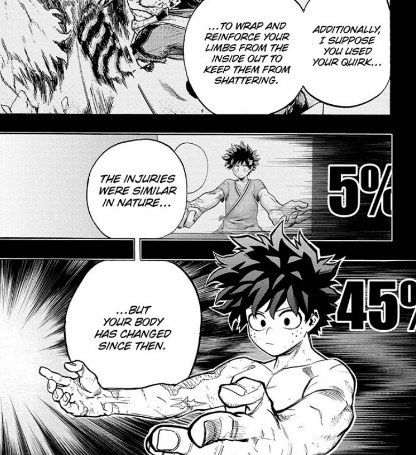
So, even the phyiscal toll of fighting alone that's a consequence for Deku doesn't actually apply here.
I keep talking about consequences but what do I actually mean? Am I talking about strictly punishment? Do bad things need to happen to characters in order to get their lessons?
Not necessarily.
When I say "consequences" I mean in terms of actions always having consequences in a story. The best stories are succinct, that means you basically cut down in as many frivolous details in a story as much as possible so everything that happens onscreen is something that matters and contributes to the whole. Therefore, every action should have a consequence directly seen onscreen in story. Stories are all actions and consequences, the choices the characters make should have direct impact on the plots and the other characters because it makes those choices seem like they matter.
If the story constantly draws attention to the fact that Deku is afraid of ducks, but the story takes place on the moon and there are no ducks living on the moon then that's a wasted plot thread because there are no consequences. If a character does something bad, other characters should discuss it, or it should negatively impact them in some way.
When Judai decides to run ahead without all of his friends for the first time after they all agreed on a plan, the result is the next episode they all start talking about their shared doubts with Judai when he's not around. If they all just swept Judai abandoning them under the rug, then Judai running ahead and leaving the others alone doesn't feel like an impactful character flaw.
There's no lasting consequence for Deku's hero complex. It doesn't drive him to any kind of breaking point like it does Judai.
I think the reason why is because there's no real moment of failure for Deku. When he tries to ask Muscular why he fights, and Muscular rejects him and says that he was just born evil and has no deeper motivations, Deku's not frustrated at all.
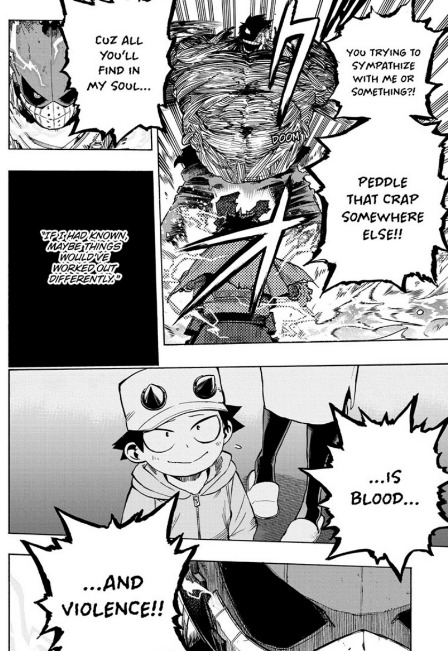
Deku who feels a "unnatural desire to save others" isn't really bothered by the fact that Muscular insists that he can't be saved and that they can only fight. Despite this technically being a failure, Deku has failed to talk a villain down, failed to find a way other than fighting and also failed to understand the darkness in someone's heart it's of little consequence because it's not framed as a failure.
Deku just punches Muscular, back to the drawing board.
There's another manga called Choujin X running right now, where the main character is on a similiar quest trying to see if there's a way they can save the big bad Sora Shihouhin, and when he is forced to fight against a villain who won't back down, de-escalate, or listen to reason he has a complete emotional breakdown.
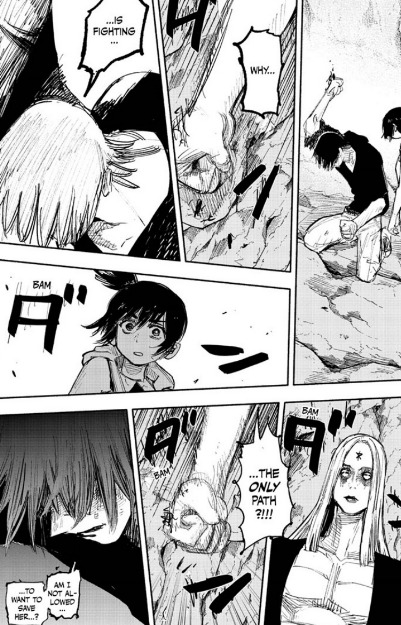
This is the reaction of someone who's genuinly invested in the idea of saving the villain, and frustrated with the reality that he might not be able to save her, that he can't talk to the villains or convince them to back down. Tokio's not even characterized by an unnatural desire to save others like Deku is, so why is he the one breaking down and not Deku someone apparently so selfless that he wants to save the mass murderer that's trying to destroy society?
If Deku's desire to save others is so strong why doesn't he show frustration at being unable to talk down, or understand Muscular?
Judai is stuck in a negative feedback loop where he's forced to fight for others, because he believes he has no worth to his friends otherwise. All we're told of why Deku feels the need to save everyone around him is that he's just like that, he just feels like saving everyone no matter who they are the moment they come into view.
If we're choosing to characterize Deku that way, then number one he should be attempting to save everyone, and number two the stress of having to save everyone is something that should get to him. His "Hero Complex" should be what's breaking him down at the moment. The unnatural desire to save everyone around him that led him to so much success should be what's punishing him this arc.
Judai felt pressure from two aspects, first the pressure to carry everyone's burdens, and second the lack of understanding of darkness of the heart. Unlike Judai who doesn't want to understand darkness and who avoids it as long as possible, Deku goes into this arc actively seeking to understand how his villains think.
Deku and Judai also suffer from a lack of darkess in their own hearts. This leads to them having empty motivations. Judai has a childish desire to enjoy fun duels. Deku has a childish desire to save everyone. Neither of them have tried to grow or change or even question those motivations in any way and because of that they're stunted people.
Judai doesn't know why he fights. He doesn't question why he fights. He just takes on the burdens of others to give him something to fight for. This all together leaves Judai blind to his own personal darkness, and also because of that blindness he can't grow in any way because he never evaluates himself, he never looks at himself and tries to change.
When he's on his knees and at his breaking point he screams at the top of his lungs, "WHY? WHAT AM I MISSING? WHAT DID I DO WRONG?" simply because Judai's never thought about these things.

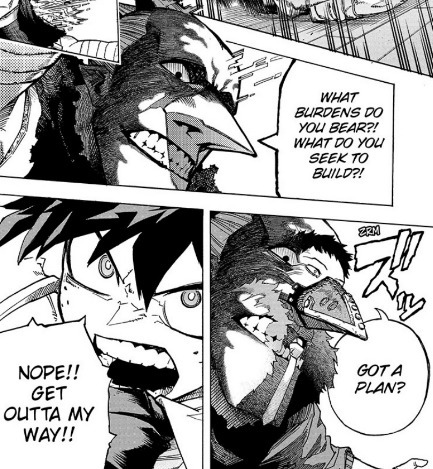
Deku's asked these same questions both in the Dark Deku arc, and hundreds of chapters later he's asked what he's planning on doing as a hero in order to make things better and Deku never materializes an answer.
Pre-Dark Deku Arc, during Dark-Deku Arc and Post Dark Deku arc, Deku always solves his problems by recklessly jumping in and saving others. There's never any point where he's punished or criticized for this behavior in any significant lasting way. He never has to self reflect and develop a reason on why he wants to save others, or eve think about how he's going to save others, he can just keep acting as the rash, impulsive hero.
Judai and Deku are both characters who are empty, and lacking in motivation but Judai is ruthlessly criticized for that until he reaches his breaking point and is forced to look at his motives.
This once again comes from a lack of failure on Deku's part. Deku never fails the way that Judai does. There's a scene where you could have easily had Deku fail. The entire Nagant vs. Deku fight where Deku fails to give her any substantive answers to his questions.

Imagine if Deku's simple philosophy of always extending a helping hand failed here. Imagine if Deku actually got deeply ivnested in the idea of saving Lady Nagant, and did his beset to talk and reach out to her but his answers weren't enough and because of that she just chooses something like suicide. Imagine he has her by the hand, and she's dangling off of the roof and he thinks that his impressive move to save her should have been enough - he's reached out a hand like always. He thinks this should have won her heart over, by showing her that someone still cares in all of her despair.
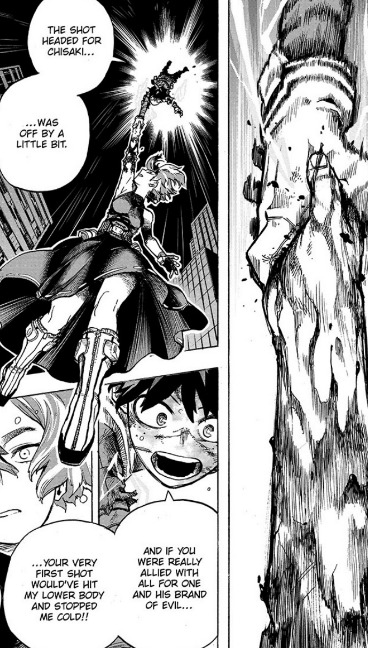
Then, Nagant in one final spiteful move lets go. The person he heard her entire backstory, the person maybe he once was a huge fan of her when she wasa hero, the person he wants to save the same way he wants to save Shigaraki chooses to let go and fall to her death because dying would be better than living in whatever kind of corrupt world that Deku is trying to build.
This could be Deku's Gwen Stacy moment. Spiderman carelessly webs Gwen Stacy whe she's falling to catch her and for a moment he thinks he's saved her because he's overconfident and has caught people falling like this a thousand times, only to find out he's snapped her spine. His overconfidence, his hero complex making him believe everything magically would work out led Gwen Stacy to her death. This could show the simple act of just offering a hand out to someone in need isn't enough, without empathy and understanding.
Instead, AFO just blows Nagant up in Deku's face.
Except, that isn't even a failure bcause Nagant turns out to be just fine! There's no point in blowing up Nagant except for the spectacle of it, because she turns out to be fine five minutes later and even shows up to fight in the next arc.
There's no consequencs to anything that happens in this scene. Deku doesn't suffer any consequences for being blind to the faults of society. (He's working right alongisde a killer cop just like Nagant and he doesn't even care.) Deku isn't forced to reflect on what saving people or making society better would even mean. He also isn't punished for his lack of understanding the way that Judai is.
Afterwards, Deku denies help to a very mentally-ill Overhaul, who is apparently not one of the villains that Deku wanted to save. There's a whole buch of asterisks on that "Deku wants to save everyone***" goal. This also isn't framed or used to paint Deku in a bad light because Overhaul is unworthy of salvation in Deku's eyes for hurting Eri.
Is this action part of an arc? Is Deku reaching his limit with trying to sympathize with villains only to see people like Overhaul and Muscular fighting him every step of the way and telling him they don't want to change?
Nope, this scene is never brought up again.
Deku never fails, and he never does anything wrong. Even when there are situations where you could argue he does do soemthing wrong, like denying the armless, mentally ill Overhaul help - he's not painted as being in the wrong.
The entire arc is supposed to be about criticizing the protagonist for their hero complex, and their lack of understanding of the darkness of the world but for Deku there's no criticism to be had here.
Compare this to the sacrifice ritual in the Supreme King Arc, where not only does Judai fail to save his friends, but the friends that survive ruthlessly tear into him aftewards for his selfish behavior. THe actions of one protagonist matter, have consequences in the story and are criticized. The actions of another protagonist have no real consequences and are never criticized.
The whole mansion blows up and... nothing happens. No one's injured in the explosion. It may as well have not happened in the story because there are no consequences for Deku just continually choosing to blindly run ahead like his hero complex tells him to.
There's evena moment where Deku winds up in a similiar situation to the dark ritual. After receiving information from Nagant, he blindly wanders into a mansion in Haibori woods believing it to be AFO's base, only to find out it was a trap and AFO was waiting for him to blindly charge in all along.
THAT'S WHAT MAKES US HEROES AND VILLAINS
This is where I'm going to talk about another big similarity between Deku and Judai, and also the biggest point of divergence in the Dark Deku and Supreme King Haou arcs.
Deku and Judai are both character foils with Shigaraki and Yubel respectively. This is where I'm going to praise MHA again, surprising everyone.
The foiling between Shigaraki and Deku is masterful. They both started out in relatively the same place, as boys with dreams to become heroes who were softly told no by their parents. Tragedy struck Shigaraki and he killed his family on accident and wound up alone wandering the street for days until he was found by AFO.
They're both the students of the greatest hero and villain of the last generation. They both end up being surrounded by a group of close Nakama that they want to protect. They're both continually challenged to grow up, and show how they're going to be better than their predecessor for the hero and villain sides respectively. They both have to prove they are worthy successors. Shigaraki has all the heroic spunk and determination that Deku has but on the villain's side, and while Deku loves heroes, Shigaraki is hero society's critic wants to bring down the hero system that didn't save him.
You get the feeling that Shigaraki really is Deku just in a different situation, a same person on the opposite sides of the conflict kind of character foiling.
As the biggest Yubel stan here, in some ways the foiling for Shigaraki works better than the foiling for Yubel because Shigaraki isn't just Deku's foil, he's the foil for all of society. Yu-Gi-Oh Gx takes place in a society run where everything centers around card games, it's not really that deep. In My Hero Academia you have that 100 episodes of great setup where Deku is not only learning to look at the darkness within himself, but also the darkness within hero society around him.
Judai's narrative as much as I love it, is entirety about Judai.
Not only could Dark Deku arc develop Deku's character, it could also say something deeper about the world it's taking place it, because Deku has all these connections to Shigaraki, who also kind of represents the orphaned boy failed on all levels by the society around him.
Shigaraki is the shadow of -> Deku, but also Shigaraki is the shadow of -> all of society.
Yubel is the shadow of -> Judai, and only relates to Judai's personal growth.
Yubel is Judai's personal villain, and was created by his actions as a child. His decision to abandon Yubel into space, led to Yubel being tortured and their later madness.
Yubel is also Judai's shadow. They carry all the same flaws, but those flaws are obvious in Yubel and repressed in Judai. Yubel's belief is that Judai is someone who purposefully enjoys hurting their friends, and that's how he shows his love. While that's twisted it's not hard to see how Yubel came to that conclusion. After all, Yubel loved Judai so much only for Judai to abandon them and turn a blind eye to their suffering. In the Dark World, Judai abandons his other friends continually in order to search for Johan, and they wind up suffering too.
While Judai doesn't sadistically enjoy hurting others as Yubel put it, there's an element of truth to Yubel's criticism. Judai does abandon people, Judai isn't as empathic as he seems to be. When Judai is subjected to the same kind of isolation and abandonment that Yubel has endured for the past ten years, Judai loses his mind a whole lot quicker and starts lashing out at everything around him the same way Yubel has. Judai without the love of his friends starts to hurt everyone around him in his lashing out, the same way that Yubel desperate for love starts to inflict pain on the people she loves. Even before the ritual happened, Judai was unwittingly hurting his friends with his own selfish behavior.
Yubel's stated criticism is "of Judai is "Anguish and sorrow born from loneliness. That is the nature of love as you taught it to me" and further beyond that "When you forgot about me, I suffered. It's hot. It hurts. I am in pain. Why? You know how much I love you? Why did you do this to me, Judai? In that moment I realized that was how you showed love. Because you loved me, you hurt me and made me suffer."
That sounds crazy, but hasn't Judai been hurting the people he loved for his own selfish reasons this entire arc? Is it that crazy then to conclude that neglect and abandonment must be how Judai treats everyone he loves, so surely he loves me.
One of the biggest criticisms of this arc is how Judai's behaviors impact his relationships, so of course his most personal villain and foil is his jilted ex nonbinary dragon lover. On a less joking note, when Yubel was displaying troubling behavior as a child, Judai's first response was to abandon them. Which is ironic for someone like Judai so paralyzingly afraid of being abandoned that he became everyone's workhorse and worked himself to death solving their problems for them. Who when abandoned by those friends finally, snaps just as hard as Yubel did when they were abandoned.
Do you see the parallel I'm drawing here? Judai is slotted into the spot of the protagonist who's friends with everyone he meets, who loves and fights for his Nakama. Yet under closer scrutiny he's shown that he doesn't really understand what love or friendship is or how to give and receive love from others in a healthy way. His antagonist is his former childhood best friend, who is obsessed with love and demands that Judai love them back. Judai's lack of understanding of relationships and love takes a dark twist with Yubel, their shadow, foil and antagonist.
These are once again very personal challenges to Judai, society doesn't really factor into this equation. Though, Judai is somewhat challenged as a hero because there's an irony to Judai plunging into the world to save his best friend Johan who he's known for like three weeks, but not really lifting a finger to save the antagonist of the arc Yubel who he's known since childhood and is personal responsible for putting through torture.
That hypocrisy there too, is a personal challenge to Judai that paints him in a less heroic light. He wants to save Johan and ignore Yubel because it's easier, because saving Johan relieves him of his guilt. He doesn't even know what to do about Yubel, so he doesn't try and falls back on his previously established behavior of playing the hero.
The hero is really just a mask for Judai at this point, something the story has ripped right off of his face by the time it comes to face Yubel.
There are two ways in which Yubel serves as an ultimate foil to Judai.
Yubel acts like a callout post to all of Judai's flaws
Yubel represents a dark path Judai could have taken.
This second one is what Shigaraki and Deku have in Common with Judai + Yubel. There's something deeply tragic about the idea that while Deku was making friends, getting taught by a loving teacher like All Might, Shigaraki was all alone being pushed by a ruthless manipulator like AFO into becoming the worst villain.
Judai and Yubel's lives follow the same tragic parallel path. They began in the same place as childhood friends, but after abandoning Yubel, Judai spent the next ten years growing up, making friends in a healthy and safe envirnoment while Yubel the one who was abandoned was alone in space desperately crying for Judai to come save them only to be ignored because Judai has long forgotten them.
However, there's a striking difference there too. Yubel is created directly by Judai's neglect and actions. Whereas Shigaraki is created by the neglect of all of society, it's not Deku's fault directly.
#1 Shigaraki acting as a callout post to Deku's Flaws
However, this is where Shigaraki's callout post comes in. Shigaraki gives a long speech on how the existence of heroes itself, creates villains like him.
"You heroes pretend to be society's guardians. For generations you pretended not to see those you couldn't protect and swept their pain under the rug. It's tainted everything you've built. That means your system's all rotten from the inside with maggots crawling out. It builds up little by little, over time, you've got the common trash all too dependent on being protected. And the brave guardians who created the trash that need coddling. It's a corrupt, vicious, cycle. Everything I've witnessed. This whole system you've built has always rejected me. Now I'm ready to reject it. That's why I destroy. That's why I take power for myself. Simple enough, yeah? You don't understand because you can't understand, that's what makes us heroes and villains."
To break it down simply, heroes look away from the faults in their society, they intentionally ignore the people they cannot save, and when those people turn into villains the heroes beat them down hard. The villain attacks then convince the common people of the need for heroes, and the cycle perpetuates itself. This is all powered by the people's blind, uncritical faith in heroes.
Deku is a person who has that same blind, uncritical faith in hereoes, and until this point has never thought of Shigaraki as anything more than a villain to be punched until he stops. Which is why this is still a callout post that applies to Deku, because Deku's blind admiration for the Hero System is part of the problem that enables the very flawed hero system.
Deku does not understand darkness of the heart, therefore Deku does not understand that heroes could possibly be bad, and he could possibly be supporting a bad system until he's slapped in the face with it.
However, is there a lasting consequence for Deku's blind support of the hero system?
Nope.
I just described up above what could have been a consequence, if Lady Nagant refused to have faith in Deku since he didn't back his words up with action.
Deku also clearly does not want to break away from the corrupt hero system that created Shigaraki, because the heroes that he brought along to fight with him are Endeavor, Hawks and Jeanist, a child abuser, a state sponsored murderer, and a guy who makes bad puns. He doesn't change any of his bahavior that enables the corrupt system to stay in power.
Not teaming up with the Top 3 heroes, and deciding to go full vigilante would have at least have been breaking away from that system.
This circles around to a big underlying problem in this whole arc in that Deku isn't really doing anything different from what he was doing before, and he's not punished for his character stagnancy either.
So we're left with.
#2 Shigaraki represents a dark path that Deku could have Taken
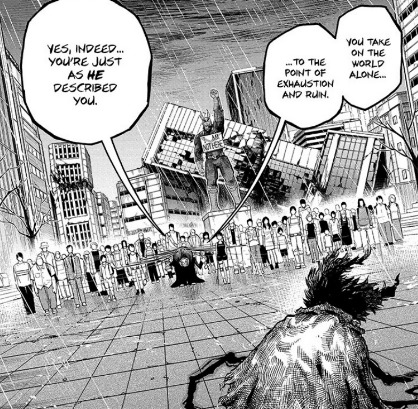
This is where Judai / Yubel succeeds and Shigaraki / Deku falls flat on its face.
When pushed to his absolute limit after failing repeatedly, Judai snaps. With no friends left he decides that all that matters is power. This path seems natural for him because we've already seen what being abandoned and left alone can do to a person and how it twisted Yubel. The story hints again and again at Judai's blood knight tendencies, and that he thinks the only thing he has of value to offer others is strength by fighting for them.
He loses his friends and the fighting is all he has left.
At the point of despair he decides to just embrace power. If he cares about nothing more than strength, at least that will give him some sense of control over his life after the out of control tragedy that happened to him.
"Yuki Judai. In order to defeat evil, one must become evil. In a world with the law of the jungle at work, one must rule with power."
"Power? I don't have that kind of power."
"In your hand lies the super polymerization card. Defeat any spirits who may oppose you, and combine their lives into it to perfect the card."
Supreme King is just a villain persona that Judai adopts to as a protetive blanket for all the hurt and pain they've gone through, just like ding, ding, ding, the villain persona Shigaraki Tomura is for Shimura Tenko.
Judai snapping under such intense pressure shows us that if even the faultless hero can snap, then how much can we blame the villain for snapping under similar circumstances? Maybe the reason both the hero and the villain fell is because they're both equally human and to fall down is human.
Deku never falls down as hard as Judai does. He doesn't even fall down and scrape his knee. There's no instance where he fails to save anyone. There's no instance where his actions hurt anyone. There's no instance where he takes things too far and hurts a villain. I kow it's unlikely for Deku to turn into a villain, but he could have at least gotten so frustrated he turned into a punisher style vigilante! Is that too much to ask?
There's not even a single moment where Deku goes too hard in a fight and injures or even kills a villain. They could have pulled an "I thought you were stronger" moment like in Invincible.
I don't know why this is called the Dark Deku arc because there's no darkness in Deku's heart for him to exploit, nor is he actually called to better his understanding of the darkness in others hearts. Judai understands Yubel's darkness because by the end of his personal arc he's been there, he's not the hero he's the atoner. He can either punish Yubel, or hold a hand out to help Yubel atone.
Deku's arc might as well be called the "My Little Pony Friendship is Magic Arc" because he never does or confronts anything dark. His worst crime is not showering. All that isolation and his repeatd failures in hunting AFO down should have worn Deku down, but it didn't because he's just that special of a boy!
Deku's hero complex also is completely uncriticized from beginning to finish. Judai's hero complex is an unhealthy behavior that utterly destroys him. Deku's hero complex is a job interview flaw.
FRIENDSHIP IS MAGIC
Just to hammer my point in I'd like to compare these two scenes. One is in the middle of the Supreme King Arc, the sacrifice ritual scene where all of Judai's friends are blaming him for the fact that they're about to be sacrificed while he's still trying to save them.
The second is the climax of the Dark Deku arc, where all of Deku's friends are showing up to fight him and convincing him to accept their help.
Just look at how vastly different these two shows treat their shonen protagonists when it comes to his flaws.
For the ritual sacrifice scene. This is immediately after Manjoume wakes up to find that he has been chained and kidnapped with Judai standing right there.
Judai: Sit tight! I'll save you soon!
Manjoume: Wait, is he dueling? JUdai you damned idiot! Weren't you going to save Johan with us!? Getting yourself all flared up. You didn't even stop to think about us at all, did you?
Judai: That's not it.
Manjoume: That's just how you are! You were the only one in your kingdom from the get-go. We were the idiots for getting all motivated with you and feeling some sense of friendship with you being like that!
Then Judai watches helplessly as Manjoume dies. His other friends don't fare much better.
Kenzan: Big Bro? Why'd you want to save Freed's comrades when it meant sacrificing us-don!?
Judai: You're wrong. That's not it.
Fubuki: It's painful. This pain isn't just physical. It's the pain of a friends' betrayal that I have tearing my soul. apart.
Asuka: I'm being betrayed and sent away by you. To think that I'll have to bear a sadness like this.
All of Judai's friends die spitting on him and telling him what a terrible friend he is and that this is all his fault. Which it is, because his decision to abandon them got them captured and led up to the sacrifice ritual.
Now, what scathing criticisms do our heroes have to give Deku after he left them all behind to fight Shigaraki alone?
Denki: Midoriya! We get that all for one is really importnat but you got something even more important in your life! Me and you we aint'g otta ton in common, but you're still a friend! Even if we gotta force this friendship down your throat.
TodorokI: What a look you have on your face. Is this resposnibility so much that you can't let yourself cry? Seems like a burden you should share with the rest of us.
Uraraka: The thing is Deku, we don't want to be protected by you and reject who you are and what you're doing, we just want to be with you (this part is narration).
Deku is told that none of his friends are mad, they want to be by his side no matter what, and that it's okay for him to cry.
I should also mention how underdeveloped this supposed nakama group is in the manga itself. The entirety of Season 3 of GX is tha the bond between Judai and his friends are more shallow then it appears, but he's also spent two whole seasons bonding with a group that consists of: Asuka, Sho, Kenzan, Fubuki, Manjoume. That's six people total including Judai who serve as is primary friend group. Their friendship is more unhealthy than it appears, but Judai has spent the past two seasons hanging out with one small friendgroup.
Meanwhile the entirety of Class 1-A shows up to tell Deku how much they love him and how much he means to them, and Deku's hung out with maybe like... four of them?
You have one bond shown to be how shallow it is, and one shallow bond treated like it's the deepest, most loving friend group in all of fiction. Deku doesn't even receive some lgiht criticism for how inftantalizing it was for him to abandon them for their own protection, because no one resents Deku or is capable of holding any negative or critical emotions towards him whatsoever. He's just told how much everyone loves him and wants him to come home.
And yes, Judai also does get two characters sacrificing themselves to try to reach him when he's the Supreme King.
However, as I stated above Jim sacrifices himself to help Judai because that's who JIm is as a person. Austin does it after Jim fails, both to honor his friendship with Jim, and also because of someone who got scared and ran he feels like he has to confront the darkness of the heart.
Jim and Austin O'brien's sacrifice is also a sacrifice. They died trying to save Judai, and Judai has to wake up with the knowledge that not only did he kill a bunch of people in his quest for power, he killed two more friends who were only trying to help him.
At the end of the arc, Judai has woken up with the knowledge that he has done bad things that can't be taken back and he's barely better than Yubel at this point.
At the end of the Dark Deku arc, Deku gets a speech from Uraraka about how amazing and selfless he is, and how he never gives up and how he always pushes forward, and how everyone at the UA shelter should appreciate him more.
The Supreme King arc exists to criticize Judai. The Dark Deku arc does nothing but flatter Deku from beginning to end.
Judai's hero mask is ripped off and he's forced to be a person. Deku's hero mask stays on, his hero complex is unchallenged, and he's praised for being teh greatest hero evarz.
I often get accused of not liking MHA simply because I expect it to be a different story than what it is. That I want it to be darker, when it's a more optimistic shonen manga.
However, here's my secret. I hate edgy superheroes. I don't like watching stuff like The Boys because it gets too dark for me. The oly reason I read invincible is because my friend told me that Omni-Man got a redemption arc. My favorite DC Superhero is Superman. My favorite Superhero of ALL TIME is Spiderman.
The thing about Spiderman though, is that it is hard to be Spiderman. The entire point of Peter Parker's character is that he has a terrible work/life balance and constantly loses people around him because being Spiderman is a sacrifice. The story doesn't bend over backwards to praise Spiderman as being a selfless hero, in fact it points out what a loser he is constantly. Peter Parker's friends are always frustrated with him and he's a wreck of a person.
Yet, the fact that being Spiderman is such a sacrifice and he keeps choosing to make it, shows what kind of person Peter Parker is, and that's just a person who does whatever he can to help out.
Even Peter Parker, the nicest, most well-intentioned boy ever has the Symbiote arc. One of the most famous arcs in comics dealing with Peter is when he lets Venom graft onto his suit, and even though the symbiote makes him violent, and makes his behavior change he spends the longest time not wanting to peel it off because the power boost the symbiote suit gave him made his life that much easier.
Dark Deku is an obvious reference to the Venom Suit, but a completely shallow reference because Dark Deku acts exactly the same as regular Deku the only reason he looks like that is he forgot to take a shower.
Superhero stories don't need to be Dark Deconstrutions, but they do need to be SOMETHING. They need to say something about the character. The problem with the Dark Deku arc isn't that Deku didn't experience a villain arc.
It's that nothing of consequence happened in the entire arc. Nothing changed. The story asked us if Deku's hero complex was a bad thing, and then it didn't deliver any answer. The story asked us if Deku needs to understand darkness better and then didn't answer that.
These are ideas that the audience promised were going to get answered. We were told Deku was going to get his development this arc that he was going to be pushed to the edge. The entire premise of this arc was that it was supposed to better help Deku understand Shigaraki and Hero Society only for Deku to not learn about either of those things.
Deku's learned nothing. We've learned nothing. Nothing has changed in the story itself. The only thing we've accomplished was wasting a lot of time that we could have been using watching Yu-Gi-Oh GX!
#mha meta#ygo gx meta#yu gi oh gx#yuki judai#judai yuki#supreme king haou#supreme king jaden#supreme king judai#yu gi oh gx meta#dark deku#ygo#ygx meta
131 notes
·
View notes
Text
Reporter finds out that their city's hero is corrupt, and they make it their goal to expose them to the public. Somehow they fall in love. (Can go plucky reporter who openly confronts Hero, or cautious reporter who knows a corrupt hero is dangerous, so they get close under false pretenses to find evidence.)
Prompt courtesy of @thepenultimateword
"Wait. No. What is...?" The reporter's throat had gone dry as sand. They slapped the composition book shut, thrust it back into the gold paper wrappings. But it was too late. Afterimages of dates and names and dizzyingly high sums danced before their eyes - all in the hero's own neat handwriting.
"It's the proof you wanted, darling," the hero said, a dreamy smile on their lips as they gazed at the reporter through the candlesticks. "All the money I've been extorting from our city's villains in exchange for turning a blind eye to their wrongdoing. Happy one year anniversary."
The reporter stared from the hero's face back down to the gift, so beautifully wrapped. They had gotten the hero designer sunglasses. "You knew," they said. It was meant to be a question but... no. This was not a surprise. Somewhere over the past year, this had become an inevitability. "You knew I was..."
"Investigating me? Seducing me?" The hero chuckled and rose. The reporter managed to quash their flinch as the hero picked up the reporter's empty plate, then their own. "Darling, I spend my life foiling schemes. Yes, of course I knew."
The reporter sat, flooded in an adrenaline rush so strong they wondered if they were having a heart attack. The door to the hero's penthouse apartment was forty feet behind their back. Their fingers itched to grab that notebook and run - but some survival instinct kept them frozen to their chair as the hero prowled the dishes off to the kitchen.
"So," the reporter said evenly. "You've just been... toying with me, this whole time?"
"Toying with you," the hero purred, returning to cock a hip against the table and give the reporter that half-feral smile they had only ever seen behind closed doors. God help them, the reporter felt themselves blush. "Yes. That's a good word. You decided you'd try to seduce your way into my confidence, to uncover my secrets. So..." The hero traced a finger along the reporter's temple, teasing a lock of hair out to run between their fingers. "...I set out to seduce you back. And you win."
The reporter blinked. "What."
"You win." The hero gave a fond little tug to their hair and then let go. "I've fallen in love with you. So."
"You cant love me! I'm here to expose you!" The reporter scrambled backwards, clutching the notebook to their chest as if the hero hadn't just handed it to them, literally gift wrapped. "You've been blackmailing villains!"
The hero shrugged without a blush of shame. "Only those who would have bought their way out of the justice system anyway. Why shouldn't I cut out the middleman and use their money for crime-fighting?"
"Crime-fighting? You're lining your pockets!" The reporter waved a hand wildly at their luxury surroundings as they backed away. "The food, the clothes, the whole lifestyle!"
"And I'm the last hero of my generation still standing," the hero said, calm and steady as they paced forward. "You think that's a coincidence? Or you think it's because you and I both know sometimes doing the right thing means bending a few rules along the way?"
The reporter stopped dead again. "What are you talking about?"
The hero's hand closed on the reporter's wrist and - yanked was too harsh a word. It was a pull and a spin, like the sun dragging a meteorite into its gravity well and suddenly the reporter was wrapped up in the hero's arms. In their lover's arms, their back pressed to the hero's chest.
"This," the hero hummed into the protagonist's ear, swaying them both to the soft music trickling from the hidden sound system. "A year of lies and blurred lines and compromises to get your story. Hardly the stuff of journalistic ethics seminars. What would your friends and colleagues say?"
"So it's blackmail," the reporter whispered.
"If that's what you want. We could destroy each other. Or..." The hero's mouth pressed to the sensitive spot on the reporter's neck. They almost melted. "Or we could see what happens next, with all our cards on the table."
"You can't be serious." The reporter jerked away. The hero let them go. "You want to keep dating?"
"Of course. You're gorgeous, clever, a little reckless, and you have that flexible morality thing. It's like you were made for me. Like we were made for each other." The hero gave them a once-over so blatant the reporter blushed again. But they didn't move to corner the reporter. "Go home, think about it. Take the notebook."
"You won't chase me?" the reporter said before they could stop themselves.
The hero's grin widened. "How about I give you a head start?"
The reporter fled to the sound of the hero's laughter rattling in their chest.
#my fiction#hero x villain#reporter x hero#evil hero#filled prompt#thepenultimateword#reporter x villain#100#300#500
556 notes
·
View notes